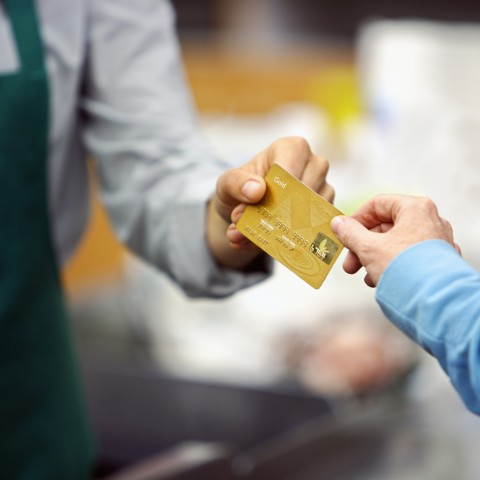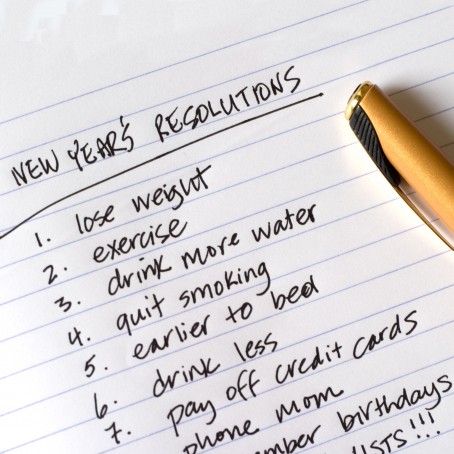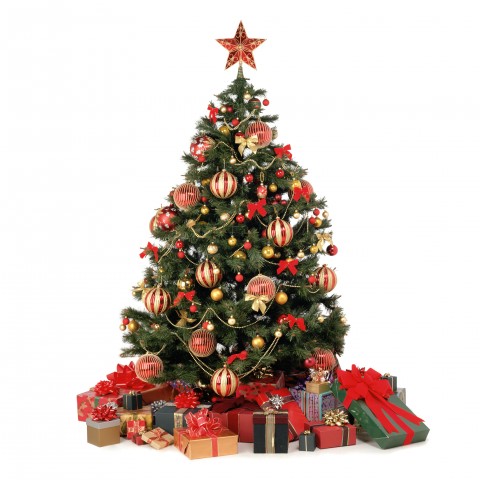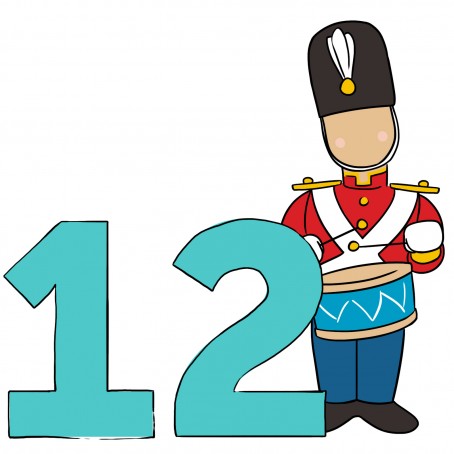
In many languages, หลักภาษา (lhàk-phaa-sǎa), or “grammar,” is one of the most difficult aspects to learn. Fortunately for you, Thai grammar is notorious for its relatively simple rules and structures when compared to other languages.
Still, if you’re thinking about learning Thai or have recently started, you may have several questions concerning Thai grammar: Are there a lot of Thai grammar rules? Should I learn the Thai alphabet and grammar together, or would it be too hard? On this page, you’ll get answers to all of your Thai grammar questions.
- → Keep in mind that if you want to explore this topic further, ThaiPod101.com has more resources for you: Introduction to Thai Grammar and Painless Thai Grammar. Check them out!
 Table of Contents
Table of Contents
- Thai Grammar vs. English Grammar – The Basics
- Parts of Speech
- Unique Thai Grammar Concepts
- Conclusion
1. Thai Grammar vs. English Grammar – The Basics
As you know, the grammar of any language is supported by several grammar rules that must be followed. To make matters worse, the vast majority of these rules have a number of exceptions that can only be learned through memorization. When combined, these two factors tend to make people nervous about studying another language’s grammar.
However, as we mentioned a moment ago, you’re not going to have very many issues with this when studying Thai grammar. As a matter of fact, there are very few fixed rules in Thai grammar. Not only that, but the few rules that do exist are very easy to understand.
Since you’re reading this page, you’re most likely a native English speaker or someone who has been studying English a long time. In order to help you fully appreciate how easy it can be to master Thai grammar, we’ll be using English as a benchmark.
Now, let’s look at two crucial grammar elements you should understand before continuing: Thai sentence structure and verb conjugation.
- → Wondering how to learn Thai grammar effectively? See our video lesson on the 4 Ways to Improve Your Grammar!
1 – Sentence Structure
Like English, Thai expresses complete ideas (sentences) through the use of subjects, verbs, and objects.
Both languages use the SVO (Subject + Verb + Object) structure for basic sentences:
- I (S) drink (V) coffee (O).
However, Thai people sometimes use OVS (Object + Verb + Subject), which is the passive form, when they want to focus on the object.
- The glass (O) broke (V) I (S).
- I broke the glass.
See? There aren’t too many differences between the Thai and English sentence structure rules!
2 – Verb Conjugation
In English, and many other languages, verbs need to be conjugated depending on factors such as tense, mood, number, and gender.
Well, we have some more good news for you: There’s no verb conjugation in Thai grammar! Better yet, Thai doesn’t have tenses to begin with. In other words, there’s no need to worry about any of the factors you may be concerned with in English. Just use the verb as-is and include other words (such as time words) to add context as needed.
2. Parts of Speech
That was easy, right? Now let’s go into more detail about the different parts of speech in Thai, and how they compare to their English counterparts.
1 – Nouns
คำนาม (kham-naam), or Thai nouns, are grammatically categorized into five types:
- สามานยนาม (sǎa-maan-yá-naam)
- วิสามานยนาม (wí-sǎa-maan-yá-naam)
- สมุหนาม (sà-hmù-hà-naam)
- ลักษณะนาม (lák-sà-nà-naam)
- อาการนาม (aa-gaan-rá-naam)
You may be wondering if having these different types makes learning grammar hard. Not at all. There’s no need to be able to categorize the nouns as long as you can use them correctly.
When compared to English nouns, those in Thai are far easier to get the hang of. This is because Thai grammar doesn’t have articles, use noun declension, or separate countable and uncountable nouns.
One thing you may need to get used to is that Thai nouns are used differently with adjectives than those in English are. Instead of using “adjective + noun” like English does, Thai uses “noun + adjective.”
- → If you want to expand your vocabulary, visit our video lesson on the Top 25 Thai Nouns!

2 – Pronouns
คำสรรพนาม (kham-sàp-phá-nam), or Thai pronouns, are grammatically categorized into six types:
- บุรุษสรรพนาม (bù-rùt-sàp-phá-naam)
- ประพันธสรรพนาม (bprà-phan-thá-sàp-phá-naam)
- นิยมสรรพนาม (ní-yá-má-sàp-phá-naam)
- อนิยมสรรพนาม (à-ní-yá-má-sàp-phá-naam)
- วิภาคสรรพนาม (wí-phâak-sàp- phá-naam)
- ปฤจฉาสรรพนาม (bprùet-chǎa-sàp-phá-naam)
Like with the noun categories, you don’t need to worry too much about memorizing these.
One similarity between Thai and English grammar is that they both make use of personal pronouns. However, once you start learning Thai, you’ll see that Thai has more pronouns than English does. Still, they’re not too hard to remember!
As for differences, you’ll notice that relative clauses and question words are considered pronouns in the Thai language. But does this make Thai grammar difficult? Not really, as the most important thing is that you know how to use them correctly.
- → Make sure to check out our vocabulary list of the Most Useful Thai Pronouns so you don’t get lost in the huge number of pronouns we have!
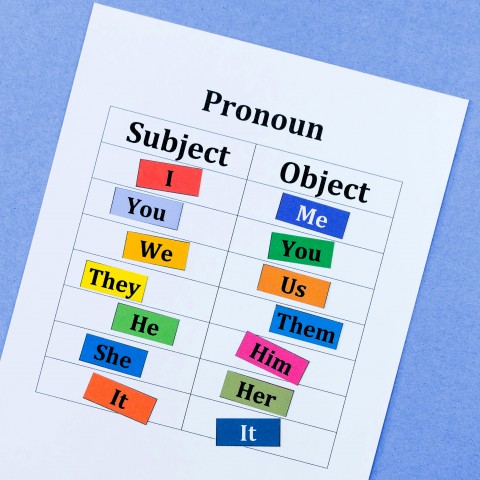
3 – Verbs
คำกริยา (kham-gà-rí-yaa), or Thai verbs, are grammatically categorized into four types:
- อกรรมกริยา (à-gam-gà-rí-yaa)
- สกรรมกริยา (sà-gam-gà-rí-yaa)
- วิกตรรถกริยา (wí-gà-dtàt-thà-gà-rí-yaa)
- กริยานุเคราะห์ (gà-rí-yaa-nú-khráw)
As you can guess, there’s no need to remember the name of each type or to know which verb belongs to which category. You just need to use them correctly, which is very easy to do.
As mentioned before, Thai has no tense or verb conjugation. This means that you don’t have to worry about changing a verb’s form for tense, mood, number, or gender like you would in many other languages.
Both Thai and English use auxiliary verbs, but they’re much simpler to use in Thai. The auxiliary verb is simply put in front of the verb, and that’s it. There’s no need to consider the subject or change the verb form.
- → Verbs are an essential part of speech, so it’s important that you know the most common ones. See our lesson on the Top 25 Thai Verbs to get a head start!
4 – Adjectives and Adverbs
In Thai grammar, adjectives and adverbs are treated differently than they are in English. Namely, Thai people don’t separate adverbs and adjectives, but view them as one grammar element called คำวิเศษณ์ (kham-ví-sèet). They’re categorized into ten types, which you don’t need to remember at all in order to use them correctly.
- → Do you want more information on this? Visit our lesson on Using Thai Adjectives!
3. Unique Thai Grammar Concepts
Not everything in Thai grammar is similar or comparable to English; there are certainly some unique Thai grammar rules, too. We’ll give you a few examples so that you get the idea.

1 – คำราชาศัพท์
Thai people use different words and phrases when speaking with the royal family or monks. This is an advanced Thai grammar component and it’s not very easy to learn—most Thai people don’t even use it correctly. It’s like you have to learn a new set of words. Here are some examples:
| English meaning | Normal Thai word | Thai word for royal family | Thai word for monks |
| eat | กิน (gin) | เสวย (sà-wǒoei) | ฉัน (chǎn) |
| sick | ป่วย (bpùuai) | ทรงพระประชวร (song-phrá-bprà-chuuan) | อาพาธ (aa-phâat) |
| food | อาหาร (aa-hǎan) | พระกระยาหาร (phrá-grà-yaa-hǎan) | ภัตตาหาร (phát-dtaa-hǎan) |
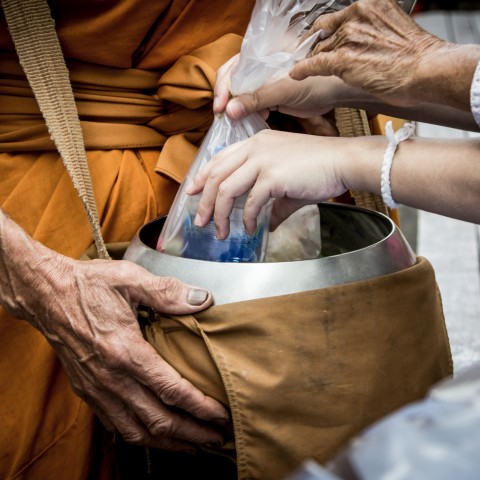
2 – A Special Type of Pronoun
In Thai, there’s a pronoun type called วิภาคสรรพนาม (wí-phâak-sàp-phá-naam). This type of pronoun is used with a group of nouns to show whether each component of that group performs the same action or not.
For example, ทุกคนต่างช่วยกันทำงาน (thúk-khon-dtàang-chûuai-tham-ngaan) means “each of everyone is helping each other working,” or in other words, “everyone works together.”
There is no pronoun or word like this in English.
3 – Numeric Classifiers
Numeric classifiers and quantifiers, or ลักษณะนาม (lák-sà-nà-naam), describe the physical characteristics of a noun. For example, in English you would say, “two bottles of milk” or “three pieces of cake.” The concept is similar to numerical classifiers in Thai language.
4. Conclusion
By now, you should know that Thai language grammar isn’t that hard to learn. Why?
To recap:
- Thai and English use the same SVO word order for basic sentences.
- Thai doesn’t have verb conjugation or verb tenses.
- Thai doesn’t take things like plurals or gender into consideration.
- Thai doesn’t have noun declension.
- Thai doesn’t use articles with its nouns.
Are you interested yet?
If you decide to continue learning Thai and want to know more about Thai grammar, don’t waste any time trying to find a good Thai grammar book. You’re already looking at the best option for learning Thai grammar: ThaiPod101.com! We provide our students with various lessons on the Thai language and culture, such as these:
- The Top 5 Reasons to Study Thai
- The Top 5 Things You Need to Know About Thai Society
- Introduction to Thai Pronunciation
Of course, you can also click on any of the links we provided throughout the article to get more information on something we covered.
So, what do you think? Do you find Thai grammar easy or pretty difficult so far? Let us know in the comments!

Popular Thai Quotes and Proverbs

When learning a language, you’re bound to come across a word or phrase that truly impresses you. Language learning is about so much more than figuring out how to communicate; it’s also about discovering a culture that’s different from yours and becoming immersed in a new way of thinking.
Since you’re learning Thai, it makes sense to study Thai quotes. In addition to picking up some of the language, you can gain insight about Thai values and beliefs from these words of wit and wisdom. In particular, you’ll find that many Thai quotes are influenced by Buddhism, the country’s main religion.
In this lesson, ThaiPod101.com will present you with a list of Thai quotes in English that you should know. From Thai motivational quotes to popular proverbs, you’ll have a ton of inspiring words to reflect on by the time you get to the end!
 Table of Contents
Table of Contents
- Thai Quotes About Work
- Thai Quotes About Life
- Thai Quotes About Time
- Thai Quotes About Love
- Thai Quotes About Friends and Family
- Thai Quotes About Happiness
- Thai Quotes About Language Learning
- Conclusion
1. Thai Quotes About Work
Let’s start with Thai quotes about success and work. As work is an important part of our lives, understanding Thai views on the topic will be immensely helpful to you as a learner.
- → You may also want to see our lesson on Thai for the Workplace!
1. เลือกทำงานที่เรารัก และจะไม่มีวันไหนที่รู้สึกว่าต้องทำงานเลย
Pronunciation: lûueak-tham-ngaan-thîi-rao-rák láe-jà-mâi-mii-wan-nǎi-thîi-rǔu-sùek-wâa-dtâawng- tham-ngaan-looei
Meaning: Choose the work you love and there won’t be a day you feel you have to work.
Author: Confucius (Chinese philosopher)
2. งานทุกอย่างที่สุจริตเป็นงานที่มีเกียรติทั้งนั้น
Pronunciation: ngaan-thúk-yàang-thîi-sùt-jà-rìt-bpen-ngaan-thîi-mii-gìiat-tháng-nán
Meaning: All trustworthy jobs are honorable.
Author: Panya Nanthaphiku (famous Thai monk)
This quote aims to teach people that all jobs are honorable, as long as they are legal and not immoral. You shouldn’t be ashamed of your job, for example, if it doesn’t pay well or is a labor job—at least you’re working!
3. งานที่เราชอบจะทำให้เราชอบทำงาน
Pronunciation: ngaan-thîi-rao-châawp-jà-tham-hâi-rao-châawp-tham-ngaan
Meaning: The work you like makes you like to work.
Author: Wattana Weerayawattanon (singer and songwriter)

4. อย่าทำงานเพื่อเก็บเงินไปใช้ในห้อง “ไอ ซี ยู”
Pronunciation: yàa-tham-ngaan-phûuea-gèp-ngoen-bpai-chái-nai-hâawng-ai-sii-yuu
Meaning: Don’t work and save money to spend it later for ICU.
Author: Meethiwachirodom (famous Thai monk)
This quote teaches the importance of time management and health. Some people work too much to earn a lot of money. As a result, they fail to take care of their health and end up spending all of their savings on hospital bills when they’re older and not as healthy as they used to be.
2. Thai Quotes About Life
Are you feeling stuck or dissatisfied with your life? There are a number of Thai quotes about life that teach valuable lessons you can apply to your situation right away. (These are also Instagram-friendly!)
- → Learn how to talk about Life Events in our relevant lesson, and be prepared for any major occasion in Thailand.
5. ชีวิตคนเรา…แสนสั้นเกินกว่าจะทำให้ทุกคน…พอใจ… และเชื่อว่าไม่มีใครคนไหนทำได้
Pronunciation: chii-wít-khon-rao-sǎaen-sân-gooen-gwàa-jà-tham-hâi-thúk-khon-phaaw-jai láe- chûuea-wâa-mâi-mii-khrai-khon-nǎi-tham-dâi
Meaning: Life is too short to be lived in order to please everyone, and there is no one who is capable of it.
Author: Kutto (singer)
6. บ่อยครั้ง เรามักเผลอเอาสายตาของคนอื่นมาเป็นเครื่องวัดคุณค่าของเรา
Pronunciation: bàauy-khráng rao-mák-phlǒoe-ao-sǎai-dtaa-khǎawng-khon-ùuen-maa-bpen- khrûueang-wát-khun-khâa-khǎawng-rao
Meaning: We often inadvertently use others’ judgement to value ourselves.
Author: Phaisan Visalo (famous Thai monk)
7. ถ้าคุณไม่อาจควบคุมอารมณ์ที่เกิดขึ้นมา อารมณ์จะพิพากษาชีวิตคุณ
Pronunciation: thâa-khun-mâi-àat-khûuap-khum-aa-rom-thîi-gòoet-khûen-maa aa-rom-jà-phí-phâak- sǎa-chii-vít-khun
Meaning: If you cannot control your emotions, they will judge your life.
Author: Jatupol Chomphunit (famous orator)
People can be irrational and act cruel when they’re angry, and end up hurting someone or having regrets about what they said. Just one action controlled by anger can ruin your life.

8. ทางไปสู่ความลำบากนั้น…ไปสบาย ทางไปสู่ความสบายนั้น…ไปลำบาก
Pronunciation: thaang-bpai-sùu-khwaam-lam-bàak-nán-bpai-sà-bàai thaang-bpai-sùu-khwaam-sà- baai-nán-lam-bàak
Meaning: The road to hardship is comfort but the road to comfort is hard.
Author: Su Boonliang (artist)
To live your life comfortably, you have to study and work hard to be successful in work (and vice-versa).
9. การหาความมั่นคงในชีวิต ก็เหมือนคาดหวังว่าดวงอาทิตย์จะอยู่บนฟ้าตลอดเวลา
Pronunciation: gaan-hǎa-khwaam-mân-khong-nai-chii-vít gâaw-mǔuean-khâat-wǎng-wâa-duuang- aa-thít-jà-yùu-bon-fáa-dtà-làawt-wee-laa
Meaning: To find stability in life is like expecting the sun to always be in the sky.
Author: Win Liaowarin (writer)
Buddhism teaches that one should never become attached to things—whether it be money, assets, one’s reputation or honor, etc.—because you can lose everything in a moment. Stability in life is another thing that one can lose; it’s impossible for one’s life to always be stable.
3. Thai Quotes About Time
Time is precious. Study these Thai quotes about time to gain insight into how Thai people view this phenomenon.
- → Want to increase your vocabulary? See our lesson What Time Is It In Thailand? to learn some useful time-related phrases.
10. สายน้ำไม่ไหลย้อยกลับ
Pronunciation: sǎai-nám-mâi-lǎi-yáawn-glàp
Meaning: The river has no return.
Author: quote from a song
11. อย่ามีชีวิต ชนิดที่เวลาผ่านมาแล้ว…มานึกเสียดายทีหลัง
Pronunciation: yàa-mii-chii-vít chá-nít-thîi-wee-laa-phâan-maa-láaeo maa-núek-sǐia-daai-thii-lǎng
Meaning: Don’t live your life in a way that you would regret when time passes.
Author: Wongthanong Chainarongsingh (founder of A Day magazine)
12. ระยะเวลา บอกแค่ว่าเรารู้จักกันนาน แต่ไม่ได้การันตีว่ารู้จักกันดี
Pronunciation: rá-yá-wee-laa bàawk-wâa-rao-rúu-jàk-gàn-naan dtàae-mâi-dâi-gaa-ran-thii-wâa-rúu- jàk-gan-dii
Meaning: Time reflects that we have known each other for long, but doesn’t mean we know each other well.
Author: Napaporn Traiwitwareegul (DJ)
You can know someone for years and still not really know who they are as a person.
13. การให้เวลา อาจมีค่ากว่าสิ่งของพิเศษ
Pronunciation: gaan-hâi-wee-laa àat-mii-khâa-mâak-khwàa-sìng-khǎawng-phí-sèet
Meaning: Giving time is more precious than a special gift.
Author: Round finger (writer)
14. เวลาและวารีไม่เคยคอยใคร
Pronunciation: wee-laa-láe-waa-rii-mâi-khooei-raaw-khrai
Meaning: Time and tide wait for no man.
Author: Proverb
4. Thai Quotes About Love
Are you madly in love with someone? Or perhaps you’re a hopeless romantic? Either way, we think you’ll enjoy reading through these Thai love quotes with English translations!
- → If you want more, make sure to visit our vocabulary list of the Top 10 Thai Love Quotes!
→ Are you recovering after ending a relationship? Then see our list of Thai Breakup Quotes.
15. รักแลกด้วยรัก ไม่ได้แลกด้วยชีวิต
Pronunciation: rák-lâaek-dûuai-rák mâi-dâi-lâaek-dûuai-chii-vít
Meaning: To get love, you give love, not life.
Author: Napaporn Traiwitwareegul (DJ)
This famous quote means that if you want someone to love you, give him or her your love, not everything in your life.
16. “อกหัก” เป็นเวลาที่ดีที่สุดที่จะพิสูจน์ว่า เรารักคนอื่นมากกว่ารักตัวเองหรือไม่
Pronunciation: òk-hàk-bpen-wee-laa-thîi-dii-thîi-sùt-thîi-jà-phí-sùut-wâa rao-rák-khon-ùuen-mâak- gwàa-rák-dtuua-eeng-rǔue-mâi
Meaning: “Being heartbroken” is the best time to prove whether you love others more than yourself or not.
Author: Win Liaowarin (writer)
17. บางครั้งสิ่งที่เลวร้ายกว่าการอกหัก …ก็คือการสมหวังได้แต่งงาน… แล้วไม่พบความสมหวังของชีวิตคู่
Pronunciation: baang-khráng-sìng-thîi-leeo-ráai-khwàa-gaan-òk-hàk gâaw-khuue-gaan-sǒm-wǎng- dâi-dtàaeng-ngaan láaeo-mâi-phóp-khwaam-sǒm-wǎng-khǎawng-chii-vít-khûu
Meaning: Sometimes, the thing that is worse than heartbreak is to get married as you hope for but not being happy in married life.
Author: Win Liaowarin (writer)

18. มันไม่ยากหรอกที่จะพูดคำว่ารัก แต่มันยากนักที่จะรักอย่างเข้าใจ
Pronunciation: man-mâi-yâak-ràawk-thîi-jà-phûut-kham-wâa-rák dtàae-man-yâak-nák-thîi-jà-rák- yàang-khâo-jai
Meaning: It is not hard to confess love, but it is hard to love someone with comprehension.
Author: Mahasompong (famous Thai monk)
When you love someone, it’s easy to say so out loud. However, it is hard to love him or her with comprehension; to love is to support, not to intrude.
19. อย่าวิ่งตามใครซักคนจนเราไม่เห็นคุณค่าของตัวเอง
Pronunciation: yàa-wîng-dtaam-khrai-sák-khon-jon-rao-mâi-hěn-khun-khâa-khǎawng-dtuua-eeng
Meaning: Don’t chase someone to the point where you no longer see value in yourself.
Author: Napaporn Traiwitwareegul (DJ)
When you love someone, you try hard to make him or her love you back. Sometimes, you try so hard to be the person they want that you no longer see good things in yourself.
5. Thai Quotes About Friends and Family
If you want to learn how friendship and family are perceived in Thai culture, these Thai quotes about family and friends are a great place to start.
- → For more great quotes, see our vocabulary list for the Top 10 Thai Quotes About Friendship!
20. อย่าแคร์คนอื่นมากกว่าครอบครัว อย่าตามใจตัวจนลืมว่าครอบครัวก็สำคัญ
Pronunciation: yàa-khaae-khon-ùuen-mâak-gwàa-khrâawp-khruua yàa-dtaam-jai-dtuua-jon-luuem- wâa-khrâawp-khruua-gâaw-sǎm-khan
Meaning: Don’t care about others more than your family and don’t be self-indulgent to the point where you forget that family is also important.
Author: Mahasompong (famous Thai monk)

21. นับเพื่อน อย่านับตอนดี ๆ นับตอนที่ชีวิตกำลังแย่ กำลังตกต่ำ นั่นแหละเพื่อนแท้
Pronunciation: náp-phûuen yàa-náp-dtaawn-dii-dii náp-dtaawn-thîi-chii-vít-gam-lang-yâae gam-lang-dtòk-dtàm nân-làae-phûuen-tháae
Meaning: Don’t count the number of friends when your life is good. You will know the number of your true friends when your life is at its worst.
Author: Kutto (singer)
22. เพื่อนที่ไม่ยอมหรือไม่อาจตักเตือนเพื่อน ก็ต้องถือว่าหมดความเป็นเพื่อนเสียแล้ว
Pronunciation: phûuen-thîi-mâi-yaawm-rǔue-mâi-àat-dtàk-dtuuen-phûuen gâaw-dtâawng-thǔue- wâa-mòt-khwaam-bpen-phûuen-sǐia-láaeo
Meaning: A friend who doesn’t or cannot give you criticism is no longer your friend.
Author: Phuthathatphiku (famous Thai monk)
To be friends with someone, you must have good intentions toward them. Thus, friends must be able to tell each other if they do wrong and keep each other accountable for their actions.
23. เพื่อนกินหาง่าย เพื่อนตายหายาก
Pronunciation: phûuen-gin-hǎa-ngâai phûuen-dtaai-hǎa-yâak
Meaning: A faithful friend is hard to find.
Author: Proverb
24. เลือดข้นกว่าน้ำ
Pronunciation: lôoet-khôn-gwàa-nám
Meaning: Blood is thicker than water.
Author: Proverb
6. Thai Quotes About Happiness
Everyone wants to be happy, but not everyone is happy nowadays. We hope that these quotes help you find happiness in life.
- → Express yourself like a native speaker by learning the Top 20 Words for Positive Emotions!
25. ที่สุดของคน คือ การเป็นคนธรรมดาที่มีความสุข
Pronunciation: thîi-sùt-khǎawng-khon khuue-gaan-bpen-khon-tham-má-daa-thîi-mii-khwaam-sùk
Meaning: The best thing a man can ask for is to be a normal person who is happy.
Author: Meethiwachirodom (famous Thai monk)
26. อย่ามองหาสิ่งที่ขาด จนพลาดที่จะมีความสุขกับสิ่งที่มี
Pronunciation: yàa-maawng-hǎa-sìng-thîi-khàat jon-plâat-thîi-jà-mii-khwaam-sùk-gàp-sìng-thîi-mii
Meaning: Don’t try to achieve things you don’t have to the point you fail to be happy with what you have.
Author: Saithip Montrigul Na Ayudhya (DJ)
Sometimes, you only see the things that you don’t have and try hard to get them. In doing so, you fail to enjoy the things you already have. For example, you want to be the most successful businessman, so you work so hard that you no longer have time for your family.
27. อย่าหยุดตัวเองไว้กับความทุกข์ คุณมีสิทธิที่จะมีความสุขไม่น้อยกว่าคนอื่น
Pronunciation: yàa-yhùt-dtuua-eeng-wái-gàp-khwaam-thúk khun-mii-sìt-thîi-jà-mii-khwaam-sùk-mâi- náauy-gwàa-khon-ùuen
Meaning: Don’t drown yourself in sadness, you have the right to be happy as much as everybody.
Author: Meethiwachirodom (famous Thai monk)

7. Thai Quotes About Language Learning
To close, let’s look at a couple of inspirational Thai quotes from language teachers about language learning!
28. ภาษาคือการสื่อสารกันและกัน ตราบใดที่สื่อสารกันแล้วรู้เรื่อง นั่นก็ยอดเยี่ยมแล้ว
Pronunciation: phaa-sǎa-khuue-gaan-sùue-sǎan-gan-láe-gan dtràap-dai-thîi-sùue-sǎan-gan-láaeo- rúu-rûueang nân-gâaw-yàawt-yìiam-láaeo
Meaning: Language is about communication. As long as it’s understandable, that’s great.
Author: Khanatip Sunthornrak (famous English teacher)
This quote teaches that when you learn a new language, you shouldn’t worry too much about all of the details (such as grammar or accents) as it discourages you from speaking. Instead, do your best to communicate; as long as the other parties understand, that is already a success.
29. การเรียนไม่ใช่เรื่องยาก ถ้ามองอุปสรรคเห็น และทำลายอุปสรรคเป็น
Pronunciation: gaan-riian-mâi-châi-rûueang-yâak thâa-maawng-ùp-bphà-sàk-hěn láe-tham-laai-ùp- bphà-sàk-bpen
Meaning: Learning is not hard if you know the obstacle and how to overcome it.
Author: Somsri Thammasansophon (famous English teacher)
When you learn a new language, there will be areas that you excel in and others you’re not as good at. All you need to do is focus on your weaknesses and find a good learning method to help you overcome them.

8. Conclusion
Do you feel inspired and motivated after reading all of these Thai quotes and proverbs? Does your native language have similar quotes? Share with us in the comments below.
Learning Thai quotes can be a little difficult if you don’t know much vocabulary. That said, it is a good way to familiarize yourself with the Thai language and culture. Keep practicing!
When you feel ready to move forward, ThaiPod101.com has many more useful lessons for you, such as words about sickness or taking a trip to Tiger Temple.
Happy learning!

Guide to Thai Time: How to Ask for the Time in Thai & More

Time is an important part of our life. Thus, it makes sense for Thai learners to learn how to ask for and give the time in Thai. Knowing Thai time phrases enables you to plan your schedule, make appointments, and better understand Thai conversations.
Telling Thai time is pretty different from doing so in English. Most of the words and phrases we’re going to look at aren’t difficult to understand, but you will need some time to get used to using them. For example, you don’t have to worry about remembering a.m. or p.m. in Thai because there is none. And we can also assure you that the way Thai people tell time is pretty straightforward, so it’s not hard to remember.
In this lesson, we’ll teach you basic time-related vocabulary such as the hours, minutes, and seconds in Thai. You’ll also get to learn various ways of telling the time in the Thai language, grouped into formal and informal ways for easier understanding. Of course, you’ll get to see and practice with many examples. Moreover, this lesson also provides you with a list of adverbs of time in Thai for more fluent speech, as well as time-related proverbs.
So let’s get started!
 Table of Contents
Table of Contents
- Time-Related Vocabulary in Thailand
- Formal Way to Tell Time in Thai
- Informal Way to Tell Time in Thai
- Time Adverbs in Thai
- Time-Related Proverbs and Sayings in Thai
- Conclusion
1. Time-Related Vocabulary in Thailand

Before learning how to tell time in Thailand, there’s some vocabulary to get out of the way first. Here’s a list of words you should know.
1- Time
Thai word: เวลา (wee-laa)
Example:
จะเริ่มประชุมเวลากี่โมง
Jà rôoem bprà-chum wee-laa gìi moong
“What time will the meeting start?”
2- Day time
Thai word: กลางวัน (glaang-wan)
Example:
ตอนกลางวัน ข้างนอกร้อนมาก
Dtaawn glaang-wan khâang nâawk ráawn mâak
“In the day time, it is very hot outside.”
Additional note:
There are three words that are often followed by กลางวัน (glaang-wan), listed below. The meaning of กลางวัน (glaang-wan) and these three words are pretty similar, so they can be used interchangeably.
- เวลากลางวัน (wee-laa glaang-wan)
- ตอนกลางวัน (dtaawn glaang-wan)
- ช่วงกลางวัน (chûuang glaang-wan)
3- Night time
Thai word: กลางคืน (glaang-khuuen)
Example:
อย่าออกไปข้างนอกเวลากลางคืนคนเดียว ไม่ปลอดภัย
Yàa àawk bpai khâang nâawk wee-laa glaang-khuuen khon-diiao mâi bplàawt-phai
“Don’t go out alone at night time, it is not safe.”
Additional note:
There are three words that are often followed by กลางคืน (glaang-khuuen), listed below. The meaning of กลางคืน (glaang-khuuen) and these three words are pretty similar, so they can be used interchangeably.
- เวลากลางคืน (wee-laa glaang-khuuen)
- ตอนกลางคืน (dtaawn glaang-khuuen)
- ช่วงกลางคืน (chûuang glaang-khuuen)
4- O’clock
Thai word: นาฬิกา (naa-lí-gaa); โมง (moong)
Example 1:
เมื่อวานนี้ นายกรัฐมนตรีเดินทางไปประเทศญี่ปุ่นตอนเวลา 10 นาฬิกา
Mûuea-waan-níi naa-yók rát-thà-mon-dtrii dooen-thaang bpai bprà-thêet yîi-bpùn dtaawn wee-laa sìp naa-lí-gaa
“Yesterday, the prime minister went to Japan at 10 o’clock.”
Example 2:
เธอจะถึงตอน 4 โมง
Thooe jà thǔeng dtaawn sìi moong
“She will arrive at 4 o’clock.”
Additional note:
There are two points you need to know about the words for “o’clock” in Thai.
One is the difference between นาฬิกา (naa-lí-gaa) and โมง (moong). นาฬิกา (naa-lí-gaa) is used in formal conversations, while โมง (moong) is used in informal conversations.
Another point you should know is that นาฬิกา (naa-lí-gaa) can also mean “clock” or “watch” in the Thai language.
5- Hour
Thai word: ชั่วโมง (chûua-moong)
Example:
1 ชั่วโมงในภาษาไทยคืออะไร
Nùeng chûua-moong nai phaa-sǎa thai khuue à-rai
“What is 1 hour in the Thai language?”
6- Minute
Thai word: นาที (naa-thii)
Example:
ขอเวลาอีกไม่กี่นาที
Khǎaw wee-laa ìik mâi gìi naa-thii
“I want a few more minutes.”
7- Second
Thai word: วินาที (wí-naa-thii)
Example:
1 นาทีมี 60 วินาที
Nùeng naa-thii mii hòk-sìp wí-naa-thii
“There are 60 seconds in 1 minute.”
Additional note:
In casual communication, Thai people often shorten the word วินาที (wí-naa-thii) to วิ (wí).
8. Clock
Thai word: นาฬิกา (naa-lí-gaa)
Example:
นาฬิกาของเธอสวยจัง
Naa-lí-gaa khǎawng thooe sǔuai jang
“Your clock is so beautiful.”
Additional note:
As mentioned above, นาฬิกา (naa-lí-gaa) has many meanings in the Thai language. It can mean “o’clock” or “watch.”
9. Watch
Thai word: นาฬิกาข้อมือ (naa-lí-gaa khâaw muue)
Example:
นาฬิกาข้อมือของเธอนั้นราคาเท่าไหร่
Naa-lí-gaa khâaw muue khǎawng thooe raa-khaa thâo-rǎi
“How much is your watch?”
Additional note:
นาฬิกาข้อมือ (naa-lí-gaa khâaw muue) is the combination of two words: นาฬิกา (naa-lí-gaa) which means “clock” and ข้อมือ (khâaw muue) which is “wrist” in Thai. Combined, the word refers to a clock on your wrist, which is a “watch.”
As mentioned above, you can also use the word นาฬิกา (naa-lí-gaa) to refer to a “watch” in the Thai language. However, comparing the two words, นาฬิกาข้อมือ (naa-lí-gaa khâaw muue) conveys a more specific meaning.
2. Formal Way to Tell Time in Thai

In the Thai time system, there are two main ways of telling time: a formal way and an informal way. We’ll start with the formal way first. Thai people rarely use this in daily conversation, and you’re much more likely to hear this in the news or an announcement.
The basic thing you need to know about the Thai clock is that Thai people use the twenty-four-hour clock in formal situations. Fortunately, this part is pretty easy.
1- Formal Way to Tell Time in Thai – Full Version
Below is the pattern you need to remember. You may recognize these words from the vocabulary section above.
….. นาฬิกา + ….. นาที
….. naa-lí-gaa + ….. naa-thii
….. o’clock + ….. minute
To tell the time, all you need to do is put the number in front of the unit. Just remember that Thai people use the twenty-four-hour format in formal situations. So from 1 p.m. to 12 a.m., don’t forget to change the number of the hour to 13-24 instead. For example:
- 3 a.m. in Thai is 3 นาฬิกา (sǎam naa-lí-gaa).
- 4 p.m. in Thai is 16 นาฬิกา (sìp-hòk naa-lí-gaa).
- 10:26 a.m. in Thai is 10 นาฬิกา 26 นาที (sìp naa-lí-gaa yîi-sìp-hòk naa-thii).
- 11:58 p.m. in Thai is 23 นาฬิกา 58 นาที (yîi-sìp-sǎam naa-lí-gaa hâa-sìp-bpàaet naa-thii).

2- Formal Way to Tell Time in Thai – Short Version
XX:YY น.
Thai people only use this shortened version in writing. You have to remember the pattern above. XX is the hour and YY is the minutes, so just put the numbers for the hour and minute where they belong. For example:
- 3 a.m. or 3 นาฬิกา (sǎam naa-lí-gaa) is 3:00 น.
- 4 p.m. or 16 นาฬิกา (sìp-hòk naa-lí-gaa) is 16:00 น.
- 10:26 a.m. or 10 นาฬิกา 26 นาที (sìp naa-lí-gaa yîi-sìp-hòk naa-thii) is 10:26 น.
- 11:58 p.m. or 23 นาฬิกา 58 นาที (yîi-sìp-sǎam naa-lí-gaa hâa-sìp-bpàaet naa-thii) is 23:58 น.
3- Common Formal Time-Related Sentences and Phrases
Now, let’s practice some sentences and phrases for telling time in Thai in formal situations.
What time is it?
- ขณะนี้เวลาเท่าไหร่
- Khà-nà-níi wee-laa thâo-rài

The current time is …..
- ขณะนี้เวลา ….. นาฬิกา ….. นาที
- Khà-nà-níi wee-laa ….. naa-lí-ga ….. naa-thii
What time is the …..?
- ….. เวลาอะไร
- ….. wee-laa à-rai
Example:
ประชุมเวลาอะไร
Bprà-chum wee-laa à-rai
“What time is the meeting?”
The time for XXX is ….. o’clock ….. minute.
- XXX เวลา ….. นาฬิกา ….. นาที
- XXX wee-laa ….. naa-lí-gaa ….. naa-thii
Example:
ประชุมเวลา 10 นาฬิกา
Bprà-chum wee-laa sìp naa-lí-gaa
“The time for the meeting is 10 o’clock.”
3. Informal Way to Tell Time in Thai
You’ve already learned the formal way to tell the time. Now, let’s learn the informal way. Thai people use this a lot in daily communication, both for speaking and writing.
The first thing you need to know is the main difference between the formal and informal ways to tell time in Thai. For the formal way, Thai people use the twenty-four-hour clock; for the informal way, Thai people use the twelve-hour clock.
When Thai people tell time informally, they either give you the number specifically or tell you the general period of time. We’ll explain both below, respectively.
1- Informal Way to Say ….. O’clock in Thai
This is more difficult than the formal way of telling the time. Since the way you tell time is different for each period of the day, you have a bit to remember. For easy understanding, we’ve summarized what you need to remember in the table below.
| Time | Thai word | Thai word | Example |
|---|---|---|---|
| 1-5 a.m. | 1-5 a.m. | dtii….. | ตีสาม (dtii sǎam) is “3 a.m.” in Thai. |
| 6-11 a.m. | ….. โมงเช้า | ….. moong cháo | 7 โมงเช้า (jèt moong cháo) is “7 a.m.” in Thai. |
| 12 p.m. | เที่ยงวัน | thîiang wan | – |
| 1-5 p.m. | บ่าย ….. โมง | bàai ….. moong | บ่ายสี่โมง (bàai sìi moong) is “4 p.m.” in Thai. |
| 6 p.m. | หกโมงเย็น | hòk moong yen | – |
| The informal way of telling time from 7-11 p.m. is special. The way to say this is …ทุ่ม (…thûm). However, instead of saying the number on the clock, Thai people start counting 7 as 1, 8 as 2, and so on. | |||
| 7 p.m. | 1 ทุ่ม | nùeng thûm | – |
| 8 p.m. | 2 ทุ่ม | sǎawng thûm | – |
| 9 p.m. | 3 ทุ่ม | sǎam thûm | – |
| 10 p.m. | 4 ทุ่ม | sìi thûm | – |
| 11 p.m. | 5 ทุ่ม | hâa thûm | – |
| 12 a.m. | 6 ทุ่ม | thîiang-kuuen | – |
2- Informal Way to Give the Minutes in Thai
The informal way of giving someone the hour is quite hard as there’s a lot to remember. However, that’s probably the most difficult part of this lesson and you’ve already passed it. Another bit of good news is that the minute part is pretty easy. There are only three points you have to remember.
0 minute in Thai
Thai word: ตรง (dtrong)
How to use: In English, if it’s XX:00 a.m. or XX:00 p.m., such as 3 p.m. sharp, you ignore the minute part. However, Thai people put the word ตรง (dtrong) after the o’clock time.
Example:
ตอนนี้เวลา 9 โมงตรง
dtaawn-níi wee-laa gâo moong dtrong
“It is 9 a.m. now.”
30 minutes in Thai
Thai word: ครึ่ง (khrûeng)
How to use:
There are two ways to use this word in Thai.
The first is to just put ครึ่ง (khrûeng) after the o’clock time.
The second is, if you want to say thirty minutes as a period of time, you use ครึ่งชั่วโมง (khrûeng chûua-moong), which means “half an hour” in Thai.
Example 1:
เจอกันตอนสองทุ่มครึ่งนะ
Jooe gan dtaawn nùeng thûm khrûeng ná
“I will meet you at 7:30 p.m.”
Example 2:
แม่ใช้เวลาทำซุปครึ่งชั่วโมง
Mâae chái wee-laa tham súp khrûeng chûua-moong
“Mom spent thirty minutes cooking soup.”
….. minutes in Thai
Thai word: XX นาที (naa-thii)
How to use: Now that we’ve covered the 0-minute and 30-minute rules, the rest is very easy. It’s the same as the formal way to tell the time. You just put the number followed by นาที (naa-thii).
Example:
หนังจะเริ่มตอน 10 โมง 15 นาที
Nǎng jà rôoem dtaawn sìp moong sìp-hâa naa-thii
“The movie will start at 10:15 a.m.”
3- Informal Way to Tell the Time Period in Thai
Now that you can tell the time, let’s learn the name of each time period Thai people use in daily life. Thai people use ตอน (dtaawn) followed by the names of each period, except midnight.
Morning (6-9 a.m.)
Thai word: ตอนเช้า (dtaawn-cháo)
Example:
ตอนเช้าแถวนี้รถติดมาก
Dtaawn-cháo thǎaeo níi rót thìt mâak
“In the morning, the traffic is very bad around here.”

Morning (9-12 a.m.)
Thai word: ตอนสาย (dtaawn-sǎai)
Example:
พ่อออกกำลังกายตอนสาย ๆ ทุกวัน
Phâaw àawk-gam-lang-gaai dtaawn-sǎai-sǎai thúk wan
“Dad exercises every day in the morning.”
Noon (12 p.m.)
Thai word: ตอนเที่ยง (dtaawn-thîiang)
Example:
ตอนเที่ยงอากาศข้างนอกร้อนมาก
Dtaawn-thîiang aa-gàat khâang nâawk ráawn mâak
“The weather outside is very hot at noon.”
Afternoon (1-3 p.m.)
Thai word: ตอนบ่าย (dtaawn-bàai)
Example:
ตอนบ่ายวันพรุ่งนี้ ฉันมีประชุม
Dtaawn-bàai wan phrûng-níi chǎn mii bprà-chum
“I have a meeting tomorrow afternoon.”
Afternoon (3-6 p.m.)
Thai word: ตอนเย็น (dtaawn-yen)
Example:
ร้านอาหารแถวบ้านคิวยาวมากตอนเย็น
ráan aa-hǎan thǎaeo bâan khiu yaao mâak dtaawn-yen
“The queue of restaurants near my home is very long in the evening.”
Evening (6-9 p.m.)
Thai word: ตอนค่ำ (dtaawn-khâm)
Example:
น้องกลับถึงบ้านตอนค่ำเพราะรถติด
Náawng glàp thǔng bâan dtaawn-khâm phráw rót dtìt
“My sister came back home in the evening because of a traffic jam.”
Night (9-12 p.m.)
Thai word: ตอนดึก (dtaawn-dùek)
Example:
เธอตื่นสายเพราะมัวแต่เล่นเกมส์ตอนดึกเมื่อคืน
thooe dtùuen sǎai phráw muua dtàae lèn geem dtaawn-dùek mûuea-khuuen
“She woke up late because she played a game last night.”
Midnight (12 a.m.)
Thai word: เที่ยงคืน (thîiang-khuuen)
Example:
เที่ยงคืนแล้ว ยังนอนไม่หลับเลย
Thîiang-khuuen láaeo yang naawn mâi làp looei
“I still can’t sleep despite it being midnight.”
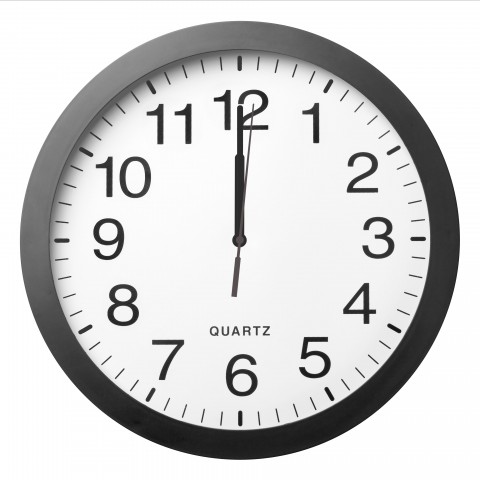
4- Common Informal Time-Related Sentences and Phrases
Now that you know how to informally tell the time in Thai, you should practice some time-related sentences and phrases to use in real life!
What time is it?
- ตอนนี่กี่โมงแล้ว
- Dtaawn-níi gìi moong láaeo
The current time is …..
- ตอนนี้เวลา …..
- Dtaawn-níi wee-laa …..
What time is the …..?
- ….. ตอนกี่โมง
- ….. dtaawn gìi moong
Example:
กินข้าวเย็นตอนกี่โมง
gin kâao yen dtaawn gìi moong
“What time is dinner?”
The time for XXX is YYY.
- XXX ตอน YYY
- XXX dtawwn YYY
Example:
กินข้าวเย็นตอน 6 โมงครึ่ง
Gin khâao yen dtaawn hòk moong khrûeng
“The time for dinner is at 6:30 p.m.”
4. Time Adverbs in Thai
Now that you know how to tell time in Thai, it’s useful to know some time adverbs as well. They will enable you to include more detail and speak more like a native when telling the time in Thai. Here’s a list of time adverbs you should know:
1- Right now
Thai word: ตอนนี้ (thaawn-níi); เดี๋ยวนี้ (dǐiao-níi)
Example 1:
เธอต้องทำตอนนี้เลย
Thooe dtâawng tham dtaawn-níi looei
“You have to do it right now.”
Example 2:
ออกไปเดี๋ยวนี้เลย!!
Àawk bpai dǐiao-níi loei
“Get out right now!!”
Additional note:
ตอนนี้ (thaawn-níi) and เดี๋ยวนี้ (dǐiao-níi) are pretty much the same and can be used interchangeably. However, เดี๋ยวนี้ (dǐiao-níi) conveys a more immediate and urgent feeling.
2- Currently
Thai word: ปัจจุบันนี้ (bpàt-jù-baan níi)
Example:
ปัจจุบันนี้ โรงเรียนของเรามีนักเรียน 500 คน
Bpàt-jù-baan níi roong-riian khǎawng rao mii nák riian hâa-ráauy khon
“Currently, our school has 500 students.”
3- Before
Thai word: ก่อน (gàawn)
Example:
อย่าลืมล้างมือก่อนกินข้าว
Yàa luuem láang muue gàawn gin khâao
“Don’t forget to wash your hands before the meal.”
Additional note:
When using ก่อน (gàawn), the event that happens first is always in front of ก่อน (gàawn), while the event that happens later is put behind it.
4- After
Thai word: หลัง (lǎang)
Example:
หลังกินอาหาร ต้องทานยาทันที
Lǎang gin aa-hǎan dtâawng thaan yaa than-thii
“Take medicine immediately after meals.”
Additional note:
When using หลัง (lǎang), the event that happens later always follows หลัง (lǎang). But the event that happens first can be both in front of and after หลัง (lǎang).
5- Soon
Thai word: เร็ว ๆ นี้ (reo-reo-níi)
Example:
เจอกันเร็ว ๆ นี้
Jooe gan reo-reo-níi
“See you soon.”
6- Almost
Thai word: เกือบ (gùueap)
Example:
อาหารเกือบจะเสร็จแล้ว
Aa-hǎan gùueap jà sèt láaeo
“The food is almost done.”
7- In a while
Thai word: อีกสักครู่ (ìik sàk-khrûu)
Example:
งานจะจบในอีกสักครู่
Ngaan jà jòp nai ìik sàk-khrûu
“The event will end in a while.”
8- For a long time
Thai word: เป็นเวลานาน (bpen wee-laa naan)
Example:
เขาอาศัยอยู่ที่บ้านหลังนี้เป็นเวลานานแล้ว
Khǎo aa-sǎi yùu thîi bâan lǎang níi bpen wee-laa naan láaeo
“He has lived in his house for a long time.”
9- Anytime
Thai word: เมื่อไหร่ก็ได้ (mûuea-rài gâaw dâi); ตอนไหนก็ได้ (dtaawn-nǎi gâaw dâi)
Example 1:
เธอจะมาที่นี่เมื่อไหร่ก็ได้
Thooe jà ma thîi nîi mûuea-rài gâaw dâi
“You can come here anytime.”
Example 2:
พรุ่งนี้วันอาทิตย์ ฉันจะตื่นนอนตอนไหนก็ได้
Phrûng-níi wan-aa-thít chǎn jà dtùuen naawn dtaawn nǎi gâaw dâi
“Tomorrow is Sunday. I can wake up anytime.”
Additional note:
เมื่อไหร่ก็ได้ (mûuea-rài gâaw dâi) and ตอนไหนก็ได้ (dtaawn-nǎi gâaw dâi) are exactly the same and can substitute one another.
10- As soon as possible
Thai word: โดยเร็วที่สุด (dooi reo thîi sùt)
Example:
ฉันจะทำให้เสร็จโดยเร็วที่สุด
Chǎn jà tham hâi sèt dooi reo thîi sùt
“I will finish it as soon as possible.”
5. Time-Related Proverbs and Sayings in Thai
As you learn about Thai time, it’s a great idea to learn some proverbs and sayings about time in Thai. Below are five proverbs and sayings you should know!
1- ผัดวันประกันพรุ่ง
Thai pronunciation: phàt-wan-bprà-gan-prûng
Literal meaning: –
English meaning: Keep postponing the time
Explanation: This proverb is used to explain a situation in which something is being postponed many times over. For example, A promises to finish his homework on Saturday at first, but then he tells his mom that he’ll finish it on Sunday instead. When Sunday comes, he tells her that he’ll finish on Monday. ผัดวันประกันพรุ่ง (phàt-wan-bprà-gan-prûng) can explain A’s behavior well.
Example:
ทำให้เสร็จเลย อย่าผัดวันประกันพรุ่ง
Tham hâi sèt looei yàa phàt-wan-bprà-gan-phrûng
“Finish it now, don’t keep postponing the deadline.”
2- ไก่โห่
Thai pronunciation: gài-hòo
Literal meaning: Cock yells.
English meaning: Very early morning
Explanation: Since the cock often crows in the early morning, Thai people call the early morning time ไก่โห่ (gài-hòo).
Example:
วันนี้แม่ปลุกฉันตั้งแต่ไก่โห่
Wan-níi mâae bplùk chǎn dtâng dtàae gài-hòo
“Today, mom woke me up in the early morning.”
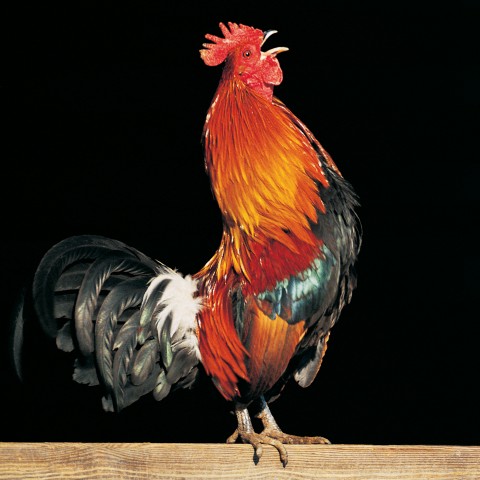
3- คาบเส้นยาแดง
Thai pronunciation: khâap sên yaa daaeng
Literal meaning: –
English meaning: Almost not finishing the task in time
Explanation: The Thai proverb คาบเส้นยาแดง (khâap sên yaa daaeng) is used to explain when someone nearly misses their deadline to do something.
Example:
เธอทำรายงานเสร็จแบบคาบเส้นยาแดงพอดีเลย
Thooe tham raai-ngaan sèt bàaep khâap sên yaa daaeng phaaw dii loeei
“She almost didn’t finish the report in time.”
4- เวลาเป็นเงินเป็นทอง
Thai pronunciation: wee-laa bpen ngen bpen thaawng
Literal meaning: Time is silver and gold.
English meaning: Time is valuable.
Explanation: This Thai saying is used to say that time is valuable. It’s often used in situations when you’re made to wait for no good reason or your time is being wasted.
Example:
ทำเร็ว ๆ หน่อย อย่าให้ต้องรอนาน เวลาเป็นเงินเป็นทอง
Tham reo-reo nàauy yàa hâi dtâawng raaw naan wee-laa bpen ngen bpen thaawng
“Quickly, don’t make me wait. My time is valuable.”
5- เวลาผ่านไปไวเหมือนโกหก
Thai pronunciation: wee-la phàan bpai wai mǔuean goo-hok
Literal meaning: Time passed quickly as if flying.
English meaning: Time flies.
Explanation: This Thai phrase is used to explain that time passes very quickly. Its meaning is exactly the same as “time flies” in English.
Example:
อีกไม่กี่วันลูกชายก็จะอายุ 20 ปีแล้ว เวลาผ่านไปไวเหมือนโกหก
Ìik mâi gìi wan lûuk chaai gâaw jà aa-yú yîi-sìp bpii láaeo wee-la phàan bpai wai mǔuean goo-hòk
“My son will be twenty years old in a few days. Time flies.”
6. Conclusion

What do you think about our Thai time lesson? Did you find it easy or difficult? How does time-telling in Thai compare to telling time in your own language? Please comment below to let us know.
In our opinion, some parts of this lesson are easy while others are a bit more complicated. However, with some practice, you can master it in no time. Try practicing this a lot with your peers or other Thai people you know. If you practice a lot, you’ll find everything you learned here a lot easier to remember.
And once you’re good with this lesson, don’t forget to check out other interesting and fun lessons at ThaiPod101.com, such as Songkran Festival, Noodle in the Boat, or Wat Phra Kaew. In addition to learning more about the Thai language, you’ll also get to learn about Thai culture and traditions!
Until next time, happy Thai learning!

Thai Customs: Best Guide to Etiquette in Thailand
Those who have been to many countries are likely to know that people, despite being the same in many aspects, are different because of culture, customs, and values. Everyone has to eat, sleep, and interact with other people. So how do these actions differ in Thailand, compared to elsewhere?
If you need to interact with Thai people or plan on living in Thailand, knowing about Thailand customs, culture facts, social values, beliefs, and traditions is essential. To fit in with the rest of the Thai population and show respect, you need to know about them, especially Thai culture and etiquette.
In this article, ThaiPod101.com will teach you about Thai etiquette in daily life situations, such as Thai eating etiquette, Thai funeral etiquette, Thai business etiquette, and Thai etiquette for tourists, so you know all the do’s and don’ts in Thailand. Moreover, you’ll get to know more about tradition and culture in Thailand through this lesson.

Table of Contents
- Words about Thai Customs
- Useful Sentence Patterns to Discuss General Etiquette in Thailand
- Thai Dining Etiquette
- Manners and Etiquette in Thailand: Thai Tourist Etiquette
- Thai Greeting Etiquette
- Thai Guest Etiquette
- Thai Etiquette in Public Transportation
- Thai Business Etiquette
- Thai Etiquette in Various Situations
- Conclusion: How ThaiPod101 Can Help You Master Thai Culture
1. Words about Thai Customs
Before you learn about Thai customs, it will be good to know Thai words related to this topic.
- ขนบธรรมเนียมไทย (khà-nòp-tham-niiam thai) is “Thai custom” or “Thai tradition”
- มารยาทไทย (maa-rá-yàat thai) is “Thai etiquette” or “Thai manners”
- วัฒนธรรมไทย (wát-thá-ná-tham thai) is “Thai culture“
- ความเชื่อไทย (khwaam-chûuea thai) is “Thai belief”
- ค่านิยมไทย (khâa-ní-yom thai) is “Thai value”
- สังคมไทย (sǎng-khom thai) is “Thai society”
2. Useful Sentence Patterns to Discuss General Etiquette in Thailand
Let’s learn the sentence patterns you should know when you talk about Thai etiquette and manners. There are two patterns as listed below:
1- Should…
Thai language: ควร + verb
Thai pronunciation: khuuan + …..
Example:
- แขกควรถอดรองเท้าก่อนเข้าบ้านคนไทย
khàaek khuuan thàawt raawng-tháo gàawn khâo bâan khon thai
“Guests should take off their shoes before entering a Thai house.”
2- Don’t…
Thai language: อย่า + verb
Thai pronunciation: yàa + …..
Example:
- อย่าจับหัวคนไทยโดยไม่จำเป็น
yàa jàp hŭua khon thai dooi mâi jam bpen
“Don’t touch the head of a Thai person unless it’s necessary.”
3. Thai Dining Etiquette
Since eating is part of daily life, we’ll first teach you Thai table manners and dining etiquette in Thailand. Below is a list of things you should and shouldn’t do during a meal with Thai people. As long as you follow these basic rules of eating etiquette in Thailand, you should have a very enjoyable Thai meal.
1- Let elders or people of a higher position eat first.
Thai sentence: ให้คนที่อายุมากกว่าหรือมีตำแหน่งสูงกว่าตักอาหารก่อน
Thai pronunciation: hâi khon thîi aa-yú mâak gwàa rǔue mii dtam-nàaeng sǔung gwàa dtàk aa-hăan gàawn
Explanation: In Thai society, people normally eat together as a big family. Each person has their own plate of rice, but shares side dishes with each other. It’s proper table etiquette in Thailand to let people who are older than you, or people who are in a higher position than you (such as your boss), start eating first. This means that they can pick food from the side dishes first.
2- Set the table for elders.
Thai sentence: จัดโต๊ะอาหารให้คนมีที่อายุมากกว่า
Thai pronunciation: jàt dtó aa-hǎan hâi khon thîi mii aa-yú mâak khwàa
Explanation: As mentioned above, people in Thai society normally eat together. In case the dining table isn’t properly set, the youngest one at the table should be the one who sets it.
3- Don’t speak while chewing.
Thai sentence: อย่าพูดตอนเคี้ยวอาหาร
Thai pronunciation: yàa phûut dtaawn khíiao aa-hǎan
Explanation: Speaking while chewing is considered bad restaurant etiquette in Thailand, and is rude for dining in general. Apart from not looking nice and other people not clearly understanding what’s said, this behavior may make the speaker choke on food. So you shouldn’t do this while dining with Thai people.
4- Don’t make noise when chewing or drinking.
Thai sentence: อย่าทานอาหารหรือดื่มน้ำเสียงดัง
Thai pronunciation: yàa thaan aa-hǎan rǔue dùuem nám sǐiang dang
Explanation: In some countries, making noise when eating shows that you enjoy the food. But in Thailand, it’s viewed as bad etiquette. When you eat in Thailand, avoid making loud noises while eating or drinking.
5- Don’t hit tableware.
Thai sentence: อย่าเคาะช้อนส้อม
Thai pronunciation: yàa kháw cháawn sâawm
Explanation: In the phrase above, its literal meaning only mentions spoons and forks. But actually, Thai people consider hitting all tableware items (such as spoons, forks, chopsticks, etc.) as rude.
6- Don’t talk about gross topics.
Thai sentence: อย่าคุยเรื่องน่าขยะแขยง
Thai pronunciation: yàa khui rûueang nâa khà-yà-khà-yǎaeng
Explanation: During the meal, you shouldn’t talk about something gross, as it will make others lose their appetite.
4. Manners and Etiquette in Thailand: Thai Tourist Etiquette
Thailand is a nice place for traveling. There are many beautiful places to go sightseeing, the food tastes good, and Thai people are very nice. Moreover, the cost of living here isn’t high, so a lot of people enjoy traveling in Thailand.
As a tourist, it’s good to know some Thai manners and customs so that you don’t unintentionally act weird or rude in Thais’ point of view. To help you understand basic social etiquette in Thailand, we’ve provided a list of proper tourist etiquette in Thailand.
There are two main scenarios that we’ll focus on in this section: Basic etiquette in Thailand while in public areas, and how to act in holy places.
1- Thai Etiquette in Public Areas
Sightseeing is a must when you come to Thailand. Most tourists enjoy street food, shopping in the night market, or just seeing around the city. So it’s nice to know what you should and shouldn’t do.
1. No public displays of affection.
Thai sentence: อย่าแสดงความรักในที่สาธารณะมากจนเกินไป
Thai pronunciation: yàa sà-daaeng khwaam-rák nai thîi sǎa-thaa-raa-ná mâak jon gooen bpai
Explanation: In Thai society, some displays of affection between lovers is acceptable, such as holding hands or hugging. But any behavior more than this, such as kissing, isn’t okay. Thai people see it as inappropriate. But displays of affection between parent and child is okay.
2. Be aware not to touch a monk if you’re female.
Thai sentence: ผู้หญิงต้องระวังอย่าให้โดนตัวพระ
Thai pronunciation: phûu-yǐng dtâawng rá-wang yàa hâi doon dtuua phrá
Explanation: Most Thai people are Buddhist, and in Thailand, beliefs and values of Buddhism are quite strong. It’s possible that you may see a monk walking by on the street. For a monk, there’s a rule saying that monks can’t touch a female, regardless of intention.
So if you see a Thai monk, and you’re a female, please uphold proper etiquette in Thailand and avoid being too close; you don’t want to accidentally touch the monk. If you’re walking in a crowded street and don’t know what to do, just stop walking and the monk will avoid you instead.
3. Stand still when you hear the Thai national anthem.
Thai sentence: ยืนตรงเคารพธงชาติ
Thai pronunciation: yuuen dtrong khao-róp thong-châat
Explanation: In some public areas, such as parks, you may hear the Thai national anthem at eight o’clock in the morning and again at six o’clock in the afternoon. When Thai people hear the national anthem, they stand still until the song ends, as a way to pay respect. So if you notice that Thai people have suddenly stopped walking and stand still at these times, it’s probably because of the national anthem.
4. Avoid dressing too short or too sexy.
Thai sentence: อย่าแต่งตัวโป๊
Thai pronunciation: yàa dtàaeng dtuua bpóo
Explanation: In Thailand, values and traditions for women may have changed a lot from the past, but women are still expected to dress properly when going outside. That is, don’t wear short-shorts or short skirts. Not wearing a bra is unacceptable as well. The customs and etiquette in Thailand for men’s dress isn’t as strict as it is for women; just dress with consideration for where you’ll be going.
2. Thai Etiquette in Holy Places
If you come to Thailand, one of the most famous tourist attractions are temples. Temples are viewed as holy places in Thailand, so you’re expected to follow certain cultural etiquette in Thailand when you’re in the temple. Here’s a list of do’s and don’ts for etiquette in Thai temples.
1. Dress properly.
Thai sentence: แต่งกายเรียบร้อย
Thai pronunciation: dtàaeng-gaai rîiap-ráauy
Explanation: It is the etiquette of Thailand to dress properly in the temple, both men and women. A shirt with no sleeves, shorts, and skirts that are shorter than knee-length aren’t appropriate to wear in temples. So if you plan to travel to a temple, please dress properly.
2.Don’t make loud noise.
Thai sentence: อย่าส่งเสียงดัง
Thai pronunciation: yàa sòng sǐiang dang
Explanation: Adding to what we mentioned above, temples are also a place where people come to make merit and practice dharma. Thus, temples normally have a calm atmosphere; you shouldn’t make loud noises in the temple.
3. No alcohol or cigarettes.
Thai sentence: ห้ามดื่มเหล้าและสูบบุหรี่
Thai pronunciation: hâam dùuem lâo láe sùup bù-rìi
Explanation: For Buddhists, there’s a behavior guideline called ศีล 5 (sǐin-hâa) which means “5 precepts.” Drinking alcohol and smoking are prohibited behaviors in these five precepts. So you can’t drink or smoke in the temple area. Also keep in mind that drinking and smoking are unhealthy as well.
4. Take off your shoes where required.
Thai sentence: ถอดรองเท้าในบริเวณที่กำหนด
Thai pronunciation: thàawt raawng-tháo nai baaw-rí-ween thîi gam-nòt
Explanation: In some areas, such as in the chapel, you have to take your shoes off. There will be a sign that clearly shows if you have to take your shoes off.
5. Do not take photos.
Thai sentence: ห้ามถ่ายรูป
Thai pronunciation: hâam thàai rûup
Explanation: In some areas of the temple, you’re not allowed to take photos. There will be a sign clearly showing if you’re not allowed to take photos, so please look around.
5. Thai Greeting Etiquette
Our guide of etiquette rules in Thailand wouldn’t be complete without a section on proper greetings.
When people meet, people greet. So if you come to Thailand, it makes sense to learn Thai greeting etiquette. Greetings reflect another unique aspect of culture and etiquette in Thailand, and we’ll explain the main points of greeting etiquette in Thailand as follows:
1- Say sà-wàt-dii + wâi
When Thai people meet each other, they greet by saying สวัสดี (sà-wàt-dii) and perform an action called ไหว้ (wâi). Let’s learn some vocabulary before continuing.
- ไหว้ (wâi) is a way of greeting in Thai language.
- สวัสดี (sà-wàt-dii) is “hello” in Thai. The word “hello” in Thai means goodness, beauty, prosperity, and safety.
To ไหว้ (wâi), you have to put your hands together in front of your chest and bend your head toward your forefinger.
2- Smile
Thai sentence: ยิ้ม
Thai pronunciation: yím
Explanation: If you’re not Thai or can’t speak much Thai, just smile after greeting. It creates a good atmosphere when you meet someone. As you may have heard before, Thailand is a land of smiles.
3- Call Other Parties by kun+name
When you meet someone for the first time, it’s formal to call them by คุณ (khun) + name. คุณ (khun) is a formal title in Thai.
4- Avoid Looking at Other Parties from Head to Toe
Thai sentence: อย่ามองคนจากหัวจรดเท้า
Thai pronunciation: yàa maawng khon jàak hǔua jà-ròt tháo
Explanation: Looking at other parties from head to toe isn’t exactly a rude gesture. However, some people do this action as a way of looking down on other people, so it may create the wrong impression if you do so.
6. Thai Guest Etiquette
When you come to Thailand, you may get a chance to visit a Thai house. Thus, it will be good to learn some Thai hospitality and etiquette so that you know what you can and can’t do, and act accordingly.
1- Take Off Your Shoes Before Entering the House
Thai sentence: ถอดรองเท้าก่อนเข้าบ้าน
Thai pronunciation: thàawt raawng-tháo gàawn khâo bâan
Explanation: Most Thai people walk barefoot in the house. So if you visit a Thai house, you have to take off your shoes before entering the house.
2- Stay in the Living Room
Thai sentence: อยู่ในห้องนั่งเล่น
Thai pronunciation: yùu nai hâawng nâng lên
Explanation: When you go to another person’s house, if you’re not close to the owner, it’s appropriate to stay mainly in the living room or in the area where the owner seated you. You shouldn’t go wandering by yourself. However, this also depends on the relationship between you and the owner.
3- Bring a Gift (though it’s not Necessary)
Thai sentence: เอาของมาฝากเจ้าของบ้าน
Thai pronunciation: ao khǎawng maa fàak jâo khǎawng bâan
Explanation: When you visit a Thai house, it would be nice to bring some kind of gift to them. Most of the time, when it comes to gift etiquette in Thailand, food and drinks are okay. It doesn’t have to be anything fancy. Again, what’s considered proper gift giving etiquette in Thailand also depends on the relationship between you and the owner of the house.
4- Avoid Putting Your Feet on the Table
Thai sentence: อย่าเอาเท้าวางบนโต๊ะ
Thai pronunciation: yàa ao tháo waang bon dtó
Explanation: Thai people view feet as being dirty. Thus, you shouldn’t put your feet on the tables or chairs.
5- Don’t Go into the Owner’s Belongings
Thai sentence: อย่ารื้อของในบ้านคนอื่น
Thai pronunciation: yàa rúue khǎawng nai bâan khon ùuen
Explanation: Even if you have a close relationship with the owner of the house, it may be inappropriate to look through things in drawers or cupboards. Things in those areas are kind of personal, but if the owner asks you to open it, then it’s okay.
7. Thai Etiquette in Public Transportation
When you travel in Thailand, you may get a chance to travel by public transportation, such as on a bus, BTS, MRT, etc. Here are the do’s and don’ts for transportation in Thailand that you should know.
1- Don’t Stand in Front of the Door
Thai sentence: อย่ายืนขวางประตู
Thai pronunciation: yàa yuuen khwǎang bprà-dtuu
Explanation: When you travel by bus, BTS, or MRT, try to get inside so that there’s space for others to come in. Avoid standing in front of the door, as this is dangerous and could lead to an accident.
2- Give Your Seat to Children, Monks, Elders, and Handicapped People
Thai sentence: เอื้อเฟื้อที่นั่งแก่เด็ก, พระ, คนชรา, และคนพิการ
Thai pronunciation: ûuea-fúuea thîi nâng gàae dèk phrá khon chá-raa láe khon phí-gaan
Explanation: Thai people are quite kind and often help each other. Thai people view children, elders, and handicapped people as physically inferior and in need of help. As for monks, Thai people respect them. So when traveling by public transportation, Thai people give their seats to them. It’s not a social norm, but it’s what Thai people often do anyways.
3- No Alcohol or Cigarettes
Thai sentence: ห้ามดื่มเหล้าและสูบบุหรี่
Thai pronunciation: hâam dùuem lâo láe sùup bù-rìi
Explanation: Alcohol affects how people think, and cigarette smoke is unhealthy. As they’re not good to others and could lead to accidents and problems, you shouldn’t drink or smoke on public transportation.
4- No Stinky Food
Thai sentence: อย่านำอาหารมีกลิ่นขึ้นรถ
Thai pronunciation: yàa nam aa-hǎan mii glìn khûen rót
Explanation: Some food—such as durians, crispy garlic chive dumplings, and squid—can be very stinky. While some people think these foods smell nice, others don’t. To create a nice and clean atmosphere and not disturb other people, don’t eat stinky food on public transportation. If you have to bring it with you, make sure to seal it properly so it doesn’t smell much.
8. Thai Business Etiquette
If you’re working in Thailand or working with Thai people, it’s nice to know business etiquette in Thailand. Below are some things about business etiquette in Thailand you should be aware of.
1- Dress Properly
Thai sentence: แต่งตัวสุภาพ
Thai pronunciation: dtàaeng-dtuua sù-phâap
Explanation: The first impression is very important when you do Thai business. And the first thing that catches attention is how you dress. Men are supposed to wear a shirt and slacks, while women are supposed to wear a knee-length dress or a shirt with a skirt. The tone of the clothing shouldn’t be too colorful, and no sandals.
2- Address Other Parties Formally
Thai sentence: เรียกอีกฝ่ายอย่างสุภาพ
Thai pronunciation: rîiak ìik fàai yàang sù-phâap
Explanation: The formal way to address each other in Thai is by saying คุณ (khun) + name. คุณ (khun) is a formal title in Thai.
3- Greet Other Parties Formally
Thai sentence: ทักทายอีกฝ่ายอย่างสุภาพ
Thai pronunciation: thák-thaai ìik fàai yàang sù-phâap
Explanation: When you meet your business partner, you should first greet them by saying สวัสดี (sà-wàt-dii) and perform ไหว้ (wâi).
4- Be Punctual
Thai sentence: ตรงเวลา
Thai pronunciation: dtrong wee-laa
Explanation: This one is quite common; don’t make others wait for you. In Bangkok, the traffic is quite bad, so make sure you have a lot of time for traveling.
5- Shaking Your Foot or Leg
Thai sentence: อย่านั่งเขย่าขา
Thai pronunciation: yàa nâng khà-yào khǎa
Explanation: Some people have a habit of shaking their foot or leg when sitting for a long time. It isn’t a rude manner in Thailand, but it makes you look unprofessional.
6- Avoid Putting Your Feet on the Table
Thai sentence: อย่าเอาเท้าวางบนโต๊ะ
Thai pronunciation: yàa ao tháo waang bon dtó
Explanation: As mentioned above, Thai people consider feet to be dirty. Thus, you shouldn’t put your feet on tables or chairs. It’s considered rude manners.
7- Avoid Chewing Gum
Thai sentence: อย่าเคี้ยวหมากฝรั่ง
Thai pronunciation: yàa khíiao màak-fà-ràng
Explanation: Chewing gum while speaking is unprofessional behavior for Thai people.
9. Thai Etiquette in Various Situations
If you live or work in Thailand, you may be invited to a ceremony for your friends or colleagues. In order for you to act appropriately and be nice to the host, here are the things you should know.
1- Thai Etiquette in Wedding Ceremonies
If you’re quite close to a Thai person, you normally get invited to their wedding ceremony. Normally, when you arrive to the ceremony, you should go to see the bride and groom to congratulate them before taking photos with them. Then, go sit in your assigned place. After this, just celebrate along with everyone.
However, you may not be sure how you should act or dress, as people in different countries have different cultures. For Thai people, you should follow these tips.
1. Wear light-toned clothing.
Thai sentence: ใส่เสื้อผ้าสีอ่อน
Thai pronunciation: sài sûuea-phâa sǐi àawn
Explanation: For women, in case there’s no theme, wear light-toned clothing. If there is a theme, dress according to the theme. Don’t dress in white, as Thai people think only the bride should dress in white for the wedding ceremony. Don’t dress in black either, as Thai people wear black to funerals.
For men, dressing for a wedding is quite easy. Men normally wear a suit to the wedding. Any color is fine; just make sure it’s not too colorful. If there’s a theme, dress according to it.
2. Give money to the bride and groom.
Thai sentence: ใส่ซองให้บ่าวสาว
Thai pronunciation: sài saawng hâi bàao sǎao
Explanation: When Thai people go to a wedding ceremony, they give money to the bride and groom. This is a way to help with the wedding and say thank you for preparing the food and drinks for them. The amount of money they give depends on their relationship to the bride and groom, and where the ceremony is hosted.
3. Don’t talk about bad things or events.
Thai sentence: อย่าพูดเรื่องอัปมงคล
Thai pronunciation: yàa phûut rûueang àp-bpà-mong-khon
Explanation: A wedding ceremony is a happy event. Thai people believe that it’s bad to talk about bad things or unhappy events (such as a death).
4. Don’t make loud noise.
Thai sentence: อย่าส่งเสียงดัง
Thai pronunciation: yàa sòng sǐiang dang
Explanation: Making loud noise can ruin the sweet atmosphere and steal attention from the bride and groom, so don’t do it.
5. Avoid drinking too much.
Thai sentence: อย่าดื่มมากเกินไป
Thai pronunciation: yàa dùuem mâak gooen bpai
Explanation: In some wedding ceremonies, alcohol is served for guests. However, you need to be careful not to drink too much or get drunk. Since people sometimes lose control when drunk, you may cause problems.
2- Thai Etiquette for Funerals
Similar to wedding ceremonies, once you live or work in Thailand long enough, you may have to go to a funeral. Here are the do’s and don’ts for a Thai funeral.
1. Dress formally in black or white.
Thai sentence: แต่งตัวสุภาพด้วยชุดสีดำหรือขาว
Thai pronunciation: dtàaeng-dtuua sù-phâap dûuai chút sǐi dam rǔue khǎao
Explanation: To pay respect to the deceased person and their family, it’s polite to wear black or white. Don’t wear revealing clothing.
2. Give money to the host.
Thai sentence: ใส่ซองช่วยเจ้าภาพ
Thai pronunciation: sài saawng chûuai jâo-phâap
Explanation: To help with funeral arrangements, Thai people give money to the host. The amount of money they give depends on their relationship to the deceased person and their family.
3. Avoid making loud noise.
Thai sentence: อย่าส่งเสียงดัง
Thai pronunciation: yàa sòng sǐiang-dang
Explanation: Making loud noise is viewed as disrespectful toward the deceased. Also, people come here to grieve and comfort the family of the deceased person, so it’s inappropriate to make loud noises.
3- Thai Etiquette for a Buddhist Ordination
งานบวช (ngaan-bùuat) is “Buddhist ordination” in Thai, and this is an important event in Thai society. Thai people believe that men should be a monk for once in their life to learn more about Buddha’s teachings; this is so that he can live his life as a good man.
To join a Buddhist ordination is a good experience for a foreigner, as you get to see Thai culture, values, and beliefs. Here are some things you can and can’t do during a Buddhist ordination.
1. Dress formally.
Thai sentence: แต่งกายเรียบร้อย
Thai pronunciation: dtàaeng-gaai rîiap-ráauy
Explanation: A Buddhist ordination is an event that takes place in a temple. As already mentioned, it’s Thai culture and etiquette to dress properly in the temple, both men and women. Shirts with no sleeves, shorts, and skirts that are shorter than knee-length aren’t appropriate to wear in the temple. Also, no sexy or revealing clothes.
2. No drinking or cigarettes.
Thai sentence: ห้ามดื่มเหล้าและสูบบุหรี่
Thai pronunciation: hâam dùuem lâo láe sùup bù-rìi
Explanation: You shouldn’t drink or smoke in the temple as this is one of the things Buddhists shouldn’t do, as mentioned earlier.
10. Conclusion: How ThaiPod101 Can Help You Master Thai Culture
If you’ve reached this point in the lesson, you should know more or less about what you should and shouldn’t do in Thailand. Keep these things in mind so that you don’t accidentally act inappropriately when you visit the country.
It can be hard to fully accommodate to customs you’re not familiar with, but with enough practice and the right mindset, you’re already halfway there! Now that you know all of this, you should go and learn other fun Thai lessons such as the top ten tourist attractions, top five Thai dishes, or how to eat Thai food, at ThaiPod101.com.
Does your country have similar cultural expectations or etiquette rules? Let us know in the comments!

Thai Dates: Best Guide for Learning Dates in Thailand
Time is very important, and is a significant part of our daily lives. Thus, when learning any language, it’s essential to learn about dates and time in that language. In this case, knowing Thai dates and how to tell time in Thai will improve your Thai conversation. It will also enable you to make appointments and manage your time well while in Thailand.
This article will teach you how to write dates in Thai, how to say the months in Thai, and basic sentences you can use in conversations to talk about dates or make appointments. To sum up, after finishing this article, you’ll know everything about Thai dates, Thai days, Thai months, and Thai years. Some parts of this lesson may be hard, but others are very easy (especially if you have basic knowledge about Thai numbers!).
Table of Contents
- Saying the Day in Thai
- Dates in Thai
- The Months in Thai
- The Year in Thai
- Combining Thai Days, Dates, Months, and Years
- Other Terms You Should Know
- Must-Know Thai Phrases about Dates
- Making an Appointment in Thai
- Conclusion: How ThaiPod101 Can Help You Master Thai

1. Saying the Day in Thai
Let’s start with the basics. Before you can really understand dates in Thailand, you’ll have to know the days of the week in Thai. วัน (wan) is “day” in Thai, and below is a list of the Thai names for each day of the week.
1- “Monday” in Thai
Thai: วันจันทร์ (wan jan)
Example:
- วันจันทร์ที่จะถึงนี้เป็นวันหยุด
wan jan thîi jà thǔeng níi bpen wan yùt
This coming Monday is a holiday.
Additional Note: Thai people associate the days with different colors. For Monday, the color of the day is yellow. Since King Rama IX was born on Monday, yellow is considered his color as well.
2- “Tuesday” in Thai
Thai: วันอังคาร (wan ang-khaan)
Example:
- วันอังคารหน้าฉันจะไปเกาหลี
wan ang-khaan nâa chăn jà bpai gao-lǐi
I will go to Korea next Tuesday.
Additional Note: Tuesday’s color is pink.
3- “Wednesday” in Thai
Thai: วันพุธ (wan phút)
Example:
- ฉันชอบดูหนังวันพุธเพราะตั๋วหนังลดราคา
chăn châawp duu năng wan phút phráw dtŭua năng lót raa-khaa
I like to watch movies on Wednesday because tickets are discounted.
Additional Note: Wednesday’s color is green. In Thailand, a lot of restaurants and movie theaters have promotions on this day.
4- “Thursday” in Thai
Thai: วันพฤหัสบดี (wan phá-rúe-hàt-sà-baaw-dii)
Example:
- วันพฤหัสบดีนี้ฉันมีนัดกับลูกค้าใหม่
wan phá-rúe-hàt-sà-baaw-dii níi chăn mii nát gàp lûuk kháa mài
I have an appointment with a new customer this Thursday.
Additional Note: Thursday’s color is orange.
5- “Friday” in Thai
Thai: วันศุกร์ (wan sùk)
Example:
- วันศุกร์หน้าเป็นวันเกิดของแม่ฉัน
wan sùk nâa bpen wan gòoet khǎawng mâae chăn
Next Friday is my mother’s birthday.
Additional Note: Friday’s color is light blue.
6- “Saturday” in Thai
Thai: วันเสาร์ (wan sǎo)
Example:
- วันเสาร์นี้ฉันจะไปห้างกับพี่สาว
wan săo níi chăn jà bpai hâang gàp phîi săao
I will go to the department store with my older sister this Saturday.
Additional Note: Saturday’s color is purple.
7- “Sunday” in Thai
Thai: วันอาทิตย์ (wan aa-thít)
Example:
- วันอาทิตย์เป็นวันครอบครัวของเรา
wan aa-thít bpen wan khrâawp khruua khǎawng rao
Sunday is our family’s day.
Additional Note: Sunday’s color is red.
8- “Weekday” in Thai
Thai: วันธรรมดา (wan tham-má-daa)
Example:
- ปกติแล้ว วันธรรมดาฉันจะถึงบ้านตอน 5 โมงเย็น
bpòk-gà-dtì láaeo wan tham-má-daa chăn jà thǔeng bâan dtaawn hâa moong yen
Normally, I arrive home at 5 p.m. on weekdays.
9- “Weekend” in Thai
Thai: วันสุดสัปดาห์ (wan sùt-sàp-daa)
Example:
- ร้านอาหารของน้องชายฉันจะขายดีวันสุดสัปดาห์เป็นพิเศษ
ráan aa-hăan khǎawng náawng chaai chăn jà khăai dii wan sùt sàp-daa bpen phí-sìit
My younger brother’s restaurant is always packed on the weekend.
As you can see, the days in Thai may require some extra practice due to the spelling. But you can do this! Knowing the days of the week is essential in mastering Thai dates, so don’t skip over this!
2. Dates in Thai
On the other hand, Thai dates are very easy to learn if you know how to count 1-31 in the Thai language. วันที่ (wan thîi) is “date” in Thai. Basically, to say dates in Thai, you just say วันที่ (wan thîi) + number (date). The list below shows how to read all the number dates in Thai.
- วันที่ 1 (wan thîi nùeng) is “1st” in Thai
- วันที่ 2 (wan thîi sǎawng) is “2nd” in Thai
- วันที่ 3 (wan thîi sǎam) is “3rd” in Thai
- วันที่ 4 (wan thîi sìi) is “4th” in Thai
- วันที่ 5 (wan thîi hǎa) is “5th” in Thai
- วันที่ 6 (wan thîi hòk) is “6th” in Thai
- วันที่ 7 (wan thîi jèt) is “7th” in Thai
- วันที่ 8 (wan thîi bpàaet) is “8th” in Thai
- วันที่ 9 (wan thîi gâo) is “9th” in Thai
- วันที่ 10 (wan thîi sìp) is “10th” in Thai
- วันที่ 11 (wan thîi sìp-èt) is “11th” in Thai
- วันที่ 12 (wan thîi sìp sǎawng) is “12th” in Thai
- วันที่ 13 (wan thîi sìp sǎam) is “13th” in Thai
- วันที่ 14 (wan thîi sìp sìi) is “14th” in Thai
- วันที่ 15 (wan thîi sìp hâa) is “15th” in Thai
- วันที่ 16 (wan thîi sìp hòk) is “16th” in Thai
- วันที่ 17 (wan thîi sìp jèt) is “17th” in Thai
- วันที่ 18 (wan thîi sìp bpàaet) is “18th” in Thai
- วันที่ 19 (wan thîi sìp gâo) is “19th” in Thai
- วันที่ 20 (wan thîi yîi sìp) is “20th” in Thai
- วันที่ 21 (wan thîi yîi sìp èt) is “21st” in Thai
- วันที่ 22 (wan thîi yîi sìp sǎawng) is “22nd” in Thai
- วันที่ 23 (wan thîi yîi sìp sǎam) is “23rd” in Thai
- วันที่ 24 (wan thîi yîi sìp sìi) is “24th” in Thai
- วันที่ 25 (wan thîi yîi sìp hâa) is “25th” in Thai
- วันที่ 26 (wan thîi yîi sìp hòk) is “26th” in Thai
- วันที่ 27 (wan thîi yîi sìp jèt) is “27th” in Thai
- วันที่ 28 (wan thîi yîi sìp bpàaet) is “28th” in Thai
- วันที่ 29 (wan thîi yîi sìp gâo) is “29th” in Thai
- วันที่ 30 (wan thîi sǎam sìp) is “30th” in Thai
- วันที่ 31 (wan thîi sǎam sìp èt) is “31st” in Thai
3. The Months in Thai
Now that you know what the days in Thai are, let’s learn how to say “month” in Thai and what each month is called. เดือน (duuean) is “month” in Thai, and the list below shows the month names.
1- “January” in Thai
Thai:
- Formal language: เดือนมกราคม (duuean mók-gà-raa-khom)
- Informal spoken language: เดือนหนึ่ง (duuean nùeng)
Abbreviation: ม.ค. (maaw-khaaw)
Example:
- ฉันเกิดเดือนมกราคม
chǎn gòoet duuean mók-gà-raa-khom
I was born in January.
Additional Note: Apart from New Year, another important day in Thailand is Children’s Day, which is the second Saturday of January.
2- “February” in Thai
Thai:
- Formal language: เดือนกุมภาพันธ์ (duuean gum-phaa-phan)
- Informal spoken language: เดือนสอง (duuean sǎawng)
Abbreviation: ก.พ. (gaaw-phaaw)
Example:
- เดือนกุมภาพันธ์เป็นเดือนแห่งความรัก
duuean gum-phaa-phan bpen duuean hàaeng khwaam-rák
February is the month of love.
Additional Note: February in Thailand is full of red. Apart from being the month of love, the Chinese New Year falls in this month almost every year. Most places are decorated with red, a color that represents both Valentine’s Day and the Chinese New Year.
3- “March” in Thai
Thai:
- Formal language: เดือนมีนาคม (duuean mii-naa-khom)
- Informal spoken language: เดือนสาม (duuean sǎam)
Abbreviation: มี.ค. (mii-khaaw)
Example:
- ประเทศไทยเริ่มเข้าสู่ฤดูร้อนตั้งแต่เดือนมีนาคม
bprà-thêet thai rôoem khâo sùu rúe-duu ráawn dtâng dtàae duuean mii-naa-khom
The summer in Thailand starts in March.
Additional Note: Thai students love March as it’s the start of their summer vacation. March in Thailand is also the starting period of summer. The weather clearly starts to get hotter.
4- “April” in Thai
Thai:
- Formal language: เดือนเมษายน (duuean mee-sǎa-yon)
- Informal spoken language: เดือนสี่ (duuean sìi)
Abbreviation: เม.ย. (mee-yaaw)
Example:
- เดือนเมษายนมีเทศกาลสงกรานต์ซึ่งเป็นวันหยุดยาวของประเทศไทย
duuean mee-săa-yon mii thêet-sà-gaan sŏng-graan sûeng bpen wan yùt yaao khǎawng bprà-thêet thai
The sǎawnggran Festival, which is a long Thai holiday, is in April.
Additional Note: As mentioned in the example, the Sŏng-graan Festival or Thai New Year period, is from April 13-15, and this is the hottest period of the year. It’s a long holiday for Thai people, who normally spend their time with family either going back to their hometown or going traveling. So April in Thailand is a time for family.
5- “May” in Thai
Thai:
- Formal language: เดือนพฤษภาคม (duuean phrúet-sà-phaa-khom)
- Informal spoken language: เดือนห้า (duuean hâa)
Abbreviation: พ.ค. (phaaw-khaaw)
Example:
- นักเรียนไทยเริ่มเปิดเทอมเดือนพฤษภาคม
nák riian thai rôoem bpòoet thooem duuean phrúet-sà-phaa-khom
Thai students start a new semester in May.
Additional Note: The middle of May in Thailand is the start of the rainy season.
6- “June” in Thai
Thai:
- Formal language: เดือนมิถุนายน (duuean mí-thù-naa-yon)
- Informal spoken language: เดือนหก (duuean hòk)
Abbreviation: มิ.ย. (mí-yaaw)
Example:
- ชื่อของเดือนที่มี 30 วันจะลงท้ายด้วยคำว่า “ยน” ในภาษาไทย เช่น เดือนมิถุนายน
- chûue khǎawng duuean thîi mii săam sìp wan jà long tháai dûuai kham wâa yon nai phaa-săa thai chêen duuean mí-thù-naa-yon
- The name of a month that has thirty days ends with yoen in Thai, such as เดือนมิถุนายน (duuean mí-thù-naa-yon).
7- “July” in Thai
Thai:
- Formal language: เดือนกรกฎาคม (duuean gà-rá-gà-daa-khom)
- Informal spoken language: เดือนเจ็ด (duuean jèt)
Abbreviation: ก.ค. (gaaw-khaaw)
Example:
- ชื่อของเดือนที่มี 31 วันจะลงท้ายด้วยคำว่า “คม” ในภาษาไทย เช่น เดือนกรกฎาคม
- chûue khǎawng duuean thîi mii săam sìp èt wan jà long tháai dûuai kham wâa khom nai phaa-săa thai chêen duuean gà-rá-gà-daa-khom
- The name of a month that has thirty-one days ends with khom in Thai, such as เดือนกรกฎาคม (duuean gà-rá-gà-daa-khom).
8- “August” in Thai
Thai:
- Formal language: เดือนสิงหาคม (duuean sǐng-hǎa-khom)
- Informal spoken language: เดือนแปด (duuean bpàaet)
Abbreviation: ส.ค. (sǎaw-khaaw)
Example:
- วันที่ 12 สิงหาคมของทุกปีเป็นวันแม่ของประเทศไทย
wan thîi sìp sǎawng sĭng-hăa-khom khǎawng thúk bpii bpen wan mâae khǎawng bprà-thêet thai
The 12th of August every year is Mother’s Day in Thailand.
Additional Note: August in Thailand is full of events for mothers. The 12th of August is the birthday of King Rama IX’s wife. Thai people perceive her as the mother of Thai people, so naturally, her birthday has become Mother’s Day in Thailand.
9- “September” in Thai
Thai:
- Formal language: เดือนกันยายน (duuean gan-yaa-yon)
- Informal spoken language: เดือนเก้า (duuean gâo)
Abbreviation: ก.ย. (gaaw-yaaw)
Example:
- เดือนกันยายนปีนี้ ฉันจะไปเที่ยวญี่ปุ่น
duuean gan-yaa-yon bpii níi chăn jà bpai thîiao yîi-bpùn
I will go traveling in Japan this September.
Additional Note: The 9th of September in Thailand is considered to be a good day, as both the date and the month are pronounced gâo which means “moving forward” in Thai.
10- “October” in Thai
Thai:
- Formal language: เดือนตุลาคม (duuean dtù-laa-khom)
- Informal spoken language: เดือนสิบ (duuean-sìp)
Abbreviation: ต.ค. (dtaaw-khaaw)
Example:
- เทศกาลกินเจของไทยอยู่เดือนตุลาคม
thêet-sà-gaan gin jee khǎawng thai yùu duuean dtù-laa-khom
The Vegetarian Festival in Thailand is in October.
Additional Note: If February in Thailand is full of red, October in Thailand is full of yellow because of the ten-day Vegetarian Festival. During this period, some Thai people eat only vegetarian food for ten days in order to make merit by saving the lives of animals.
11- “November” in Thai
Thai:
- Formal language: เดือนพฤศจิกายน (duuean phrúet-sà-jì-gaa-yon)
- Informal spoken language: เดือนสิบเอ็ด (duuean sìp èt)
Abbreviation: พ.ย. (phaaw-yaaw)
Example:
- วันลอยกระทงของทุกปีมักอยู่เดือนพฤศจิกายน
wan laauy grà-thong khǎawng thúk bpii mák yùu duuean phrúet-sà-jì-gaa-yon
Loy Gratong Day is in November almost every year.
Additional Note: The date on which Loy Gratong Day falls each year is based on the Thai Lunar calendar. It’s the day that Thai people ask พระแม่คงคา (phrá mâae khong-khaa) or the “god of river” for forgiveness if they do something wrong toward the river. This ceremony is quite nice and unique, so foreigners often find it beautiful.
12- “December” in Thai
Thai:
- Formal language: เดือนธันวาคม (duuean than-waa-khom)
- Informal spoken language: เดือนสิบสอง (duuean sìp sǎawng)
Abbreviation: ธ.ค. (thaaw-khaaw)
Example:
- หลายคนชอบเดือนธันวาคมเพราะเดือนนี้มีวันหยุดหลายวัน
lăai khon châawp duuean than-waa khom phráw duuean níi mii wan yùt lăai wan
Many people like December because there are many holidays in this month.
Additional Note: December in Thailand is a month full of holidays. The fact that the weather in Thailand starts to cool down makes the atmosphere nicer. A lot of Thai people travel during this period.
4. The Year in Thai
Learning the years in Thai isn’t difficult. ปี (bpii) is “year” in Thai.
There are a few things you need to know about Thai years, which will be explained below to give you a better idea of how to read dates in Thai according to the year.
1- Ph.D. or B.E.
Thai people mainly use Ph.D., but they also understand if you use B.E. However, when it comes to formal communication in both speaking and writing, Ph.D. is used.
2- How to Say Thai Years (Ph.D.)
Thai: พุทธศักราช (phút-thá-sàk-gà-ràat) + year
Abbreviation: พ.ศ. (phaaw-sǎaw)
Example:
- ปีนี้คือพ.ศ.2562
bpii níi khuue phaaw-sǎaw sǎawng-phan-hâa-ráauy-hòk-sìp-sǎawng
This year is 2562 Ph.d.
Additional Note: พุทธศักราช (phút-thá-sàk-gà-ràat) is normally used in formal situations, while พ.ศ. (phaaw-sǎaw) can be used in both formal and informal situations.
3- How to Say Thai Years (B.E.)
Thai: คริสตศักราช (khrít-dtà-sàk-gà-ràat) + year
Abbreviation: ค.ศ. (khaaw-sǎaw)
Example:
- ปีนี้คือค.ศ.2019
bpii níi khuue khaaw-sǎaw sǎawng-phan-sìp-gâo
This year is 2019 B.E.
Additional Note: คริสตศักราช (khrít-dtà-sàk-gà-ràat) is normally used in formal spoken situations, while ค.ศ. (khaaw-sǎaw) can be used in informal spoken situations and formal written situations.
5. Combining Thai Days, Dates, Months, and Years
So, how are dates written in Thailand?
Let’s combine everything together that you’ve learned so far, and use it to see how to write dates in Thai. Keep in mind that Thai people start with the smallest unit. Below is an example of how Thai people say the day, date, month, and year altogether:
วัน (day) ที่ (date) เดือน (month) ปี (year)
wan (day) thîi (date) duuean (month) bpii (year)
Now, here are various ways you can say Thai days, dates, months and years, using the structures above. The date that will be used as an example is Tuesday 8th, January 2019.
1- Full Version
Thai date: วันอังคารที่ 8 เดือนมกราคม ปีพ.ศ. 2562
Thai pronunciation: wan-ang-khaan thîi bpàaet duuean mók-gà-raa-khom bpii phút-thá-sàk-gà-ràat sǎawng-phan-hâa-ráauy-hòk-sìp-sǎawng
Usage: Thai people normally use this in formal situations. You simply say every part of the phrase.
2- Thai Date without Day
Thai date: วันที่ 8 เดือนมกราคม ปีพ.ศ. 2562
Thai pronunciation: wan thîi bpàaet duuean mók-gà-raa-khom bpii phút-thá-sàk-gà-ràat sǎawng-phan-hâa-ráauy-hòk-sìp-sǎawng
Usage: Thai people also use this in formal situations, when they don’t want to focus on the day. If you can say the full version, this is easy. You just cut the day out.
3- Short Version
Thai date: 8 มกราคม พ.ศ. 2562
Thai pronunciation: bpàaet mók-gà-raa-khom phaaw-sǎaw sǎawng-phan-hâa-ráauy-hòk-sìp-sǎawng
Usage: Thai people use this in less formal situations. They simply cut out the day, the word date, the month, and the year. For the year, the abbreviation is used. This is what Thai people use for speaking in daily life.
4- Abbreviated Version
Thai date: 8 ม.ค. 62
Thai pronunciation: bpàaet maaw-khaaw hòk-sǎawng
Usage: Thai people mostly use abbreviated versions for writing. When they read it, they either read it fully or read the abbreviation as shown above. For years, Thai people read each number separately.
6. Other Terms You Should Know
Apart from what you’ve learned so far, there are also terms about dates and times you should know:
1- “Today” in Thai
Thai language: วันนี้ (wan-níi)
Example:
- วันนี้เป็นวันอาทิตย์
Wan-níi bpen wan-aa-thít
Today is Sunday.
2- “Tomorrow” in Thai
Thai language: วันพรุ่งนี้ (wan-phrûng-níi); พรุ่งนี้ (phrûng-níi)
Example:
- พรุ่งนี้ฝนน่าจะตก
Phrûng-níi fǒn nâa jà dtòk
It may rain tomorrow.
Additional Note: วันพรุ่งนี้ (wan-phrûng-níi) is a little bit more formal than พรุ่งนี้ (phrûng-níi). Still, Thai people use both of them equally.
3- “The Day After Tomorrow” in Thai
Thai language: วันมะรืน (wan-má-ruuen); มะรืน (má-ruuen)
Example:
- พ่อต้องไปเชียงใหม่มะรืนนี้
Phâaw dtâawng bpai chiiang-mài má-ruuen níi
Dad has to go to Chiangmai the day after tomorrow.
Additional Note: วันมะรืน (wan-má-ruuen) is a little bit more formal than มะรืน (má-ruuen). Still, Thai people use both of them equally. They often put the word นี้ (níi) after วันมะรืน (wan-má-ruuen) or มะรืน (má-ruuen), but its English meaning is the same.
4- “Yesterday” in Thai
Thai language: เมื่อวาน (mûuea-waan)
Example:
- เมื่อวานนี้อากาศร้อนมาก
Mûuea-waan níi aa-gàat ráawn mâak
Yesterday was very hot.
Additional Note: Thai people often put the word นี้ (níi) after เมื่อวาน (mûuea-waan), but its English meaning is the same.
5- “Week” in Thai
Thai language: สัปดาห์ (sàp-daa); อาทิตย์ (aa-thít)
Example:
- อาทิตย์ที่แล้ว ฉันไปเที่ยวมา
Aa-thít thîi-láaeo chǎn bpai thîiao maa
I went traveling last week.
Additional Note: สัปดาห์ (sàp-daa) is more formal than อาทิตย์ (aa-thít). Thai people use อาทิตย์ (aa-thít) in conversation more.
6- “This…..” in Thai
Thai language: (name of day / เดือน / ปี) + นี้ (níi)
Example:
- วันพฤหัสบดีนี้เป็นวันครู
Wan-phá-rúe-hàt-sà-baaw-dii níi bpen wan khruu
This Thursday is Teacher Day.
Additional Note: In Thailand, Teacher Day is on January 16.
6- “Next…..” in Thai
Thai language: (name of day / เดือน / ปี) + หน้า (nhâa)
Example:
- เดือนหน้าอากาศจะเริ่มร้อนแล้ว
Duuean nâa aa-gàat jà rôoem ráawn láaeo
The weather will start to be hot next month.
6- “Last…..” in Thai
Thai language: (name of day / เดือน / ปี) + ที่แล้ว (thîi-láaeo)
Example:
- ปีที่แล้วเป็นปีที่ดีของฉัน
Bpii thîi-láaeo bpen bpii thîi dii khǎawng chǎn
Last year was a good year for me.
7. Must-Know Thai Phrases about Dates
Even after learning everything else in this article, you may still find it a bit hard to start a conversation about dates. To help you out, we’ve prepared some sentences you can use.
Thai language: วันนี้วันอะไร
Thai pronunciation: wan-níi wan à-rai
English meaning: What day is today?
Thai language: เดือนนี้เดือนอะไร
Thai pronunciation: duuean níi duuean à-rai
English meaning: What month is this?
Thai language: ปีนี้ปีอะไร
Thai pronunciation: bpii níi bpii à-rai
English meaning: What year is this?
Thai language: วันเกิดคุณคือวันไหน
Thai pronunciation: wan-gòoet khun khuue wan nǎi
English meaning: When is your birthday?
Thai language: วันครบรอบแต่งงานคือวันไหน
Thai pronunciation: wan-khróp-râawp dtàaeng-ngaan khuue wan nǎi
English meaning: When is your wedding anniversary?
Thai language: โรงเรียนเปิดเทอมวันไหน
Thai pronunciation: roong-riian bpòoet-thooem wan nǎi
English meaning: When does your school start?
8. Making an Appointment in Thai
Now, for the last section of this article, let’s learn sentences you can use to make an appointment.
Thai language: คุณว่าง (day / date) มั๊ย
Thai pronunciation: khun wâang …..mái
English meaning: Are you free on (day/date)?
Thai language: ว่าง
Thai pronunciation: wâang
English meaning: I’m free.
Thai language: ไม่ว่าง
Thai pronunciation: mâi wâang
English meaning: I’m not free.
Thai language: แล้ว (day / date) ล่ะ
Thai pronunciation: láaeo…..là
English meaning: What about (day / date)?
Thai language: เจอกัน (day / date) นะ
Thai pronunciation: jooe gan…..ná
English meaning: See you on (day / date).
9. Conclusion: How ThaiPod101 Can Help You Master Thai
There’s a lot to learn and remember when it comes to Thai dates, so be sure to practice often. Remembering the names of days and months will definitely take some time, but you can do it, so don’t give up. If you can, try using them with Thai people in daily life.
Once you get the hang of this, you can go and learn other interesting lessons such as our vocabulary list on Thai numbers or about the Thai New Year at ThaiPod101.com!
Before you go, let us know in the comments how you feel about Thai dates now. Do you feel more confident about writing and reading dates in Thai, or are you still struggling? Don’t forget to keep practicing and never hesitate to reach out for help. We look forward to hearing from you!

Thai Phrases to Know When Traveling
Most people love to travel. It’s nice to see new things and to learn how people in other places live. It’s exciting to try new foods and traditional clothes of other nations. Simply put, there are a lot of things to learn and try while traveling. For those of you who love Thailand and get to work or learn there, traveling in Thailand is something you don’t want to miss. Before you do, though, there are some Thai phrases to know when traveling to Thailand.
For instance, once you leave the bigger cities in Thailand, you may find that most Thai people don’t speak English. So if you know basic Thai phrases for travelers, your life will be so much easier. The common Thai phrases for travelers that ThaiPod101.com will provide for you in this article will help you to get necessary information for traveling. With this list of common Thai travel phrases, you’ll be able to travel to many places in Thailand. And during the trip, you can see how Thai people live and travel.
Ready to learn Thai travel phrases? Without further ado, here’s one of our travel guides in Thailand, all about the Thai language! First, we’ll learn Thai basic words when traveling to Thailand.
Table of Contents
- Basic Expressions
- Transportation
- Shopping
- Restaurants
- Asking for and Giving Directions
- Emergencies
- Flattery Phrases
- Useful Phrases to go through Language Problems
- Handy Phrases During the Trip
- Tips
- Conclusion

1. Basic Expressions
Let’s start simple with basic Thai words for travelers. Below is a list of ways to greet in Thai when traveling to Thailand.
1- สวัสดี (sà-wàt-dii)
- Meaning: “Hello; Goodbye”
- Language breakdown: สวัสดี (sà-wàt-dii) is literally “goodness, beauty, prosperity, and safety” in Thai. And because of its positive meaning, Thai people use this word as a greeting to wish others well.
- Cultural background/relevance: Thai people have formally used สวัสดี (sà-wàt-dii) as “hello” and “goodbye” since January 22, 1943. When Thai people say สวัสดี (sà-wàt-dii), they often do an action called ไหว้ (wâi) as well. Generally, if you want to ไหว้ (wâi), mirror the pictures below.
2- ขอบคุณ (khàawp-khun)
- Meaning: “Thank you”
- Language breakdown: As opposed to สวัสดี (sà-wàt-dii), there’s no literal meaning of this word in the Thai language. Thai people use this word to show that they appreciate what other parties do for them.
- Cultural background/relevance: Thai people often ไหว้ (wâi) when saying ขอบคุณ (khàawp-khun) as an action to show their gratitude, as they do when greeting.
3- ขอโทษ (khǎaw-thôot)
- Meaning: “Sorry”
- Language breakdown: ขอโทษ (khǎaw-thôot) is literally “ask for forgiveness” in Thai. Thai people use this word to show that they’re sorry for what they did.
- Cultural background/relevance: If you come to Thailand, you really should learn how to ไหว้ (wâi). Thai people also do this action when they say ขอโทษ (khǎaw-thôot).
4- ใช่ (châi)
- Meaning: “Yes”
- Cultural background: There’s a body gesture that Thai people do when saying ใช่ (châi); they sometimes nod their head a few times as a way to say ใช่ (châi).
5- ไม่ใช่ (mâi châi)
- Meaning: “No”
- Language breakdown: The word ไม่ (mâi) is “no” or “not” in Thai. Combined with ใช่ (châi), the word ไม่ใช่ (mâi châi), means “not yes,” which is “no.” Thai people often use ไม่ (mâi) as a word to make a sentence negative.
- Cultural background/relevance: Many Thai people use a gesture when saying ไม่ใช่ (mâi châi) as well. They sometimes shake their head a few times as a way to say ไม่ใช่ (mâi châi).
2. Transportation
There’s no denying that transportation is a huge part of any trip. Trying to travel in a country you’re not familiar with can be hard. However, if you know some Thai phrases for travelers, it will be a bit easier.
1- ไปที่….. (bpai thîi…..)
- Meaning: “I want to go to …..”
- Language breakdown: ไป (bpai) means “go” in Thai and ที่ (thîi) means “at.” This may seem a little bit weird as there’s no word that means “I want to.” As a Thai learner, you should know one characteristic of the Thai language: If Thai people know that another party understands who the subject of a sentence is, they just cut it out of the sentence. In this example, Thai people automatically know that the speaker is the one who wants to go, so they only say ไปที่….. (bpai thîi…..).
2- ไปที่…..ได้มั๊ย (bpai thîi…..dâi mái)
- Meaning: “Can you go to…..?”
- Language breakdown: Thai people put ได้มั๊ย (dâi mái) at the end of sentences, and it means “can you?” or “can I?” in Thai. Continuing from the sentence above, when putting ได้มั๊ย (dâi mái) at the end of a sentence, it means, “Can you go to…..?” Similar to the sentence above, Thai people just cut “you” out of the sentence as they assume the taxi driver understands that he/she is the one being asked.
- Cultural background/relevance: Taking a taxi is a convenient way of traveling in big cities. However, drivers don’t know all locations. So you should ask if the driver can get you to your destination or not.
3- ป้ายรถเมล์อยู่ที่ไหน (bpâai rót mee yùu thîi năi)
- Meaning: “Where is the bus stop?”
- Language breakdown: ป้ายรถเมล์ (pâi-ród-may) is “bus stop” in Thai. อยู่ (yùu) is one of the words for “be” in Thai. And ที่ไหน (thîi năi) is “where” in Thai. As opposed to English, Thai people switch the order of the sentence so it becomes ป้ายรถเมล์อยู่ที่ไหน (bpâai rót mee yùu thîi năi).
- Cultural background/relevance: Not all cities in Thailand have taxis, so another choice for traveling in the cities is taking a bus.
4- จะไปที่….ถ้าถึงแล้วบอกหน่อยได้มั๊ย (jà bpai thîi …. thâa thǔeng láaeo bàawk nàauy dâi mái)
- Meaning: “I’m going to ….., please tell me when we arrive.”
- Language breakdown: The first part of this sentence is similar to the one above, so we’ll skip that part and focus on the latter half. ถ้าถึงแล้ว (thâa thǔeng láaeo) means “when arrive.” บอก (bàawk) means “tell.” And หน่อยได้มั๊ย (nàauy dâi mái) is a phrase Thai people put at the end of a sentence, and means “Can you?” or “Can I?” in Thai. But as mentioned before, since the other parties should know that he/she is being asked, people cut “you” out of the sentence.
- Cultural background/relevance: If you plan to travel in the city by bus, it may be a bit hard and confusing. You may be able to find information in advance, such as which bus you should take and from where. However, as the names for each bus stop aren’t shown, you won’t know when you should get off. This is even a problem for Thai people.
Sometimes, staff on a bus called กระเป๋ารถเมล์ (grà-bpǎo rót mee) will say the name of the bus stop, but you may not be familiar enough with Thai pronunciation to be sure of whether it’s the place you want to go or not. So it’s best to ask the กระเป๋ารถเมล์ (grà-bpǎo rót mee) about this when you pay for your ticket using this sentence.
- Additional note: When you take a bus in Thai, you’ll find two staff members on the bus. One is the driver and the other is called กระเป๋ารถเมล์ (grà-bpǎo rót mee). There’s no English word for กระเป๋ารถเมล์ (grà-bpǎo rót mee), but he/she is the one who sells you the ticket. When you get on the bus, you should first find an available seat. After that, the กระเป๋ารถเมล์ (grà-bpǎo rót mee) will come to sell the ticket to you.
5- จะไปที่…..ต้องลงสถานีไหน (jà bpai thîi ….. dtâawng long sà-thăa-nii năi)
- Meaning: “I’m going to……, which station should I get off?”
- Language breakdown: We’ll skip the first part and focus on the latter part, like we did above, since it’s the same. สถานี (sà-thăa-nii) is “station” in Thai. ไหน (nǎi) is “which” in Thai. And ต้องลง (dtâawng long) means “should get off” in Thai. Putting all of this together, it means, “Which station should I get off?” As you can guess, Thai people just cut out the word “I” since they assume other parties know that the one who asks is the one who wants to get off.
- Cultural background/relevance: Fortunately for BTS (which is only available in Bangkok) and the train, the names of the stations are shown. This means that you can ask the staff which station you should get off at in order to reach your destination.
6- ซื้อตั๋วที่ไหน (súue dtǔua thîi năi)
- Meaning: “Where can I buy a ticket?”
- Language breakdown: ซื้อ (súue) is “buy” in Thai. ตั๋ว (dtǔua) is “ticket” in Thai. And ที่ไหน (thîi năi) is “where” in Thai. Combining everything together, you get ซื้อตั๋วที่ไหน (súue dtǔua thîi năi), which means, “Where can I buy a ticket?” in Thai. You may notice that in the Thai language, the question words such as “where,” “can I?,” and “can you?” are put at the end of the sentence, which is opposite to English.
- Cultural background/relevance: When taking a bus, as mentioned above, you can pay after you get on. But for BTS and train, you have to buy the ticket before getting on. Normally, the ticket booth is near the station.
7- ซื้อตั๋วไปที่…..สำหรับ…..คน (súue dtǔua bpai thîi…..sǎm-ràp……khon)
- Meaning: “I want to buy ticket(s) for going to ….. for ….. persons.”
- Language breakdown: You already know the meaning of the first part of the sentence from above, so here we’ll focus on the last part. สำหรับ (sǎm-ràp) means “for” in Thai. And คน (khon) is “unit for person” in Thai. So all together it means, “I want to buy ticket(s) for going to ….. for ….. persons.” The word “I want” is naturally cut out of the sentence.
3. Shopping

Here comes many people’s favorite activity: shopping. Buying things from the local area is a must when you go on a trip. Of course, you’ll want to buy food, drinks, traditional products, as well as souvenirs. Learning Thai phrases for travel helps, particularly the Thailand travel phrases below.
1- ราคาเท่าไหร่ (raa-khaa thâo-rài)
- Meaning: “How much is this?”
- Language breakdown: ราคา (raa-khaa) means “price” in Thai. And เท่าไหร่ (thâo-rài) means “how much.” Since you may not know the name of the thing you want, you can point at it and say ราคาเท่าไหร่ (raa-khaa thâo-rài) in order to ask, “How much is this?”
2- มีโปรโมชั่นมั๊ย (mii bproo-moo-chân mái)
- Meaning: “Is there any promotion?”
- Language breakdown: มี (mii) is “have,” or in this case, “there is” in Thai. The word มั๊ย (mái) has no meaning, but Thai people put it at the end of a sentence to make it a question.
- Cultural background/relevance: If you’re shopping from locals, this phrase may not be very useful as they normally don’t have promotions. But if you buy from a big store, don’t forget to ask. If you buy a lot, they may even give you something for free even if there’s no promotion.
3- ลดได้มั๊ย (lót dâi mái)
- Meaning: “Can you give me a discount?”
- Language breakdown: You’ll see that Thai people cut a lot of words out of this sentence. ลดราคา (lót raa-khaa) is “discount” in Thai. However, people shorten this word here to ลด (lót). And as mentioned before, ได้มั๊ย (dâi mái) is the word Thai people put at the end of sentences and it means “Can you?” or “Can I?” in Thai. Basically, there’s no “you” or “me” in this sentence.
- Cultural background/relevance: For food and drink, normally, Thai people don’t ask for discounts. However, for other products, you can try asking for a discount, as some sellers already set their price a little bit higher just in case a customer does ask for a discount. Don’t forget to smile sweetly when you ask for a discount, that may help. ^^
4- ที่นี่อะไรขายดี (thîi nîi à-rai khǎai dii)
- Meaning: “What is the best seller here?”
- Language breakdown: ที่นี่ (thîi nîi) is “here” in Thai, อะไร (à-rai) is “what” in Thai, and ขายดี (khǎai dii) is “sell a lot” in Thai. Actually, the literal Thai meaning of this sentence is, “What is being sold a lot here?” But in English, people don’t normally ask like that, so it is equal to “What is the best seller here?”
- Cultural background/relevance: When you go to a souvenir shop, you may have no idea what to buy since you may not know what the products are. You can ask this and see what’s popular.
5- มีอันใหม่มั๊ย (mii an mài mái)
- Meaning: “Do you have a new one?”
- Language breakdown: มี (mii) is “have” in Thai, อันใหม่ (an mài) is “new one,” and as you may remember, the word มั๊ย (mái) has no meaning but Thai people put it at the end of sentences to make it a question. In this sentence, Thai people cut “you” out of the sentence as they assume people should know that you’re the one asking. So by combining everything together, we get มีอันใหม่มั๊ย (mii an mài mái).
- Cultural background/relevance: Sometimes, the product that’s shown may look a little dirty because a lot of people have touched it or tried it out. If you want to buy it, you can always ask and see if the seller has a new one or not.
6- มีสีอื่นมั๊ย (mii sǐi ùuen mái)
- Meaning: “Do you have another color?”
- Language breakdown: This sentence is pretty similar to the one above, so we’ll focus only on the part that’s different. สีอื่น (sǐi ùuen) means “other color” in Thai. The rest is the same.
7- มีขนาดอื่นมั๊ย (mii khà-nàat ùuen mái)
- Meaning: “Do you have another size?”
- Language breakdown: Again, this sentence is very similar to the one above so we’ll only focus on the part that’s different. ขนาดอื่น (khà-nàat ùuen) means “other size” in Thai. The rest is the same.
- Cultural background/relevance: When you buy clothes in Thailand, even with no fitting room, you can try the clothes on. Most of the time, the seller has a ผ้าถุง (phâa-thǔng), which means “sarong” in Thai, for you to use. You may feel a little bit weird, but that’s how Thai people do it when they buy clothes from a small shop.
8- จ่ายด้วยบัตรเครดิตได้มั๊ย (jàai dûuai bàt khree-dìt dâi mái)
- Meaning: “Can I pay with a credit card?”
- Language breakdown: จ่าย (jàai) means “pay” in Thai, ด้วย (dûuai) means “with,” บัตรเครดิต (bàt khree-dìtt) means “credit card,” and lastly, ได้มั๊ย (dâi mái) is the word Thai people put at the end of sentences and it means “Can you?” or “Can I?” in Thai. Of course, Thai people also cut the subject from the sentence, which is “I” in this case.
- Cultural background/relevance: If you go to a big department store, they normally accept credit cards with no additional charge. However, most local stores don’t allow credit cards. If they do, you should check if there’s an additional charge or not.
4. Restaurants
One of the activities people do—whether they travel or not—is eating. So let’s learn some useful Thai travel phrases you can use in restaurants in Thailand.
1- ขอเมนูหน่อย (khǎaw mee-nuu nàauy)
- Meaning: “Menu, please.”
- Language breakdown: ขอ (khǎaw) is “ask for” in Thai. And หน่อย (nàauy) has no meaning in this case. Thai people normally put this word at the end of a sentence.
- Cultural background/relevance: If you go to a small local restaurant, the menu is shown on the wall instead of in book form.
2- สั่งอาหารหน่อย (sàng aa-hǎan nàauy)
- Meaning: “Order, please.”
- Language breakdown: สั่ง (sàng) is “order” in Thai., อาหาร (aa-hǎan) is “food,” and just like above, หน่อย (nàauy) is no-meaning word Thai people put at the end of sentences.
3- เอา….. (ao…..)
- Meaning: “I want…..”
- Language breakdown: Actually, เอา (ao) means “take,” but in this case, it means “want.” Naturally, Thai people assume that the other party knows that the speaker is the one who wants food, so they cut “I” out of the sentence.
4- อันนี้เจมั๊ย (an níi jee mái)
- Meaning: “Is this vegetarian food?”
- Language breakdown: อันนี้ (an níi) means “this” in Thai, and อาหารเจ (aa-hǎan jee) is “vegetarian food.” But Thai people just shorten the word by cutting อาหาร (aa-hǎan) out, as when people say เจ (jee), Thai people automatically understand that it means “vegetarian food.” The word มั๊ย (mái) has no meaning, but Thai people put it at the end of a sentence to make it a question.
- Cultural background/relevance: In Thai, there’s a certain period during each year when some people will eat a vegetarian food called เทศกาลกินเจ (thêet-sà-gaan gin jee). Still, some restaurants serve vegetarian food year-round as well. You can look for the sign indicating that vegetarian food is served, which is a yellow flag.
5- แพ้…..กินได้มั๊ย (pháae…..gin dâi mái)
- Meaning: “I’m allergic to……, can I eat this?”
- Language breakdown: แพ้ (pháae) can mean “lose” or “allergic” in Thai. กิน (gin) means “eat,” and as already shown above, ได้มั๊ย (dâi mái) is the word Thai people put at the end of sentences and it means “Can you?” or “Can I?” in Thai. And as usual, Thai people cut out the subject of the sentence.
- Cultural background/relevance: Not many restaurants show the ingredients of the dishes on their menu, so if you’re not sure if you can eat it or not, you should ask to be safe.
6- เอาเผ็ดน้อย (ao phèt náauy)
- Meaning: “Please make it less spicy.”
- Language breakdown: As mentioned before, เอา (ao) means “take,” but in this case it means “want.” เผ็ด (phèt) means “spicy” or “hot” in Thai, and น้อย (náauy) means “little.” Literally, this sentence means “want little spicy” which is equivalent to “make it less spicy” in English.
- Cultural background/relevance: Thai food is known to be spicy. If you’re not sure whether you can eat spicy food or not, but still want to try spicy Thai food, you can ask them to make it less spicy.
7- เอาไม่เผ็ด (ao mâi phèt)
- Meaning: “Please make it not spicy.”
- Language breakdown: You’ve already learned each of these three words from this article. เอา (ao) means “take” but is “want” in this case. The word ไม่ (mâi) is “no” or “not” in Thai, and เผ็ด (phèt) means “spicy” or “hot” in Thai.
- Cultural background/relevance: For those who can’t endure spicy food, you can ask them to make it not spicy. For some recipes, if they can, they’ll do it for you.
8- เก็บเงินหน่อย (gèp ngooen nàauy)
- Meaning: “Bill, please.”
- Language breakdown: เก็บ (gèp) is “collect” in Thai, เงิน (ngooen) is “money,” and หน่อย (nàauy) has no meaning but Thai people put it at the end of sentences. So in total, it literally means, “Collect money please,” which is “Bill, please,” in English.
- Cultural background/relevance: You can also use a body gesture for this as well. Once you get your waiter’s or waitress’ attention, you point your forefinger to the food on your table and then make a circle. They’ll understand what you mean.
5. Asking for and Giving Directions
When you go someplace you’ve never been before, you naturally need help with directions. So you should remember the following Thai phrases for travelers.
1- ไป……ยังไง (bpai…..yang-ngai)
- Meaning: “How to go to …..?”
- Language breakdown: ยังไง (yang-ngai) is “how to” in Thai. ไป (bpai) is “go.” This one is quite simple. Combining both, it’s ไป……ยังไง (bpai…..yang-ngai).
- Cultural background/relevance: Thai people are kind and willing to help. If you’re not sure if your pronunciation of the place is correct or not, you can show the picture or the Thai name of the place to help you communicate better.
2- เลี้ยวซ้าย (líiao sáai)
- Meaning: “Turn left.”
- Language breakdown: This one is also very simple. เลี้ยว (líiao) is “turn” in Thai and ซ้าย (sáai) is “left” in Thai.
3- เลี้ยวขวา (líiao khwǎa)
- Meaning: “Turn right.”
- Language breakdown: From the phrase above, you already know what เลี้ยว (líiao) means. So let’s focus on the last word. ขวา (khwǎa) is “right” in Thai.
4- ตรงไป (dtrong-bpai)
- Meaning: “Go straight.”
- Language breakdown: This one is easy too. ตรง (dtrong) is “straight” in Thai. And as mentioned before, ไป (bpai) is “go” in Thai.
5- เดินไปได้มั๊ย (dooen bpai dâi mái)
- Meaning: “Can I walk there?”
- Language breakdown: เดิน (dooen) is “walk” in Thai, ไป (bpai) is “go,” and ได้มั๊ย (dâi mái) is the word Thai people put at the end of sentences and it means, “Can you?” or “Can I?” Combining everything together, its meaning isn’t like English. That’s because Thai people cut “I” and “there” out. They assume that the speaker is the one going there.
- Cultural background/relevance: You can ask local people whether you can walk to your destination or not. Sometimes, it may seem far on the map, but there’s a shortcut. You may hear these two words in the answer: ใกล้ (glâi) which is “close” and ไกล (glai) which is “far.”
6. Emergencies
Despite wishing against them, emergency situations can happen any time. In case you find yourself in an emergency, it’ll be very useful if you can communicate in Thai a little. So let’s practice some of these basic Thai phrases for travelers.
1- ช่วยด้วย (chûuai dûuai)
- Meaning: “Help.”
- Language breakdown: ช่วยด้วย (chûuai dûuai) is the phrase Thai people use to ask for help in Thai. It can be used to ask for help in most emergency situations.
- Cultural background/relevance: Thai people are very kind and willing to help. If you say ช่วยด้วย (chûuai dûuai), meaning “help,” Thai people will try to help you.
2- เรียกรถพยาบาลให้หน่อย (rîiak rót phá-yaa-baan hâi nàauy)
- Meaning: “Please call an ambulance for me.”
- Language breakdown: เรียก (rîiak) is “call” in Thai, รถพยาบาล (rót phá-yaa-baan) is “ambulance,” and ให้หน่อย (hâi nàauy) is the phrase Thai people put at the end of a requesting sentence.
- Cultural background/relevance: In case you want to be more specific that you need medical assistance, you can just say this sentence. The cost for Thai medical treatment isn’t very high compared to other countries. Thai hospitals are also known to be destinations for “medical tourism,” so you don’t have to worry much.
3- ฉันรู้สึกไม่ดี (chǎn rúu-sùek mâi dii)
- Meaning: “I don’t feel well.”
- Language breakdown: ฉัน (chǎn) is “I” in Thai and รู้สึก (rúu-sùek) is “feel.” As mentioned before, ไม่ (mâi) is “not” in Thai. And ดี (dii) is “good” or “well” in Thai. So combining everything together, you get: “I don’t feel well.”
- Cultural background/relevance: You can use this sentence to convey that you don’t feel alright. This is quite useful to know, as you don’t have to identify how you feel bad. This is enough for the listener to know that you need medical attention.
4- ฉันเจ็บ (chǎn jèp)
- Meaning: “I am hurt.”
- Language breakdown: As mentioned in the sentence above, ฉัน (chǎn) is “I” in Thai. And เจ็บ (jèp) is “hurt” in Thai.
5- สถานีตำรวจอยู่ที่ไหน (sà-thǎa-nii dtam-rùuat yùu thîi nǎi)
- Meaning: “Where is the police station?”
- Language breakdown: สถานี (sà-thǎa-nii) is “station” in Thai, ตำรวจ (dtam-rùuat) is “policeman”, อยู่ (yùu) is one of the words for “be” in Thai, and ที่ไหน (thîi nǎi) is “where.”
- Cultural background/relevance: If you lose something in Thailand, the sad fact is that getting it back is unlikely. You may need a document from the police for an insurance claim, or in order to get a new passport if you lost yours.
6- โรงพยาบาลอยู่ที่ไหน (roong-pháa-yaa-baan yùu thîi nǎi)
- Meaning: “Where is the hospital?”
- Language breakdown: This sentence is pretty similar to the one above, and is another of the most basic Thai travel words and phrases. The only difference is โรงพยาบาล (roong-pháa-yaa-baan), which is “hospital” in Thai.
- Cultural background/relevance: If you’re in Bangkok, it’s not too hard to find a hospital as there are plenty here. Some of these hospitals have staff members who can speak other languages, such as Japanese and Korean. But if you’re in a suburban area, there may not be many hospitals in those areas.
7- ร้านขายยาอยู่ที่ไหน (ráan khǎai yaa yùu thîi nǎi)
- Meaning: “Where is the drug store?”
- Language breakdown: Again, this is a similar sentence to the one above. The only difference is ร้านขายยา (ráan khǎai yaa) which is “drug store” in Thai.
- Cultural background/relevance: In Thailand, when you go to the hospital, it’s kind of a one-stop service. You meet the doctor and get the medicine from the hospital. However, if you’re not seriously ill, you can buy some medicine from a drug store without a medical prescription.
8- ฉันทำพาสปอร์ตหาย (chǎn tham pháat-bpàawt hǎai)
- Meaning: “I lost my passport.”
- Language breakdown: ฉัน (chǎn) is “I” in Thai, and ทำ…หาย (tham…..hǎai) is “lost….” There’s no “my” in Thai sentences because Thai people assume that other parties know that since “I” is the speaker, it should be “my” passport that is lost.
- Cultural background/relevance: In case you lose your passport in Thai, you need to go to the police station to get the document to use at the embassy.
7. Flattery Phrases
When you travel, you may like the food you eat, the places you see, or even start to like the people there. Here are common Thai phrases for travelers you can use to show how you feel.
1- ฉันชอบ….. (chǎn châawp…..)
- Meaning: “I like ……”
- Language breakdown: ฉัน (chǎn) is “I” in Thai, ชอบ (châawp) is “like.” Then, you can put anything you want to say that you like after this phrase, such as:
- คนไทย (khon thai) is “Thai people” in Thai.
- อาหารไทย (aa-hǎan thai) is “Thai food” in Thai.
- ประเทศไทย (bprà-thêet thai) is “Thailand” in Thai.
2- ที่นี่สวยมาก (thîi nîi sǔuai mâak)
- Meaning: “This place is very beautiful.”
- Language breakdown: ที่นี่ (thîi nîi) is “this place” or “here” in Thai. สวย (sǔuai) is “beautiful” and มาก (mâak) is “very.”
3- อาหารอร่อยมาก (aa-hǎan à-ràauy mâak)
- Meaning: “This food is very delicious.”
- Language breakdown: อาหาร (aa-hǎan) is “food” in Thai, อร่อย (à-ràauy) is “delicious,” and as mentioned above, มาก (mâak) is “very.”
4- อันนี้กลิ่นหอมมาก (an níi glìn hǎawm mâak)
- Meaning: “This smells very nice.”
- Language breakdown: อันนี้ (an níi) is “this” in Thai, กลิ่นหอม (glìn hǎawm) is “smell nice,” and มาก (mâak) is “very.”
5- อันนี้น่ารักมาก (an níi nâa-rák mâak)
- Meaning: “This is very cute.”
- Language breakdown: This sentence is similar to the one above. The only difference is น่ารัก (nâa-rák), which is “cute” in Thai.
6- คุณใจดีมาก (khun jai-dii mâak)
- Meaning: “You are so kind.”
- Language breakdown: คุณ (khun) is “you” in Thai, ใจดี(jai-dii) is “kind,” and มาก (mâak) is “very.”
- Cultural background/relevance: Thai people are known to be kind. If you get help from Thai people and you really appreciate it, you can say this to them.
8. Useful Phrases to go through Language Problems
Generally, not all Thai people can speak English, so some people decide to learn basic Thai in order to communicate better during the trip. In this case, these common Thai travel phrases will be very useful for you. Be sure to study these Thai phrases for tourists and practice often!
1- คุณพูดภาษาอังกฤษได้มั๊ย (khun phûut phaa-săa ang-grìt dâi mái)
- Meaning: “Can you speak English?”
- Language breakdown: คุณ (khun) is “you” in Thai, พูด (phûut) is “speak,” ภาษา (phaa-săa) is “language,” and อังกฤษ (ang-grìt) is “English.” And as mentioned before, ได้มั๊ย (dâi mái) is the word Thai people put at the end of sentences and it means “Can you?” or “Can I?” in Thai.
- Cultural background/relevance: In case you want to ask someone something, but you’re not sure if they can speak English or not, you should ask them this. If they can’t speak English, they’ll shake their head to say “no.” But if they can speak English, they’ll reply back to you in English.
2- ฉันพูดภาษาไทยไม่ได้ (chǎn phûut phaa-săa thai mâi dâi)
- Meaning: “I can’t speak Thai.”
- Language breakdown: ฉัน (chǎn) is “I” in Thai, พูด (phûut) is “speak,” and ไม่ได้ (mâi dâi) is the word you put after a verb to show that you “can’t” do that action. ภาษา (phaa-săa) is “language” and ไทย (Thai) is “Thai.”
- Cultural background/relevance: If you’re Asian, Thai people may assume that you’re Thai and try to speak Thai to you. You can use this sentence to tell them that you can’t speak Thai.
3- ฉันไม่เข้าใจ พูดอีกครั้งได้มั๊ย (chǎn mâi khâo-jai phûut ìik khráng dâi mái)
- Meaning: “I don’t understand. Can you say that again?”
- Language breakdown: ฉัน (chǎn) is “I” in Thai, ไม่ (mâi) is “no” or “not,” เข้าใจ (khâo-jai) is “understand,” พูด (phûut) is “speak,” and อีกครั้ง (ìik khráng) is “again.” ได้มั๊ย (dâi mái) is the word Thai people put at the end of sentences and it means “Can you?” or “Can I?” in Thai.
- Cultural background/relevance: After you say this sentence to Thai people, they’ll either speak slower or use body language to help with communication.
4- ช่วยพูดช้า ๆ หน่อย (chûuai phûut cháa cháa nàauy)
- Meaning: “Speak slowly please.”
- Language breakdown: พูด (phûut) is “speak” in Thai, ช้า ๆ (cháa cháa) is “slow,” and as explained before, หน่อย (nàauy) is the word Thai people put at the end of sentences when asking for help. It has no meaning in this case.
5- เขียนให้ได้มั๊ย (khǐian hâi dâi mái)
- Meaning: “Can you write it down?”
- Language breakdown: เขียน (khǐian) is “write” in Thai, and ได้มั๊ย (dâi mái) is the word Thai people put at the end of sentences and it means “Can you?” or “Can I?” in Thai. The word ให้ (hâi) is the shortened version of ให้ฉัน (hâi chǎn), which means “for me” in Thai.
- Cultural background/relevance: Thai pronunciation can be hard. If you’re not sure of something, you can ask Thai people to write it down.
6- อันนี้อ่านยังไง (an níi àan yang-ngai)
- Meaning: “How to read this?”
- Language breakdown: อันนี้ (an níi) is “this” in Thai, อ่าน (àan) is “read,” and ยังไง (yang-ngai) is “how.”
- Cultural background/relevance: As mentioned before, Thai pronunciation is hard. With just a slight change of tone, the meaning of a word can become different. So if you’re not sure how to read each word, you should ask Thai people to help.
9. Handy Phrases During the Trip
Besides all of the sentences above, ThaiPod101.com thinks the following may also be handy for travelers.
1- ช่วยถ่ายรูปให้ได้มั๊ย (chûuai thàai rûup hâi dâi mái)
- Meaning: “Can you take a picture for me?”
- Language breakdown: ช่วย (chûuai) is “help” in Thai, ถ่ายรูป (thàai rûup) is “take picture,” and ได้มั๊ย (dâi mái) is the word Thai people put at the end of sentences and it means “Can you?” or “Can I?”
- Cultural background/relevance: Thai people love to take pictures and selfies. So you don’t have to be shy if you want to take a picture. Thai people are willing to help if you ask them to take a picture for you.
2- ห้องน้ำอยู่ที่ไหน (hâawng-nám yùu thîi nǎi)
- Meaning: “Where is the toilet?”
- Language breakdown: ห้องน้ำ (hâawng-nám) is “toilet” in Thai, อยู่ (yùu) is one of the words for “be” in Thai, and ที่ไหน (thîi nǎi) is “where.”
- Cultural background/relevance: In big cities, toilets for males and females are separated most of the time. But if you go to a rural area, in some places there may not be separate bathrooms for males and females.
10. Tips
To make a sentence sound formal in Thai, Thai people put the words ครับ (khráp) and ค่ะ (khâ) at the end of sentences when speaking. ครับ (khráp) is used when the speaker is male, while ค่ะ (khâ) is used when the speaker is female. If you want to say sorry informally, there’s no need to put ครับ (khráp) or ค่ะ (khâ) at the end of a sentence.
Apart from ครับ (khráp) and ค่ะ (khâ), Thai people sometimes put นะ (ná) at the end of informal sentences to make them sound more friendly. These words are คำลงท้าย (kham-long-tháai) in Thai.
11. Conclusion
As you can see, in the Thai language, there are a lot of travel phrases for you to learn. Continue studying the Thai travel phrases in English above, because with these travel phrases in your Thai vocabulary, your trip will be more convenient and go a lot more smoothly. We also hope that you see now why travel phrases in Thai language learning are so important and useful.
So keep practicing and don’t be shy to use them in real situations, so that you’ll soon be able to more effectively talk with Thai people, including travel guides in Thailand that you meet!
Once you can remember all of these common phrases for travelers, you can begin studying other interesting lessons such as the most common text slang or ten lines you need to know for self-introduction at ThaiPod101.com.

Fun 2-in-1 Activity: Watching Thai Movies while Learning the Thai Language

If you can learn the language from reading books, listening to songs, or watching television, there’s no reason you can’t learn the Thai language through movies. If you like watching movies, this can be a fun way to learn and practice the Thai language. We recommend that you make it your hobby to watch Thai movies that you enjoy, whether once a week or twice a month. If you have no idea about which movies to try out, this is the place for you. Here you’ll find our Thai movies list of 2018, including Thai movies with English subtitles to learn Thai! Here are some tips to improve your pronunciation while watching movies in Thai.

** If you want to learn dialogue related to Thai movies, click here.
Table of Contents

1. Thai Movies

Thailand may not be famous for movies like Hollywood is, but there are still a lot of good Thai movies for you to watch. In Thailand, movies in the comedy, romance, and horror genres are very popular, so you can find them quite easily. Apart from cinema, you can watch Thai movies online—there are a few great Thai movies on Netflix—or on television. If that Thai movie is very popular, you may find it with English subtitles.
We think it’s a good idea for all Thai learners to watch Thai movies to learn Thai. You’re likely to hear various accents and get used to the normal speaking speed of Thai people. (You can’t deny that in Thai classes, teachers try to speak very clearly so that it’s easier for students to understand.) Also, you’ll become more familiar with Thai pronunciation, which will definitely improve your listening skills. Another unique aspect of watching Thai movies to learn Thai is that you’ll get to learn Thai slang and Thai culture, as well.
But perhaps the most important reason is that it’s an enjoyable way of learning the Thai language. You should be excited to learn!
Before we give you our Thai movies list of 2018, let’s learn some vocabulary related to Thai movies.
2. Vocabulary about Thai Movies

- ภาพยนตร์ (phâap-phá-yon) [n.] — “movie”
- หนัง (nǎng) [n.] — “movie” (spoken language)
- โรงภาพยนตร์ (roong phâap-phá-yon) [n.] — “cinema”
- โรงหนัง (roong nǎng) [n.] — “cinema” (spoken language)
- ตั๋ว (dtǔua) [n.] — “ticket”
- เวลาฉาย (wee-laa chǎai) [n.] — “showtime”
- จองตั๋วหนัง (jaawng dtǔua nǎng) [v.] — “book” (ticket)
- ผู้กำกับ (phûu gam-gàp) [n.] — “director”
- นักแสดง (nák sà-daaeng) [n.] — “actor; actress”
- พระเอก (phrá-èek) [n.] — “main male leader”
- นางเอก (naang-èek) [n.] — “main female leader”
- แนวภาพยนตร์ (naaeo phâap-phá-yon) [n.] — “genre”
- ตลก (dtà-lòk) [adj.] — “comedy”
- รักโรแมนติด (rák roo-maaen-dtìk) [adj.] — “romantic”
- แฟนตาซี (faaen-dtaa-sii) [adj.] — “fantasy”
- ดราม่า (draa-mâa) [adj.] — “drama”
- ผจญภัย (phà-jon-phai) [adj.] — “adventure”
- แอ็คชัน (áek-chân) [adj.] — “action”
- ระทึกขวัญ (rá-thúek-khwǎn) [adj.] — “thriller”
- ลึกลับ (lúek-láp) [adj.] — “mystery”
- สยองขวัญ (sà-yǎawng-khwǎn) [adj.] — “horror”
3. Recommended Thai Movies
As mentioned above, there are a lot of good Thai movies to watch. So, we’ve made a list of interesting movies for you to choose from, categorized by genre or type. Keep in mind that in most cases, it’s pretty easy to find Thai movies with English subtitles—just a heads-up!
1- Thai Movies Based on a True Story
1. พี่มาก…พระโขนง (phîi mâak phrá-khà-nǒong)
Thai movie 2013 / Romantic / Comedy / Horror / Thai movie on Netflix
Every Thai person knows the story of แม่นาก พระโขนง (mâae nâak phrá-khà-nǒong). It’s a story about a woman named นางนาก (naang nâak). Waiting for her husband to come back from war, she died while pregnant and became a ghost. This is believed to be a true story that happened during the King Rama 4 period. One piece of evidence for this is her shrine at Máhǎabùt Temple.
This Thai film is a romantic-horror story of a woman that wouldn’t let even death tear her apart from her husband, พี่มาก (phîi mâak). This story is so famous that it’s been produced as a movie twenty times, as a TV show/drama eight times, and as a musical show four times.
พี่มาก…พระโขนง (phîi mâak phrá-khà-nǒong) is one of these movies, produced based on the story of nang-nâak. Still, the tone of this movie is different from others and it portrays the story in other ways. Instead of being scary and a little romantic, the audience tends to find it very funny, scary, and very romantic at the same time. This movie was launched in 2013 and gained more than 100-million Baht within the first week. Currently, it’s the Thai movie with the highest revenue in Thailand, more than 1-billion Baht. Its revenue guarantees that this is the best Thai movie of all time to learn Thai. So if you’re not the type of person who can bear horror movies, พี่มาก…พระโขนง (phîi mâak phrá-khà-nǒong) is a must.
Quotes:
Movie quote: ฉันก็แค่อยากอยู่กับคนที่ฉันรัก (chǎn gâaw khâae yàk yùu gàp khon thîi chǎn rák)
Meaning: “I just want to be with the person I love.”
Movie quote: ฉันมารอพี่ที่ท่าน้ำทุกวันเลยนะ (chǎn maa raaw phîi thîi thâa nám thúk wan looei-ná)
Meaning: “I have been waiting for you at the waterside everyday.”
Note: This is a popular quote in the story of naang nâak.
Movie quote: เค้าขอโทษนะ ที่ตัวเองตายก่อนเค้าไม่ได้แล้ว (kháo khǎaw-thôot ná thîi dtuua-eeng dtaai gàawn kháo mâi dâi láaeo)
Meaning: “I’m sorry that you cannot die before me.”
Note: Phîi mâak once said he wanted to die before his wife.
The audiences said that all of these quotes made them cry. Each one shows how much naang nâak loved her husband.
** If you want to know more about other films based on the story of naang nâak, click here.
2. ขุนพันธ์ (khǔn phan)

Thai movie 2016 / Thai movie 2018 / Action / Fantasy
พลตำรวจตรี ขุนพันธรักษ์ราชเดช (Police Major General khǔn phan-thá-rák-râat-chá-dèet) was a hero in the police department. Around eighty years ago, there were a lot of bandits who robbed people, making people feel unsafe in their own house. Khǔn phan was a police officer who caught several bandits during his year of working. The superstitious elements of his story make it more interesting than most others. Until this day, Khǔn phan is still a role model for policemen in the police department.
Since his story is so interesting, it was produced as a movie. The first movie was launched in 2016 and the second one was launched in August 2018. This movie is not a biographical film; it’s a movie that portrays how Khǔn phan investigated and caught bandits who also have magic and incantation just like him. If you like action movies, these two movies are recommended.
Quotes:
Movie quote: สิ่งที่นายทำอยู่ มันผิดกฎหมาย (sìng thîi naai tham yùu man phìt gòt-mǎai)
Meaning: “The things that you do are illegal.”
Movie quote: ถ้าพวกมึงสัญญาว่าจะเลิกเป็นโจรแล้วไปบวชซะ กูสาบานว่าจะจับเป็นพวกมึง (thâa phûuak mueng sǎn-yaa wâa jà lôoek bpen joon láaeo bpai bùuat sá gu sǎa-baan wâa jà jàp bpen phûuak mueng)
Meaning: “If you promise to stop being a bandit and then ordain, I swear to capture you alive.”
Note: This quote shows the character of Khǔn-pan. He is strict, but he is also fair.
3. Top Secret วัยรุ่นพันล้าน (Top Secret wai-rûn phan-láan)

Thai movie 2011 / Drama / Biography
อิทธิพัทธ์ พีระเดชาพันธ์ (Ìt-thí-phát Phii-rá-dee-chaa-phan) or ต๊อบ (dtâwp) is a founder of Taokaenoi Food and Marketing company limited. This company produces and sells fried seaweed snacks, which are one of the most popular snacks in Thailand. What’s special about him is that he founded his company when he was only nineteen years old and within 7 years, his company has revenue higher than 1.5-billion Baht. His family wasn’t rich and was unable to give him financial support, in case you’re doubting this fact’s significance. Moreover, he was also addicted to playing games and barely passed middle school. Being successful at this young age, his story is surely interesting and even inspiring; thus, it’s been made into a movie.
Top Secret วัยรุ่นพันล้าน (Top Secret wai-rûn phan-láan) is a drama-biographical Thai film. It’s the kind of movie that should inspire you to try hard to be successful.
Quotes:
Movie quote: ไม่มีใครเด็กเกินจะรวย (mâi mii khrai dèk gooen jà ruuai)
Meaning: “Nobody is too young to be rich.”
Note: This inspirational quote sums up everything in the movie. If you try hard enough, you can be successful even at a young age.
2- Thai Animation Movies
1. ก้านกล้วย (gâan glûuai)

Thai movie 2006 / Thai movie 2009 / Animation / Adventure
ก้านกล้วย (gâan glûuai) is not the first Thai animation movie. But it is the first Thai animation movie that’s very successful and receives a lot of positive feedback. It changed the animation movie market in Thailand. This movie is based on the information from Thai historical records during King Naresuan. However, instead of portraying the story of people from that time, it portrays the story of King Naresuan’s elephant, เจ้าพระยาปราบหงสาวดี (jâo-phrá-yaa bpràap hǒng-sǎa-wá-dii) or ก้านกล้วย (gâan glûuai), from its birth to becoming the king’s elephant.
Quotes:
Movie quote: สำหรับนักรบ ไม่สำคัญหรอก ว่าเราจะมีชีวิตอยู่นานแค่ไหน แต่อยู่ที่ว่า การตายของเราได้สร้างประโยชน์อะไรไว้ให้กับแผ่นดินบ้าง (sǎm-ràp nák-róp mâi sǎm-khan ràawk wâa rao jà mii chii-wít yùu naan khâae nǎi dtàae yùu thîi wâa gaan dtaai khǎawng rao dâi sâang bprà-yòot à-rai wái hâi gàp phàaen-din bâang)
Meaning: “For warriors, it is not important how long we live but how our death provides benefit to our country.”
Note: This quote changes Gânglûay’s attitude toward his father’s death, and later he decides to become the king’s elephant.
2. 9 ศาสตรา (gâo sàat-dtraa)

Thai movie 2018 / Animation / Fantasy / Adventure / Action
This is the best 2018 Thai animation movie so far. It’s the story of one young man, อ๊อด (áawt), who’s destined to save his homeland. “Thai boxing” or มวยไทย (muuai-thai) is used as one of the main themes in the movie. This movie gets positive feedback in terms of production, sound, and story. It has been sold in eighteen countries and continues to offer several products such as models, art books, and games. If you want to know more about this Thai movie, click here.
Quotes:
Movie quote: สู้เพื่อพวกพ้อง สู้เพื่อกอบกู้ สู้ด้วยศรัทธา (sûu phûuea phûuak-pháawng sûu phûuea gàawp-gûu sûu dûuai sàat-dtraa)
Meaning: “Fight for us, fight to save, fight with faith.”
Note: This is a quote used in promoting the movie.
Movie quote: ปาฏิหารย์ก่อเกิดจากศรัทธา (bpaa-dtì-hǎan gàaw gòoet jàak sàt-thaa)
Meaning: “Miracle comes from faith.”
3. ยักษ์ (yák)

Thai movie 2012 / Animation / Fantasy
Yák is an animation that got its inspiration from Ramayana, portraying the character in robot style. In Ramayana, Rama and Ravana have been fighting each other for many thousands of years. This movie is produced based on the question: “Do enemies have to fight each other forever?” After the war between robots, what will happen if two robots wake up with no memory and have been tied together by an unbreakable chain? The friendship between the characters in this movie will surely touch your heart. Children as well as adults can enjoy this Thai movie.
Quotes:
Movie quote: เราเป็นเพื่อนกันแล้ว จะทำลายกันอีกทำไม จะรบกันไปอีกกี่ชาติ (rao bpen phûuean gan láaeo jà tham-laai gan ìik tham-mai jà róp gan bpai ìik gìi châat)
Meaning: “We are friends now. Why do we have to destroy each other? How long do we have to fight each other?”
3- Horror Movies
Among Thai movies, horror films are Thai’s special. Thai horror films are known to be very scary and realistic. Also, there are many ghost stories and legends in Thailand. So if you like this kind of film, don’t forget to try watching something from this list—don’t forget that you can often find Thai movies online with English subtitles, to maximize the fear factor these films offer. Of all the movies in Thailand, the movie list below gathers all the best and scariest Thai horror films.
1. 4 แพร่ง / 5 แพร่ง (sìi phrâaeng / hâa phrâaeng)

Thai movie 2008 / Thai movie 2009 / Horror / Thriller / Mystery / Thai movie on Netflix
Since there are many stories about ghosts in Thailand, there are likewise several movies that portray all of these short stories. Sìi phrâaeng is composed of four short horror films: เหงา (ngǎo), ยันต์สั่งตาย (yan sàng dtaai), คนกลาง (khon glaang), and เที่ยวบิน 224 (thîiao bin 224).
Hâa phrâaeng is composed of five short horror films: หลาวชะโอน (lǎao-chá-oon), ห้องเตียงรวม (hâawng dtiiang ruuam), Backpacker, รถมือสอง (rót muue sǎawng), and คนกอง (khon gaawng). Apart from entertainment, these movies also give moral lessons.
The first movie gained 85-million Baht while the second movie gained 113.5-million Baht in revenue.
Quotes:
Movie quote: ความผิดบางอย่างที่เกิดขึ้น มันยากเกินจะแก้ (khwaam phìt baang yàang thîi gòoet khûen man yâak gooen gâae)
Meaning: “Some mistakes can be too difficult to fix.”
Movie quote: มันมี แต่ไม่มีจริง (man mii dtàae mâi mii jing)
Meaning: “It exists but not real.”
Note: People are still discussing the meaning of this quote.
Movie quote: ผมก็เหมือนกัน อยู่คนเดียวมาครบร้อยวันแล้ว (phǒm gâaw mǔuean gan yùu khon diiao ma khróp ráauy wan láaeo)
Meaning: “Me too, I have been alone for one-hundred days now.”
2. ลัดดาแลนด์ (lát-daa-laaen)

Thai movie 2011 / Horror / Thriller / Mystery / Thai movie on Netflix
This ghost movie is based on a real story. In Chaingmai, Laddaland is the grimmest and creepiest place because a cruel murder happened there. This movie is based on this story. It portrays the story of one family whose father ธีร์ (Thii) tried his best to buy a house and provide a better life for his family. He finally decided to move his family to Chaingmai in the village called “Laddaland.” Unfortunately for him and his family, a woman was killed in that village on the day they moved in. And that’s when this horror story begins.
Quotes:
Movie quote: หมู่บ้านนี้จะอยู่หรือย้าย เมื่อคนตายมาถึงบ้าน (mùu-bâan níi jà yùu rǔue yáai mûuea khon dtaai ma thǔeng bâan)
Meaning: “Will you move if the death visit your house?”
Note: Since Tee already invested everything to achieve his dream house, will he decide to move?
3. ชัตเตอร์ กดติดวิญญาณ (chát-dtôoe gòt dtìt win-yaan)

Thai movie 2004 / Horror / Thriller / Mystery / Thai movie on Netflix
This is one of the best horror movies in Thailand. Tham (ธรรม์), the photographer, and his girlfriend accidentally hit a woman while driving their car. They decided to run away from the accident, but later, they start to face weird incidents. Each photo that Tham takes has a shadow similar to that of the woman they hit. But when they try to find out about the woman they hit, they find nothing. It’s like that woman doesn’t exist. If you like this kind of story, you shouldn’t miss this movie.
Quotes:
Movie quote: รู้มั๊ย บางครั้งวิญญาณก็แค่อยากมาอยู่ใกล้คนที่พวกเขารัก (rúu mái baang khráng win-yaan gâaw khâae yàak maa yùu glâi khon thîi phûuak khǎo rák)
Meaning: “Do you know? Sometimes, spirit just want to be with the one they loved.”
** If you want to know more about another Thai ghost, click here.
4- Feel-good Movies
1. น้อง พี่ ที่รัก (náawng phîi thîi rák)

Thai movie 2018 / Romantic / Drama / Comedy
When Thai people first watch the teaser for this movie, we all think this is either a Thai comedy or a Thai romance. However, people seem to guess it wrongly, as this is really a drama film. The name of the movie says it all (it means “sister brother lover” in English). The movie mainly shows the relationship between brother and sister. As a sister, have you ever become annoyed by your big brother? As a brother, have you ever felt that you’re just not a good enough brother? After watching this film, people are touched by the love being siblings and many say that it’s one of the few movies that’s really worth watching. It has gained more than 146-million Baht in revenue.
Quotes:
Movie quote: เป็นพี่แล้ว รักน้องให้มาก ๆ นะ (bpen phîi láaeo rák náawng hâi mâak mâak ná)
Meaning: “Since you’re a big brother/sister now, you have to love your younger brother/sister a lot.”
Note: This quote shows that despite all his action, Chát (the brother) did love his sister, but he just failed to show her that.
2. ฟรีแลนซ์…ห้ามป่วย ห้ามพัก ห้ามรักหมอ (Freelance…hâam bpùuai hâam phák hâam rák mǎaw)

Thai movie 2015 / Romantic / Drama / Comedy
This is another Thai feel-good movie that you should watch. The name of the movie means, “Freelance, can’t be sick, can’t take a break, can’t love doctor.” As you may have guessed, it’s the love story between a freelancer and a doctor. Apart from the love story, it also shows how freelancers work and live, which is quite different from what people generally tend to think. In terms of production, you may be surprised to learn that this movie took only sixteen days to film. Still, audiences all said that its production is very good. So if you have time, this is a movie that everyone can watch.
Quotes:
Movie quote: คนที่คิดว่าความตายไม่ใช่เรื่องน่ากลัว คือคนที่เค้าไม่มีใครให้คิดถึง (khon thîi khít wâa khwaam-dtaai mâi châi rûueang nâa gluua khuue khon thîi kháo mâi mii khrai hâi khít-thǔeng)
Meaning: “People who think death isn’t scary are the ones who have nobody to think of.”
Movie quote: บางอย่างถ้ามันกินแล้วไม่มีประโยชน์ แต่ถ้าทำให้มีความสุข มันก็โอเคนะ (baang yàang thâa man gin láaeo mâi mii bprà-yòot dtàae thâa tham hâi mii khwaam-sùk man gâaw oo-khee ná)
Meaning: “Some food may not have any benefit to your body. But it is okay to eat it if it makes you happy.”
** About to go on a date with a Thai? Click here to learn all the phrases you need to know.
3. ไอฟาย…แต๊งกิ้ว…เลิฟยู้ (i-faai dtáaeng-gîu lóoep-yuu)

Thai movie 2014 / Romantic / Comedy / Thai movie on Netflix
From the name of the movie, you may notice that it’s weird English (it should be “I’m Fine, Thank You, Love You”). Yes, that represents Yim, the main character of this movie. For all Thai learners, you may feel a strong connection to this movie. It’s the story of a man who wants to learn English to reconcile with his ex-girlfriend who lives abroad. But he ends up falling in love with his English tutor instead. This is one of the best Thai comedies ever and you should definitely watch it. This film generated a revenue of over 300-million Baht.
Quotes:
Movie quote: ผมบอกเลิกผู้หญิงทางโทรศัพท์ได้นะ แต่ผมบอกชอบผู้หญิงทางโทรศัพท์ไม่ได้หรอก (phŏm bàawk lôoek phûu yĭng thaang thoo-rá-sàp dâi ná dtàae phŏm bàawk châawp phûu yĭng thaang thoo-rá-sàp mâi dâi ràawk)
Meaning: “I can break up with a woman on the phone. But I cannot confess my love on the phone.”
Movie quote: ในฐานะที่เป็นวิศวกรซ่อมบำรุง ผมเชื่อว่าอะไรที่เสียได้ ก็สามารถซ่อมได้ คุณจะเสียใจ ถ้าคุณไม่เลือกผม (nai thăa-ná thîi bpen wít-sà-wá-gaawn sâawm bam-rung phŏm chûuea wâa à-rai thîi sĭa dâi gâaw săa-mâat sâawm dâi khun jà sĭia jai thâa khun mâi lûueak phŏm)
Meaning: “As a maintenance engineer, I believe everything that is broken can be fixed. You will be sorry if you don’t choose me.”
Audiences think these two quotes are hopelessly romantic.
** Click here to learn other vocabulary words about positive feelings.
** Learn other quotes about love here.
5- New Style of Thai Movie
Most successful Thai movies are feel-good movies, romantic-comedies, or horror movies. However, recently other styles of Thai movies have been receiving positive feedback from audiences as well. Here’s a list of those movies.
1. ฉลาดเกมส์โกง (chà-làat geem goong)

Thai movie 2017 / Thriller / Thai movie on Netflix
This movie is known in English as “Bad Genius.” It’s the story of a very clever student, ริน (Rin) who uses her intelligence the wrong way. She sells test answers to her friends in exchange for money. Despite doing the wrong thing, the audience keeps their fingers crossed for her sake. Part of the reason this movie is so successful is that it portrays educational inequality in Thai society. This movie makes the highest revenue abroad among all Thai movies. So let’s find out together whether Rin will be successful with her cheating or not.
Quotes:
Movie quote: ไม่ใช่หนูคนเดียวนี่คะ ที่หากินกับเรื่องการศึกษา (mâi châi nǔu khon diiao nîi khá thîi hăa gin gàp rûueang gaan sùek-săa)
Meaning: “It is not only me who makes money from education.”
Note: Rin indirectly said that teachers and schools also try to make money from education (in Thai, rich parents sometimes donate to famous schools so that their child can study there).
Movie quote: ถึงเราไม่โกงใคร ชีวิตก็โกงเราอยู่ดี (thǔeng rao mâi goong khrai chii-wít gâaw goong rao yùu dii)
Meaning: “Although we don’t cheat, we are cheated by life anyway.”
Note: This quote shows very well the daily despair that some people experience. Despite trying hard, some people don’t get what they deserve.
2. BNK48: girls don’t cry

Thai movie 2018 / Documentary
You may know or have heard of AKB 48, SKE 48, SDN 48, and so on. In Thailand, we also have BNK 48. The concept of BNK 48 is pretty much the same as that of other sister groups. This movie portrays their story. You’ll get to see behind-the-scenes of these famous idols as well as hear their thoughts and feelings. The revenue of this movie may not be very high since it’s very niche, but if you’re a fan of this girl group, you shouldn’t miss it.
Quotes:
Movie quote: ความพยายามไม่เคยทำร้ายคนที่ตั้งใจจริง ๆ เหรอ (khwaam phá-yaa-yaam mâi khooei tham ráai khon thîi dtâng jai jing jing rǒoe)
Meaning: “Does the effort really never hurt people with strong determination?”
Note: This quote is the question to the lyric in “Sonichi Song.” It also reflects the thoughts of members who try their best but are unable to become senbatsu.
Movie quote: ทุกคนมีความพยายาม แต่ใช่ว่าทุกคนจะถูกมองเห็น (thúk khon mii khwaam phá-yaa-yaam dtàae châi wâa thúk khon jà thùuk maawng hĕn)
Meaning: “Not everyone with effort will be recognized.”
Note: This quote shows a harsh truth for members who aren’t senbatsu.
** Click here to find out more about Thai celebrities.
3. 2215 เชื่อ บ้า กล้า ก้าว (chûuea bâa glâa gâao)

Thai movie 2018 / Documentary
In 2017, there was a mega project that caught the attention of Thai people. To financially support eleven public hospitals in Thailand, อาทิวราห์ คงมาลัย or ตูน (Aa-thí-wá-raa Khong-maa-lai or Toon), a famous rock singer, tried to raise funds of 700-million Baht by running from the Betong district in Yala—the southernmost point of Thailand—to the Maesai district in Chaingrai, which is the northernmost point of Thailand. People cheered him on, donated money, and wished for him to succeed. It took him fifty-five days to complete his own mission and in the end, he raised more than 1-trillion Baht. That’s the story Thai people know. However, this movie shows every moment of this journey. For those who want inspiration in life, you shouldn’t miss this.
Quotes:
Movie quote: ความเชื่อเนี่ย มันมีเชื้อเพลิงมาจากความดื้อเว้ย (khwaam chûuea nîia man mii chúuea phlooeng maa jàak khwaam dûue wóoei)
Meaning: “Belief is fueled by persistence.”
Movie quote: ถ้าพี่ตูนทำได้ ทุกคนก็ทำได้ (thâa phîi dtuun tham dâi thúk khon gâaw tham dâi)
Meaning: “If Toon can do this, everyone can also do this.”
Note: This quote encourages everyone to try hard to achieve something, like Toon did.
** Click here if you want to know more vocabulary about sports.
4. Fun Facts about Thai Movies
- Nickname for main actors/actresses: When a movie gains more revenue than 100-million Baht, the main actress will gain a nickname from the press: พระเอกร้อยล้าน (phrá-èek ráauy láan) and นางเอกร้อยล้าน (naang-èek ráauy láan). These mean one-hundred-million main male leader and one-hundred-million main female leader. For actors and actresses, this is very good for their career path.
- Movie Remakes: There are a few Thai stories that are so famous that people keep remaking them into movies, dramas, and musicals, such as the stories of naaang nâak and khûu gam. As mentioned above, naang nâak has been produced as a movie twenty times, as a TV show/drama eight times, and as a musical four times since 1936.
- Famous movie companies: The Thai movie industry isn’t an easy market. Several Thai movies are made, but Thai people don’t even know that many of these exist. It’s quite difficult to survive in this market, and if you notice, only a couple of companies are truly successful. Those are GDH 559 and Sahamongkol Film International.
To sum up, watching movies is a great way to practice the Thai language. It’s an enjoyable educational activity that allows you to naturally pick up new Thai words and become more familiar with Thai accents after a while. Luckily for movie lovers, there are new interesting Thai movies coming out every year, so you always have new good options to choose from. Apart from learning Thai from movies, there are other ways to learn Thai lessons as well. Of course, the best way is to visit ThaiPod101.com for other fun Thai lessons such as those on the Thai alphabet, Thai pronunciation, or Thai words you can use in daily life.
Hopefully you were able to learn a lot from our list of Thai films with English subtitles to learn Thai. Don’t forget to look for these Thai movies on YouTube, Netflix, and other places online. Enjoy watching and learning! ^^
Start with a bonus, and download the Must-Know Beginner Vocabulary PDF for FREE! (Logged-In Member Only)

Enjoy Learning Thai through Thai TV shows

Learning the Thai language through lessons alone can be boring sometimes. Good news for everyone: There’s another fun way of learning the Thai language—watching Thai TV shows. After the coming of TV digital, there are tons of Thai TV shows for everybody to watch…soap operas, dramas, TV series, news, variety shows about lifestyle, cooking, travelling, and the list goes on.
You can choose to learn the Thai language from Thai TV shows that best fit your tastes. And with internet, despite living outside of Thailand, you can watch Thai TV live (for some TV shows) or watch Thai TV online for free after the show is broadcasted. Now, it’s really just a matter of finding the best TV shows to learn Thai!

Table of Contents
- Thai TV Shows
- Basic Vocabulary about Watching Thai Television
- Recommended Thai TV Shows
- Fun Facts about Learning from Thai TV Shows
1. Thai TV Shows
As mentioned before, there are a lot of shows to watch on Thai TV nowadays. If you live in Thailand, you can always watch Thai TV shows live on television or through IPTV for Thai TV online, such as AIS Playbox and True Vision. You can also watch Thai TV shows online in HD after the show is broadcasted on YouTube, LINE TV, and applications developed by each channel for online/live Thai TV channels.
Most of the channels upload their shows immediately or a few days after the show is broadcasted. And good news for you, most online Thai TV is free. Thai people love drama and variety shows, so the famous TV shows for Thai people often fall into these categories. There are many channels that are famous among Thai people, including Thai TV 3, Thai TV 5, Thai TV 7, Thai TV 8, Workpoint channel, Channel One, and Channel GMM 25. Apart from these, currently, there are some Thai TV shows that are broadcasted only on YouTube.
Watching Thai TV shows can help people who want to learn Thai in many ways. For example, as you watch Thai TV shows, you automatically become more familiar with the Thai accent. So it definitely helps with listening skills, which leads to pronunciation improvement. You’ll also understand more about how the language varies among different groups of people. And last but not least, you get to hear many examples of how to use words, phrases, and slangs in conversation. By watching the best Thai TV shows of 2018, you’re opening up so many new doors to learning opportunities!
2. Basic Vocabulary about Watching Thai Television
If you want to watch Thai TV shows, it’ll be easier for you to understand if you know these related basic vocabularies.
- โทรทัศน์ (thoo-rá-thát) [n.] — “television”
- ทีวี (thii-wii) [n.] — “TV” (shortened word for television; spoken / informal language)
- รายการโทรทัศน์ (raai-gaan tho-rá-thát) [n.] — “TV show”
- รายการทีวี (raai-gaan thii-wii) [n.] — “TV show” (shortened word for TV show; spoken / informal language)
- ช่อง (châawng) [n.] — “channel”
- ตอน (dtaawn) [n.] — “episode”
- โฆษณา (khoo-sà-naa) [n.] — “advertisement”
- สิ่งที่น่าสนใจ (sìng thîi nâa sǒn-jai) [n.] — “interesting thing; advertisement” (In Thai TV, when the hosts say “We will take a break for สิ่งที่น่าสนใจ (sìng thîi nâa sǒn-jai) for a while,” they refer to advertisements.)
- ออกอากาศ (àawk aa-gàat) [v.] — “broadcast”
- ฉาย (chǎai) [v.] — “on air” (spoken / informal language)
- ดู (duu) [v.] — “watch”
- เริ่ม (rôoem) [v.] — “start”
- จบ (jòp) [v.] — “end”
3. Recommended Thai TV Shows
There are many good Thai TV shows for you to watch, both live and online. The following is a list of interesting Thai TV shows for you to choose from, categorized by the genre or type of show. Without further ado, here are our Recommended TV shows to learn Thai!
1- ละคร (lá-khaawn) / “Drama”
1. ล่า (Lâa) / “Revenge”
ล่า (Lâa) is a life-thriller drama that was broadcasted in 2017. It portrays the life of a woman named Máthúrós, starting from the fall of her marriage, to becoming a single mother, to her daughter being the victim of a criminal, to the unfair justice toward her daughter, and finally to her revenge. When it comes to Thai TV drama shows, this is among the very best.
This drama has been shot and broadcasted three times, as both a movie and a TV drama, since 1977. The latest Thai drama version was very successful and got a lot of attention. It got three rewards as well as positive comments from viewers. So if you like this type of drama, make sure you don’t miss this one. It’s really good and the actress is so good that you’ll feel a real connection toward the female lead. Still, this drama isn’t recommended for children as its tone is very dark. You can watch ล่า (Lâa) online.
Vocabulary
- ล่า (lâa) [v.] — “hunt”
- ระทึกขวัญ (rá-thúek khwǎn) [adj.] — “thriller”
- แค้น (kháaen) [v.] — “irate to the point you want to avenge”
- แก้แค้น (gâae kháaen) [v.] — “avenge”
- ล้างแค้น (láang kháaen) [v.] — “avenge” (synonym of แก้แค้น [gâae kháaen])
- แม่เลี้ยงเดี่ยว (mâae líiang dìiao) [n.] — “single mother”
- ความยุติธรรม (kwam-yúd-thì-tam) [n.] — “justice”
- ยาเสพติด (yaa sàeb-thìd) [n.] — “drugs”
- ข่มขืน (khòm-khǎun) [n./v.] — “rape”
2. บุพเพสันนิวาส (bùp-phee sǎn-ní-wâat) / “Love Destiny”
บุพเพสันนิวาส (bùp-phee sǎn-ní-wâat) is a 2018 drama. It has the highest rating since the beginning of the digital TV era. Everything about this Thai drama is very popular, from the food to the songs. It’s a historical romantic drama, portraying the life of a woman who studied Thai history who’s sent back to the Ayudhaya period (around 350 years ago). She gets to witness the change of dynasty that she studied in books and historical evidence while trying to adapt to the past ways of living.
As soon as this TV series ended, the new season was confirmed to be broadcasted within the next five years. So this is one Thailand TV series that will have a second season. Although around 60% of the Thai language used in this drama isn’t the same Thai language people use today, viewers still get to learn Thai culture and history. The popularity of this Thai drama guarantees that it’s worth watching. You can watch this drama at Thai TV online.
Vocabulary
- บุพเพสันนิวาส (bùp-phee sǎn-ní-wâat) [n.] —There’s no English word for this Thai word. It’s used to explain the situation in which a man and a woman who used to be lovers in the previous life become lovers again in this life.
- ประวัติศาสตร์ (bprà-wàt-dtì-sàat) [n.] — “history”
- อิงประวัติศาสตร์ (ing bprà-wàt-dtì-sàat) [n.] — “historical”
- มะม่วง (má-mûuang) [n.] — “mango”
- น้ำปลาหวาน (nám-bpraa whǎan) [n.] — name of the sweet and salty dip for fruit
- กุ้ง (gûng) [n.] — “prawn; shrimp” (Thai people called prawn and shrimp by the same name)
- กษัตริย์ (gà-sàt) [n.] — “king”
- แต่งงาน (dtàaeng-ngaan) [v.] — “marry”
- ฝรั่ง (fá-ràng) [n.] — “guava; foreigner” (In the past, Thai people couldn’t pronounce English words (foreign) well. They pronounced it incorrectly so that it sounded similar to the word “guava” in Thai. So Thai people called foreigners who look Caucasian fá-ràng to this day.)
3. เลือดข้นคนจาง (lûueat khôn khon jaang) / “In Family We Trust”
This Thai drama tells the story of a Thai-Chinese family involved in killing for heritage. In Thai TV drama, there are a few in the mystery/suspense categories. Still, this drama gained a lot of attention since it was first broadcasted in September 2018.
On social media, people come up with many theories to find the killer, so much so that it’s become a trend on Thai Facebook and Twitter. Some theories are purely based on guessing, while others are based on science. Yes, that’s how into it Thai people are. Needless to say, this is one of the most famous Thai TV drama shows.
The name of this drama is worth learning. In Thai, there’s an idiom called เลือดข้นกว่าน้ำ (Lûueat khôn gwàa nám). When you break it down, เลือด (lûueat) is “blood,” ข้น (khôn) is “thick,” กว่า (gwàa) is “more than,” and น้ำ (nám) is “water.” So its literal English meaning is “Blood is thicker than water.” In Thai, the meaning of this idiom is the same as its English idiom. It means relatives and family members are more important than anyone else to an individual. But in this story, family members kill each other for heritage, which implies that family is less important. Thus, the word จาง (jaang)—which is the opposite of ข้น (khôn)—is used to describe family members. The word play and use of an idiom make this Thai drama’s title interesting and unique.
Vocabulary
- ลึกลับ (lúek-láp) [adj.] — “mystery”
- ฆ่า (khâa) [v.] — “kill”
- ฆาตกรรม (khâat-dtà-gam) [n.] — “murder”
- คนจีน (khon-jiin) [n.] — “Chinese people”
- ตระกูล (dtrà-guun) [n.] — “clan”
- งานรวมญาติ (ngaan ruuam yâat) [n.] — “family gathering”
- มรกด (maaw-rá-dòk) [n.] — “heritage”
- โลภ (lôop) [adj]. — “greedy”
- ริษยา (rít-sà-yǎa) [v.] — “jealous”
2- รายการสำหรับครอบครัว (raai-gaan sám-ràp khrâawp-khruua) / “Variety Show for Family”
1. “The Return of Superman Thailand”
This is one of our recommended Thai variety shows for good reason. This Thai variety-reality TV show will tug at your heartstrings and help you enjoy the innocence of childhood and joy of parenting once again. The concept of this show is for the father to understand how hard it is for the mother to take care of their kids, and to spend time with them. It shows how celebrity dads take care of their kids while their mother is away for 48 hours. The tone of this show is fun and lovely. The second season is already over and many people are waiting for season three. You can watch seasons one and two on Thai TV online 7.
ลูกจ๋า ป๊ะป๋ามาแล้ว (lûuk jǎa bpá-bpǎa maa láaeo) is the phrase after the name of the show.
Vocabulary
- ลูก (lûuk) [n.] — “son/daughter”
- จ๋า (jǎa) [affirmative modifier] — the word that Thai people put after someone’s name when calling them to make the tone of calling more sweet and endearing; an answer when one person is called, like “yes” in English
- ป๊ะป๋า (bpá-bpǎa) [n.] — spoken word for “daddy”
- มาแล้ว (maeoa láa) [v.] — “already coming”
- พ่อ (phâaw) [n.] — “father”
- แม่ (mâae) [n.] — “mother”
- ลูกชาย (lûuk-chaai) [n.] — “son”
- ลูกสาว (lûuk-sǎao) [n.] — “daughter”
- แฝด (fàaet) [n.] — “twin”
- ครอบครัว (khrâawp-khruua) [n.] — “family”
- ชั่วโมง (chûua-moong) [n.] — “hour”
** Click here to learn more vocabulary about family members.
2. Thailand Got Talent
We’re sure everyone can guess, Thailand Got Talent is a talent competition reality show. This Thai TV show has been on-air for seven seasons now, and is one of the most popular Thai competition TV shows at the moment. The current season is produced by Work Point Entertainment and is one of Thailand’s live shows. Tune in to watch comedy acts, listen to great songs from amazing singers, or see a Thai show from Bangkok. You can watch this Thai TV show online for free at TV Thailand online.
Vocabulary
- ความสามารถพิเศษ (khwaam-sǎa-mâat phí-sèet) [n.] — “talent”
- การแสดง (gaan-sà-daaeng) [n.] — “show”
- กรรมการ (gam-má-gaan) [n.] — “judge”
- การแข่งขัน (gaan-khàaeng-khǎn) [n.] — “competition”
- ผู้เข้าแข่งขัน (phûu khâo khàaeng-khǎn) [n.] — “competitor”
- ผ่าน (phàan) [v.] — “pass”
- ปุ่ม (bpùm) [n.] — “button”
- ชนะ (chá-ná) [v.] — “win”
- สีทอง (sǐi-thaawng) [n.] — “gold” (Thai people value gold so they often compare things of importance with this color.)
3. หน้ากากนักร้อง (nhâa-gàak-nák-ráawng) / The Mask Singer
In Thailand, TV shows about singing are very popular now. The most famous one is The Mask Singer. The concept of this show is to have celebrities wear a costume and mask during the singing competition. Viewers enjoy trying to guess the identity of the celebrities behind the mask—the interesting costumes add even more intrigue. This show has been broadcasted for five seasons within two years and made many singers gain popularity. You can watch it live every Thursday at 8.05 to 9.45 p.m. on Thai TV online free live or watch all episodes of the current season at TV online Thailand. This made it to our list of recommended Thai singing shows for good reason—go check it out!
Vocabulary
- หน้ากาก (nâa-gàak) [n.] — “mask”
- นักร้อง (nák-ráawng) [n.] — “singer”
- ร้องเพลง (ráawng-phleeng) [v.] — “sing”
- เพลง (phleeng) [n.] — “song”
- พิธีกร (phí-thii-gaawn) [n.] — “host”
- รอบ (râawp) [n.] — “round”
- รอบชิงชนะเลิศ (râawp ching chá-ná-lôoet) [n.] — “final round”
- ทาย (thaai) [v.] — “guess”
- สัมภาษณ์ (sǎm-phâat) [v.] — “interview”
3- รายการเกี่ยวกับอาหาร (raai-gaan gìiao gàp aa-hǎan) / “Food Shows”
1. เชฟกระทะเหล็กประเทศไทย (chéep grà-thá lèk bprà-thêet thai) — “Iron Chef Thailand”
This is a Thai cooking-reality TV show that has been aired on channel 7 since 2013. The concept of this show is to get the challenger (a chef) to compete with the show’s Iron Chefs using the main ingredient provided. The show has seven Iron Chefs whom the competitor can choose to challenge, each specialized in different kinds of food. The main ingredient is assigned and the chef has 60 minutes to cook five kinds of food for six people. The champion will be voted by three judges based on many criteria such as taste and creativity. For those who are interested in this show, you can watch it live on Thai TV online live/Thai TV channel 7 live stream every Saturday from 12:00 a.m. to 1:15 p.m. or watch it online later at Thai online 7.
Vocabulary
- กระทะ (grà-thá) [n.] — “pan”
- เหล็ก (lèk) [n.] — “iron”
- ประเทศไทย (bprà-thêet thai) [n.] — “Thailand”
- การทำอาหาร (gaan tham aa-hǎan) [n.] — “cooking”
- ทำอาหาร (tham aa-hǎan) [v.] — “cook”
- พ่อครัว (phâaw khruua) [n.] — “male cook; male chef”
- แม่ครัว (mâae khruua) [n.] — “female cook; female chef”
- วัตถุดิบ (wát-thù-dìp) [n.] — “ingredient”
- อาหาร (aa-hǎan) [n.] — “food”
- หมดเวลา (mòt wee-laa) [v.] — “time up”
2. ครัวคุณต๋อย (khruua khun dtǎauy) / “Dtǎauy’s kitchen”
This is another food-related Thai show, aired since 2013. The owners of famous restaurants are invited to the show and are asked to cook their signature dish while giving viewers cooking tips. You can check out all the episodes online at TV show Thailand.
Vocabulary
- ครัว (khruua) [n.] — “kitchen”
- เปิดเผย (bpòoet-phǒoei) [v.] — “reveal”
- เคล็ดลับ (khlét-láp) [n.] — “tips”
- รสชาติ (rót-châat) [n.] — “taste”
- กลิ่นหอม (glìn hǎawm) [adj.] — “smell good”
- อร่อย (à-ràauy) [adj.] — “delicious”
- ตามฤดูกาล (dtaam rúe-duu gaan) [adj.] — “seasonal”
- สมุนไพร (sà-mǔn-phrai) [n.] — “herb”
** If you want to know more about Thai food, check out the famous menu here.
3. กิน อยู่ คือ (gin yhùu khuue) / “Eat Am Are”
This food show is broadcasted on Thai PBS Channel. Each week, the host will give information about food according to each week’s topic—for example, pickled food, types of oil, or mango ripeness level. And of course, this show will show you how to cook food. If you like documentary-style shows, you can watch it live at Thai PBS Channel TV Thai every Sunday at 4:05 to 4:30 p.m.
Vocabulary
- กิน (gin) [v.] — “eat”
- รับประทาน (rráp-bprà-thaan) [v.] — formal word for “eat”
- ทาน (thaan) [v.] — shortened word for รับประทาน (rúb-prà-tarn)
- คุณผู้ชม (khun-phûu-chom) [n.] — “viewer”
- ต้ม (dtôm) [v.] — “boil”
- ผัด (phàt) [v.] — “stir-fried”
- ทอด (thâawt) [v.] — “fried”
- นึ่ง (nûeng) [v.] — “steam”
- ตุ๋น (dtǔn) [v.] — “stew”
- หั่น (hàn) [v.] — “slice”
- สับ (sàp) [v.] — “chop”
** Click here to see the list of foods that will make you live longer.
** If you want to learn more words about fruits and vegetables, click here.
4- รายการข่าว (raai-gaan khàao) / “News”
1. เรื่องเล่าเช้านี้ (rûueang lâo cháo níi)
This show changed how the news is reported in Thailand. Instead of having a news reporter sit and just report the news, the host talks about the news as though viewers were friends, neighbors, or colleagues. Watching the news used to be boring, but the concept of this show adds a level of comfort and flair. This show is broadcasted every Monday to Friday at 6 a.m. Viewers can watch it live on Thai TV3 online news at Thai TV3 news today. Being a news show, you’ll hear a good deal of Thai language used, making this one of the best TV shows to learn Thai.
Vocabulary
- เรื่องเล่า (rûueang lâo) [n.] — “story”
- เช้า (cháo) [n.] — “morning”
- เช้านี้ (cháo níi) [n.] — “this morning”
- ข่าว (khàao) [n.] — “news”
- การเมือง (gaan-muueang) [n.] — “politic”
- เศรษฐกิจ (sèet-thà-gìt) [n.] — “economy”
- สังคม (sáng-khom) [n.] — “society”
- บันเทิง (ban-thooeng) [n.] — “entertainment”
- อุบัติเหตุ (ù-bàt-dtì-hèet) [n.] — “accident”
2. สีสันทันโลก (sǐi-sǎn than lôok)
This news show reports interesting stories of what’s going on around the world each week—for example, foot golf competitions, the birth of a white rhino, a moving church, etc. This news show is documentary-style in tone, and is aired once a week on Saturday at 1 p.m. for 45 minutes. If you like this kind of show, you can watch it live at Thai PBS Channel/Thai News TV Online.
Vocabulary
- สีสัน (sǐi-sǎn) [n.] — “color”
- ทัน (than) [adj.] — “in-time”
- โลก (lôok) [n.] — “world”
- รอบโลก (râawp lôok) [adj.] — “around the world”
- ต่างประเทศ (dtàang-bprà-thêet) [adj.] — “foreign”
- น่าสนใจ (nâa sǒn-jai) [adj.] — “interesting”
- แปลก (bplàaek) [adj.] — “weird”
3. จั๊ดซัดทุกความจริง (ját-sát-thúk-khwaam-jing)
This is another Thai talk show combined with news report broadcasted on one channel. Instead of reporting the news, this show focuses on discussing a topic related to news that highly interests people at that time, or an issue in Thai society. The host’s name is Júd, and his way of talking combined with his worldview makes this show interesting to watch. If you want to know what Thai people think and how Thai people behave, this is a good show to watch. The examples of topics discussed on this show are cigarettes and nation improvement (relating to investment in the tobacco monopoly to increase the nation’s revenue). Of all the latest Thai TV shows, this news show is one of the best for learning both language and culture. Watch this show online at Thai News TV.
Vocabulary
- ความจริง (khwaam-jing) [n.] — “truth”
- ความคิดเห็น (khwaam-khít-hěn) [n.] — “opinion”
- ถกเถียง (thòk-thǐiang) [v.] — “discuss”
- ประเด็น (bprà-den) [n.] — “issue”
- กฎหมาย (gòt-mǎai) [n.] — “law”
- วิเคราะห์ (wí-khráw) [v.] — “analyze”
- วิธีแก้ปัญหา (wí-thii gâae bpan-hǎa) [n.] — “solution”
- มุมมอง (mum-maawng) [n.] — “point of view”
5- รายการทีวีเกี่ยวกับการท่องเที่ยว (raai-gaan thii-wii gìiao-gàp gaan-thâawng-thîiao) / “TV Travel Shows”
1. เทยเที่ยวไทย The Route (thooei thîiao thai The Route)
This Thai TV show portrays the lives of its three Kathoey hosts, particularly their traveling lifestyle. The show is very popular and has been on air since 2011. The strong point of the show is the way three hosts talk and tell the story of the places they visit. When it comes to Thai reality TV shows, this one is both fun and educational. If you want to see Thailand from a different angle, you have to watch this show. Watch all episodes online at Thai TV Shows GMM25.
Vocabulary
- กระเทย (grà-thooei) [n.] — “Kathoey” doesn’t translate 1:1 to English, but you can read an explanation here!
- เที่ยว (thîiao) [v.] — “travel”
- จังหวัด (jang-wàt) [n.] — “province”
- ภาคเหนือ (phâak nǔuea) [n.] — “northern region”
- ภาคกลาง (phâak glaang) [n.] — “central region”
- ภาคตะวันออก (phâak dtà-wan-àawk) [n.] — “eastern region”
- ภาคตะวันออกเฉียงเหนือ (phâak dtà-wan-àawk chǐiang nǔuea) [n.] — “northeast region”
- ภาคตะวันตก (phâak dtà-wan-dtòk) [n.] — “western region”
- ภาคใต้ (phâak dtâi) [n.] — “southern region”
** You can check out popular tourist attractions in Thailand here.
2. สมุดโคจร on the way (sà-mùt khoo-jaawn)
This show is a documentary-travel show broadcasted on channel 3. It offers facts about each place the host visits, how to travel there, and gives an interesting story along the way. The show has been on air for eight years and its destinations can be both in Thailand and other countries. You can watch it live every Saturday at 5 p.m. at Watch Thai TV Online Channel 3 or watch it after it’s broadcasted on YouTube’s Thai TV Show.
Vocabulary
- สมุด (sà-mùt) [n.] — “notebook”
- โคจร (khoo-jaawn) [v.] — “orbit”
- เส้นทาง (sêen-thaang) [n.] — “route”
- สถานที่ (sà-thǎan-thîi) [n.] — “place”
- วัฒนธรรม (wát-thá-ná-tham) [n.] — “culture”
- ประเพณี (bprà-phee-nii) [n.] — “tradition”
- จังหวัด (jang-wàt) [n.] — “province”
- ธรรมชาติ (tham-má-châat) [n.] — “nature”
** Click here for ten ways to prepare for travel.
3. เปรี้ยวปากเช็คอิน (bprîiao bpàak chék-in)
This is one of the most popular traveling-food shows in Thailand. In the past, this show focused solely on recommending good restaurants, before it started to recommend both good places to travel and good restaurants in that area. The show has a light, fun tone and the hosts are friendly. You can watch this show on Thai TV3 Online.
Vocabulary
- เปรี้ยวปาก (bprîiao bpàak) [v.] — “crave”
- ริมทาง (rim-thaang) [n.] — “roadside”
- อาหารจานด่วน (aa-hǎan jaan dùuan) [n.] — “fastfood”
- บรรยากาศ (ban-yaa-gàat) [n.] — “atmosphere”
- สวยงาม (sǔuai-ngaam) [adj.] — “beautiful”
- สดชื่น (sòt-chûuen) [adj.] — “fresh”
- ขนม (khà-nǒm) [n.] — “snack”
- ของหวาน (khǎawng-wǎan) [n.] — “sweets”
** If you want to learn more words about travelling, click here.
4. Fun Facts about Learning from Thai TV Shows

- Fun is a part of Thai culture: Once you’ve watched lots of Thai TV shows, you’ll realize this. You may notice that Thailand has several variety shows, but not many documentary shows. Even on news shows, Thai people prefer those where the news reporters talk to each other rather than just report the news, because watching people interact with each other tends to be more fun.
- In Thai TV drama, females always wear makeup to bed: If you’re a fan of Thai TV series, you’ll surely notice that female actresses always wear makeup to sleep. In my opinion, it makes Thai TV drama look unnatural and unrealistic.
- There’s always a channel logo on the screen: I don’t know why, but for most of the Thai TV shows, there’s always a channel logo somewhere on the screen.
Watching Thai TV shows is one of the most entertaining ways to learn the Thai language. It familiarizes you with the Thai language and can even help you improve your accent. At the same time, you get to learn new words and slangs, and how to use them. The more you watch, the higher the chance is that you can pick up new words, phrases, and slangs. You can visit ThaiPod101.com to find out more about them as well as language learning strategies, top ten free Thai lessons, and recommended methods to learn Thai to increase your Thai understanding as well.
We hope you learned a lot about the Top Thai TV shows from our Thai TV shows blog. If so, go ahead and get started watching your own top picks. You’ll be glad you did once you see yourself becoming more familiar with the language and culture. Enjoy!

How to Say Happy New Year in Thai & New Year Wishes
Learn all the Thai New Year wishes online, in your own time, on any device! Join ThaiPod101 for a special Thai New Year celebration!
Can you relate to the year passing something like this: “January, February, March – December!”? Many people do! Quantum physics teaches us that time is relative, and few experiences illustrate this principle as perfectly as when we reach the end of a year. To most of us, it feels like the old one has passed in the blink of an eye, while the new year lies ahead like a very long journey! However, New Year is also a time to celebrate beginnings, and to say goodbye to what has passed. This is true in every culture, no matter when New Year is celebrated.
So, how do you say Happy New Year in Thai? Let a native teach you! At ThaiPod101, you will learn how to correctly greet your friends over New Year, and wish them well with these Thai New Year wishes!

Table of Contents
- How to Celebrate New Year in Thailand
- Must-Know Thai Words & Phrases for the New Year!
- Top 10 New Year’s Resolutions in Thai
- Inspirational New Year Quotes
- Inspirational Language Learning Quotes
- How To Say Happy New Year in 31 Languages
- How ThaiPod101 Can Help You Learn Thai
But let’s start with some vocabulary for Thai New Year celebrations, very handy for conversations.
1. How to Celebrate New Year in Thailand
Let’s discuss New Year’s Day, or, as it’s generally known, New Year, which is celebrated on January 1 every year. New Year activities in Thailand are unique and quite different to those in other countries.
Now, before we get into more detail, do you know the answer to this question-
On New Year’s Day, one activity that has been popular for a long time is sending “Sor Kor Sor” or “Song Kwam Suk” greeting cards. The full name means “sending happiness”. What is the history behind these?
If you don’t already know, you’ll find out a bit later. Keep reading.
When it gets close to the New Year festival, Thai people will start to clean their houses and decorate them with lights. Then, on December 31, people will go to their local temples or วัด (wát) to listen to preaching and practice Dharma. There are several popular temples where Thai people often go, including Wat Phra Kaew and Wat Kallayanamitra. The most popular activity during New Year’s Eve is praying all night long until the break of the new year. But of course, the New Year’s countdown is a widely recognized tradition as well.
On January 1, people will make offerings, listen to preaching, and ask for blessings or คำอวยพร (kham uuai phaawn) from their elders. Some will go to several temples for “luck enhancement”, in the hopes of establishing a good beginning to the new year. Most people will also take time to be with their family and friends and enjoy festive activities. One such activity is drawing lots for gift exchanges. The Thai word for gift is ของขวัญ (khǎawng khwăn).
On the New Year, people usually send greeting cards or การ์ดอวยพร (gáat uuai phaawn) and wish each other luck by saying “Happy New Year” or “Hello New Year” with big smiles on their faces. In addition, shops usually play a popular song called “Pon pee mai” which means ‘New Year blessings’, and was composed by King Rama IX as a gift to the Thai people.
In the past, April 1 was designated as New Year’s Day, but in 1941, the government changed Thailand’s New Year’s Day to January 1 in keeping with the international tradition.
Now it’s time to answer our quiz question-
What is the history of the popular activity on New Year’s Day of sending “Sor Kor Sor” or “Song Kwam Suk”?
Actually, Thailand did not originally have a tradition of sending “Sor Kor Sor”. Rather, they adopted this cultural practice from foreign countries after the late Ayutthaya period. The greeting cards come in the form of paper with writing or printed images.
Happy New Year!
สุขสันต์วันปีใหม่
sùk-sǎn wan-phii-mài
2. Must-Know Thai Words & Phrases for the New Year!
1- Year
ปี
bpii
This is pretty self-explanatory. Most countries follow a Gregorian calendar, which has approximately 365 days in a year, while in some cultures, other year designations are also honored. Therefore, New Year’s day in Thailand could fall on a different day than in your country. When do you celebrate New Year?
2- Midnight
เที่ยงคืน
thîiang-khuuen
The point in time when a day ends and a new one starts. Many New Year celebrants prefer to stay awake till midnight, and greet the new annum as it breaks with fanfare and fireworks!
3- New Year’s Day
วันปีใหม่ วันปีใหม่
wan-bpii-mài
In most countries, the new year is celebrated for one whole day. On the Gregorian calendar, this falls on January 1st. On this day, different cultures engage in festive activities, like parties, parades, big meals with families and many more.
4- Party
งานเลี้ยง
ngaan-líiang
A party is most people’s favorite way to end the old year, and charge festively into the new one! We celebrate all we accomplished in the old year, and joyfully anticipate what lies ahead.
5- Dancing
เต้นรำ
dtên-ram
Usually, when the clock strikes midnight and the New Year officially begins, people break out in dance! It is a jolly way to express a celebratory mood with good expectations for the year ahead. Also, perhaps, that the old year with its problems has finally passed! Dance parties are also a popular way to spend New Year’s Eve in many places.
6- Champagne
แชมเปญ
chaaem-bpeen
Originating in France, champagne is a bubbly, alcoholic drink that is often used to toast something or someone during celebrations.
7- Fireworks
ดอกไม้ไฟ
dàawk-máai-fai
These are explosives that cause spectacular effects when ignited. They are popular for announcing the start of the new year with loud noises and colorful displays! In some countries, fireworks are set off to scare away evil spirits. In others, the use of fireworks is forbidden in urban areas due to their harmful effect on pets. Most animals’ hearing is much more sensitive than humans’, so this noisy display can be very frightful and traumatising to them.
8- Countdown
การนับถอยหลัง
gaan náp-tháauy-lăng
This countdown refers to New Year celebrants counting the seconds, usually backward, till midnight, when New Year starts – a great group activity that doesn’t scare animals, and involves a lot of joyful shouting when the clock strikes midnight!
9- New Year’s Holiday
วันหยุดปีใหม่
wan-yùt bpii-mài
In many countries, New Year’s Day is a public holiday – to recuperate from the party the previous night, perhaps! Families also like to meet on this day to enjoy a meal and spend time together.
10- Confetti
เศษกระดาษสีที่ใช้โปรยในงานรื่นเริง
sèet grà-dàat sǐi thîi chái bprooi nai ngaan rûuen-rooeng
In most Western countries, confetti is traditionally associated with weddings, but often it is used as a party decoration. Some prefer to throw it in the air at the strike of midnight on New Year’s Eve.
11- New Year’s Eve
วันส่งท้ายปีเก่า
wan sòng-tháai bpii-gào
This is the evening before New Year breaks at midnight! Often, friends and family meet for a party or meal the evening before, sometimes engaging in year-end rituals. How are you planning to give your New Year greetings in 2018?
12- Toast
ดื่มอวยพร
dùuem-uuai-phaawn
A toast is a type of group-salutation that involves raising your glass to drink with others in honor of something or someone. A toast to the new year is definitely in order!
13- Resolution
ข้อตั้งใจ
khâaw dtâng-jai
Those goals or intentions you hope to, but seldom keep in the new year! Many people consider the start of a new year to be the opportune time for making changes or plans. Resolutions are those intentions to change, or the plans. It’s best to keep your resolutions realistic so as not to disappoint yourself!
14- Parade
ขบวนแห่
khà-buuan hàae
New Year celebrations are a huge deal in some countries! Parades are held in the streets, often to celebratory music, with colorful costumes and lots of dancing. Parades are like marches, only less formal and way more fun. At ThaiPod101, you can engage in forums with natives who can tell you what Thai New Year celebrations are like!
3. Top 10 New Year’s Resolutions
So, you learned the Thai word for ‘resolution’. Fabulous! Resolutions are those goals and intentions that we hope to manifest in the year that lies ahead. The beginning of a new year serves as a good marker in time to formalise these. Some like to do it in writing, others only hold these resolutions in their hearts. Here are our Top 10 New Year’s resolutions at ThaiPod101 – what are yours?
Learn these phrases and impress your Thai friends with your vocabulary.
1- Read more
อ่านหนังสือมากขึ้น
àan nǎng-sǔue mâak-khûen
Reading is a fantastic skill that everyone can benefit from. You’re a business person? Apparently, successful business men and women read up to 60 books a year. This probably excludes fiction, so better scan your library or Amazon for the top business reads if you plan to follow in the footsteps of the successful! Otherwise, why not make it your resolution to read more Thai in the new year? You will be surprised by how much this will improve your Thai language skills!
2- Spend more time with family
ใช้เวลากับครอบครัวมากขึ้น
chái wee-laa gàp khrâawp-khruua mâak-khûen
Former US President George Bush’s wife, Barbara Bush, was quoted as having said this: “At the end of your life, you will never regret not having passed one more test, not winning one more verdict, or not closing one more deal. You will regret time not spent with a husband, a friend, a child, a parent.” This is very true! Relationships are often what gives life meaning, so this is a worthy resolution for any year.
3- Lose weight
ลดน้ำหนัก
lóot nám-nàk
Hands up, how many of you made this new year’s resolution last year too…?! This is a notoriously difficult goal to keep, as it takes a lot of self discipline not to eat unhealthily. Good luck with this one, and avoid unhealthy fad diets!
4- Save money
ออมเงิน
aawm-gnoen
Another common and difficult resolution! However, no one has ever been sorry when they saved towards reaching a goal. Make it your resolution to save money to upgrade your subscription to ThaiPod101’s Premium PLUS option in the new year – it will be money well spent!
5- Quit smoking
เลิกบุหรี่
lôoek bù-rìi
This is a resolution that you should definitely keep, or your body could punish you severely later! Smoking is a harmful habit with many hazardous effects on your health. Do everything in your power to make this resolution come true in the new year, as your health is your most precious asset.
6- Learn something new
เรียนรู้สิ่งใหม่
riian-rúu sìng-mài
Science has proven that learning new skills can help keep brain diseases such as dementia and Alzheimer’s at bay! It can even slow down the progression of the disease. So, keep your brain healthy by learning to speak a new language, studying towards a qualification, learning how to sew, or how to play chess – no matter how old you are, the possibilities are infinite!
7- Drink less
ลดเหล้า
lót-lâo
This is another health resolution that is good to heed any time of the year. Excessive drinking is associated with many diseases, and its effect can be very detrimental to good relationships too. Alcohol is a poison and harmful for the body in large quantities!
8- Exercise regularly
ออกกำลังกายเป็นประจำ
àawk-gam-lang-gaai bpen bprà-jam
This resolution goes hand-in-hand with ‘Lose weight’! An inactive body is an unhealthy and often overweight one, so give this resolution priority in the new year.
9- Eat healthy
ทานอาหารมีประโยชน์
thaan aa-hǎan mii bprà-yòot
If you stick with this resolution, you will lose weight and feel better in general. It is a very worthy goal to have!
10- Study Thai with ThaiPod101
เรียนภาษาไทยกับ ThaiPod101.com
riian phaa-sǎa thai gàp thai-pàwt wan-oo-wan dàwt khawm
Of course! You can only benefit from learning Thai, especially with us! Learning how to speak Thai can keep your brain healthy, it can widen your circle of friends, and improve your chances to land a dream job anywhere in the world. ThaiPod101 makes it easy and enjoyable for you to stick to this resolution.
4. Inspirational New Year Quotes
Everyone knows that it is sometimes very hard to stick to resolutions, and not only over New Year. The reasons for this vary from person to person, but all of us need inspiration every now and then! A good way to remain motivated is to keep inspirational quotes near as reminders that it’s up to us to reach our goals.
Click here for quotes that will also work well in a card for a special Thai new year greeting!
Make decorative notes of these in Thai, and keep them close! Perhaps you could stick them above your bathroom mirror, or on your study’s wall. This way you not only get to read Thai incidentally, but also remain inspired to reach your goals! Imagine feeling like giving up on a goal, but reading this quote when you go to the bathroom: “It does not matter how slowly you go, as long as you do not stop.” What a positive affirmation!
5. Inspirational Language Learning Quotes
Still undecided whether you should enroll with ThaiPod101 to learn a new language? There’s no time like the present to decide! Let the following Language Learning Quotes inspire you with their wisdom.
Click here to read the most inspirational Language Learning Quotes!
As legendary President Nelson Mandela once said: “If you talk to a man in a language he understands, that goes to his head. If you talk to him in his own language, that goes to his heart.” So, learning how to say Happy New Year in Thai could well be a way into someone special’s heart for you! Let this year be the one where you to learn how to say Happy New Year, and much more, in Thai – it could open many and unexpected doors for you.
6. How To Say Happy New Year in 31 Languages
Here’s a lovely bonus for you! Why stop with Thai – learn how to say Happy New Year in 31 other languages too! Watch this video and learn how to pronounce these New Year’s wishes like a native in under two minutes.
7. Why Enrolling with ThaiPod101 Would Be the Perfect New Year’s Gift to Yourself!
If you are unsure how to celebrate the New Year, why not give yourself a huge gift, and enroll to learn Thai! With more than 12 years of experience behind us, we know that ThaiPod101 would be the perfect fit for you. There are so many reasons for this!
- Custom-tailored Learning Paths: Start learning Thai at the level that you are. We have numerous Learning Pathways, and we tailor them just for you based on your goals and interests! What a boon!
- Marked Progress and Fresh Learning Material Every Week: We make new lessons available every week, with an option to track your progress. Topics are culturally appropriate and useful, such as “Learning how to deliver negative answers politely to a business partner.” Our aim is to equip you with Thai that makes sense!
- Multiple Learning Tools: Learn in fun, easy ways with resources such 1,000+ video and audio lessons, flashcards, detailed PDF downloads, and mobile apps suitable for multiple devices!
- Fast Track Learning Option: If you’re serious about fast-tracking your learning, Premium Plus would be the perfect way to go! Enjoy perks such as personalised lessons with ongoing guidance from your own, native-speaking teacher, and one-on-one learning on your mobile app! You will not be alone in your learning. Weekly assignments with non-stop feedback, answers and corrections will ensure speedy progress.
- Fun and Easy: Keeping the lessons fun and easy-to-learn is our aim, so you will stay motivated by your progress!

There’s no reason not to go big in 2018 by learning Thai with ThaiPod101. Just imagine how the world can open up for you!
How to Say ‘Merry Christmas’ in Thai
Do you know any ways to wish someone a ‘Merry Christmas’ in Thai? ThaiPod101 brings you easy-to-learn translations and the correct pronunciation of Thai Christmas phrases!
Christmas is the annual commemorative festival of Christ’s birth in the Western Christian Church. It takes place on December 25th and is usually celebrated with much food and fanfare! However, not all cultures celebrate Christmas. In some countries, Christmas is not even a public holiday! However, many countries have adapted Christmas and its religious meaning to tally with their own beliefs, or simply in acknowledgment of the festival’s importance to other cultures. If you want to impress native Thai speakers with culturally-appropriate Christmas phrases and vocabulary, ThaiPod101 will teach you the most important ways to wish someone a ‘Merry Christmas’ in Thai!

Table of Contents
- How to Celebrate Christmas in Thailand
- Holiday Greetings and Wishes
- Must-Know Christmas Day Vocabulary
- Twelve Days of Christmas
- Top 10 Christmas Characters
- How ThaiPod101 Can Help You
1. How to Celebrate Christmas in Thailand
Let’s discuss Christmas Day, which falls on December 25 every year. The celebration of this day has been heavily influenced by the West, and although this day has not been officially declared a holiday, Thai people don’t hesitate to celebrate it. It is another day that Thais long for.
Now, before we get into more detail, do you know the answer to this question-
In Thai, “Christmas” has a separate meaning as well. What do you guys think it means?
If you don’t already know, you’ll find out a bit later. Keep reading.
Christmas in Thailand often begins at big department stores, which are elegantly decorated with colorful lights. There is music or ดนตรี (don-dtrii) as well as a Christmas tree, which is a symbol of the festive period. In Thai, a Christmas tree is called ต้นคริสต์มาส (dtôn khrít-mâat). These items create an atmosphere that encourages many people to come out and take pictures as keepsakes. In the past year, the Central World department store imported and exhibited the largest Christmas tree in South East Asia. With a record height of 36 meters, it impressed both Thai people and tourists alike.
Because Christmas is not an official holiday in Thailand, many non-Christian schools continue their normal teaching schedules. Still, in many places events are hosted every year to celebrate Christmas, including chorus competitions, stage shows, and quizzes about Christmas Day. Activities that are highly anticipated by children include parties or งานเลี้ยงสังสรรค์ (ngaan líiang săng-săn) and drawing lots for the gift exchange, because this is a chance for them to eat delicious food and receive new toys.
In Thailand, animals or สัตว์ (sàt) are often dressed in Santa Claus costumes on Christmas Day. Elephants in Ayutthaya are dressed as Santa Claus and walked to schools where they distribute gifts to children. Tigers in the Sriracha Zoo, or (สวนสัตว์ศรีราชา) wear Santa Claus hats and take photos with tourists. Even pandas in the Chiang Mai Zoo (สวนสัตว์เชียงใหม่) wear Santa Claus costumes. People in the West may view this as animal cruelty, but in the eyes of Thai people, it is adorable.
Since many Thai people are Buddhists, there are usually no Christmas tree decorations in houses during Christmas time. Thai children usually misunderstand the traditional story and think Santa Claus is supposed to hand gifts directly to them, because this is what happens in schools, where school teachers usually dress up as Santa Claus and walk around, distributing sweets to children.
Now it’s time to answer our quiz question-
In Thai, “Christmas” has a separate meaning as well. What do you guys think it is?
The word “Christ” refers to ‘Christianity’ and “Mas” means ‘moon’. From the Thai interpretation, Christmas means “Jesus Christ is the light of the world, like moonlight in the night time”.
2. Holiday Greetings and Wishes for the Holiday Season
1- Merry Christmas!
เมอร์รี่คริสต์มาส!
mooe-rîi-khrít-mât
Do you know how to say ‘Merry Christmas’ in Thai? Learn here how to pronounce it perfectly! ‘Merry’ means to be joyful, to celebrate and generally be in good spirits. So, with this phrase you are wishing someone a joyful, celebratory remembrance of Christ’s birth!
2- Happy Kwanzaa!
สุขสันต์วันควันซ่า
sùk-sǎn wan khwan-sâa
Surprise your African-American, or West African native friends with this phrase over the Christmas holidays! Kwanzaa is a seven-day, non-religious celebration, starting on Dec 26th each year. It has its roots in African American modern history, and many people celebrate both Kwanzaa and Christmas!
3- Have a happy New Year!
ขอให้มีความสุขในปีใหม่
khǎaw-hâi mii khwaam-sùk nai bpii-mài
In countries where Christmas is not officially celebrated, but a Gregorian calendar is observed, this would be a friendly festive-season wish over New Year.
4- Happy Hanukkah!
แฮปปี้ฮันนูกาห์
háep-bpîi han-nuu-gâa
Hanukkah is the beautiful Hebrew festival over November or December each year. It is also called the ‘Festival of Lights’ and is celebrated to commemorate the Jewish freedom of religion.
5- Have a great winter vacation!
ขอให้สนุกกับวันหยุดฤดูหนาว
khǎaw hâi sà-nùk gàp wan-yùt rúe-duu-nǎao
This is a good phrase to keep handy if someone doesn’t observe any religious festival over the Christmas holidays! However, this will only be applicable in the Northern hemisphere, where it is winter over Christmas.
6- See you next year!
เจอกันปีหน้า
jooe-gan bpii-nâa
Going away on holiday over Christmas season, or saying goodbye to someone about to leave on vacation? This would be a good way to say goodbye to your friends and family.
7- Warm wishes!
ขอให้มีความสุข
khǎaw-hâi mii khwaam-sùk
An informal, friendly phrase to write in Thai Christmas cards, especially for secular friends who prefer to observe Christmas celebrations without the religious symbolism. It conveys the warmth of friendship and friendly wishes associated with this time of year.
8- Happy holidays!
สุขสันต์วันหยุด!
sùk-sǎn wan-yùt
If you forget how to say ‘Merry Christmas!’ in Thai, this is a safe, generic phrase to use instead.
9- Enjoy the holidays!
ขอให้สนุกในวันหยุด!
khǎaw-hâi sà-nùk nai wan-yùt
After saying ‘Merry Christmas’ in Thai, this would be a good phrase with which to wish Christmas holiday-goers well! It is also good to use for secular friends who don’t celebrate Christmas but take a holiday at this time of the year.
10- Best wishes for the New Year!
ขอให้โชคดีในปีใหม่!
khǎaw-hâi chôok-dii nai bpii-mài
This is another way of wishing someone well in the New Year if they observe a Gregorian calendar. New Year’s day would then fall on January 1st.
3. Must-Know Christmas Day Vocabulary
Christmas is associated with many traditions and religious symbols in multiple countries across the world. It originated centuries ago in the West with the birth of Christianity, and the celebrations are often embedded with rich cultural significance. So, by now you know how to say Merry Christmas in Thai! Next, learn pertinent vocabulary and phrases pertaining to Christmas, as well as how to pronounce them correctly. At ThaiPod101, we make sure you sound like a native speaker!
1- Christmas
คริสต์มาสต์
khrít-sà-mât
This is the Thai word for ‘Christmas’. Most happy Christmas wishes in Thai will include this word!
2- Snow
หิมะ
hì-má
In most Northern-hemisphere countries, Christmas is synonymous with snow, and for Christmas, the snowman is often dressed as Santa Claus.
3- Snowflake
เกล็ดหิมะ
glèt-hì-má
Snowflakes collectively make up snow. A single snowflake is small, white, light like a feather and icy cold! When put under a microscope, the snowflake reveals itself to have the most beautiful, symmetrical patterns. These patterns have become popular Christmas decorations, especially in Western countries.
4- Snowman
ตุ๊กตาหิมะ
dtúk-gà-dtaa hì-má
As you guessed – a snowman is only possible to build if it is snowing! What a fun way to spend Christmas day outside.
5- Turkey
ไก่งวง
gài-nguuang
Roast turkey is the traditional main dish on thousands of lunch tables on Christmas day, mainly in Western countries. What is your favorite Christmas dish?
6- Wreath
พวงดอกไม้
phuuang dàawk-mái
Another traditional Western decoration for Christmas, the wreath is an arrangement of flowers, leaves, or stems fastened in a ring. Many families like to hang a Christmas wreath outside on their houses’ front doors.
7- Reindeer
กวางเรนเดียร์
gwaang reen-diia
Reindeer are the animals commonly fabled to pull Santa Claus’ sled across the sky! Western Christmas folklore tells of Father Christmas or Santa Claus doing the rounds with his sled, carrying Christmas presents for children, and dropping them into houses through the chimney. But who is Santa Claus?
8- Santa Claus
ซานตาคลอส
saan-dtaa khláawt
Santa Claus is a legendary and jolly figure originating in the Western Christian culture. He is known by many names, but is traditionally depicted as a rotund man wearing a red costume with a pointy hat, and sporting a long, snow-white beard!
9- Elf
เอลฟ์
éeo
An elf is a supernatural creature of folklore with pointy ears, a dainty, humanoid body and a capricious nature. Elves are said to help Santa Claus distribute presents to children over Christmas!
10- Rudolph the Red-Nosed Reindeer
รูดอล์ฟกวางจมูกแดง
ruu-dáawp gwaang jà-mùuk daaeng
‘Rudolph the Red-Nosed Reindeer’ is a Christmas song based on an American children’s story book with the same name. Rudolph is one of Santa’s reindeer. The song became more famous than the book, and can still be heard playing in many shopping malls over Christmas time across the globe!
11- North Pole
ขั้วโลกเหนือ
khûua-lôok nǔuea
The cold North Pole is where Santa Claus is reputed to live with his reindeer!
12- Sled
เลื่อนหิมะ
lûuean-hì-má
A sled is a non-motorised land vehicle used to travel over snow in countries where it snows a lot, and is usually pulled by animals such as horses, dogs or reindeer. This one obviously refers to Santa’s sled! Another word for sled is sleigh or sledge.
13- Present
ของขวัญ
khǎawng-khwǎ
Gift or present giving is synonymous with Christmas Eve and the greatest source of joy for children over this festive time! This tradition signifies that Christ’s birth was a gift to mankind, but not all people who hand out presents over Christmas observe the religious meaning.
14- Bell
ระฆัง
rá-khang
On Christmas Day, or Christmas Eve, many religious celebrants enjoy going to church for a special sermon and Christmas rituals. The start of the sermon is often announced with bells or a bell, if the church has one. For this reason, the sound of ringing bells is often associated with Christmas Day.
15- Chimney
ปล่องไฟ
bplàwng-fai
The chimney is the entrance Santa Claus uses to deliver children’s presents on Christmas Day, according to folklore! Wonder how the chubby man and his elves stay clean…?!
16- Fireplace
เตาผิง
dtao phǐng
In most countries where it snows, Christmas is synonymous with a fire or burning embers in houses’ fireplaces. Families huddle around its warmth while opening Christmas presents. Also, this is where Santa Claus is reputed to pop out after his journey down the chimney!
17- Christmas Day
วันคริสต์มาสต์
wan-khrít-sà-mât
This is the official day of commemorative celebration of Christ’s birth, and falls each year on December 25.
18- Decoration
ของประดับ
khǎawng bprà-dàp
Decorations are the colourful trinkets and posters that make their appearance in shops and homes during the Christmas holiday season in many countries! They give the places a celebratory atmosphere in anticipation of the big Christmas celebration. Typical Christmas decorations include colorful photographs and posters, strings of lights, figurines of Santa Claus and the nativity scene, poinsettia flowers, snowflakes and many more.
19- Stocking
ถุงเท้าคริสต์มาส
thǔng-tháao khrít-sà-mât
According to legend, Santa Claus places children’s presents in a red stocking hanging over the fireplace. This has also become a popular decoration, signifying Christmas.
20- Holly
ฮอลลี
haawn-lîi
Holly is a shrub native to the UK, and parts of Europe, Africa and Asia. It is characterised by glossy, spiny-toothed leaves, small, whitish flowers, and red berries. Ironically, its significance for Christmas relates to Christ’s crucifixion and suffering rather than his birth. However, the leaves’ distinctive shape and image have become popular Christmas decorations.
21- Gingerbread house
บ้านขนมปังขิง
bâan khà-nǒm-bpang khǐng
According to legend, the gingerbread house synonymous with Christmas is related to Christ’s birth place, Bethlehem. Bethlehem literally means ‘House of Bread’. Over centuries, it has become a popular treat over Christmas time in many non-religious households as well.
22- Candy cane
ลูกอมไม้เท้า
lûuk-om mái-tháo
According to folklore, Christmas candy canes made their appearance first in Germany in the 16th century. A choir master gave children the candy canes to suck on in church in order to keep them quiet during the Christmas sermon! Apparently, the candy is shaped like a cane in remembrance of the shepherds who were the first to visit the baby Jesus. Today, like gingerbread houses, they are still a popular sweet over the festive season!
23- Mistletoe
มิสเซิลโท
mít-sôoeo thoo
Mistletoe is a parasitic plant that grows on certain trees. In the Middle Ages, it was believed that the mistletoe has magical powers, and could protect a household from evil if hung above a door during December. The belief didn’t last but the habit did, and the mistletoe is another popular Christmas decoration!
4. Twelve Days of Christmas
Wow, you’re doing extremely well! You know how to wish someone a Merry Christmas in Thai, and you learned pertinent vocabulary too! The Twelve Days of Christmas is not very well known in modern times, so, you’re on your way to becoming an expert in Christmas traditions and rituals. Well done!
The Twelve Days of Christmas, also known as Twelvetide, is a traditional festive period of 12 days dedicated to celebrate the nativity of Christ. Christmas Day is, for many who observe Twelvetide, the first day of this period.
‘The Twelve Days of Christmas’ is also a popular Christmas song about a series of gifts given on each day of Twelvetide. According to experts, these gifts were created as a coded reference to important symbols in the Christian church. Here is a list of those gifts mentioned in the song! Do you recognise them?
5. Top 10 Christmas Characters in American Culture
This is fantastic, you know how to explain almost everything about Christmas in Thai! However, do you know the most popular Christmas characters in American culture? Your knowledge will not be complete without this list.
6. ThaiPod101 Is One Of The Best Online Language Schools Available!
We don’t just say this – we can prove it! Geared to your personal needs and goals, we have several learning paths from which to choose. From Thai for Absolute Beginners to Advanced Thai, lessons are designed to meet you where you are, and increase your language abilities in fun, easy and interactive lessons! Mastering a new language has never been this easy or enjoyable.
We have over a decade of experience and research behind us, and it shows! With thousands of audio and video lessons, detailed PDF lessons and notes, as well as friendly, knowledgeable hosts, ThaiPod101 is simply unbeatable when it comes to learning correct Thai. Plenty of tools and resources are available when you study with us. New lessons are added every week so material remains fresh and relevant. You also have the option to upgrade and enjoy even more personalised guidance and services. This is a sure way to fast-track your learning!
So, this Christmas, why don’t you give yourself a present and enroll in ThaiPod101? Or give an enrollment as a present to a loved one. It will be a gift with benefits for a whole lifetime, not just over Christmas!




















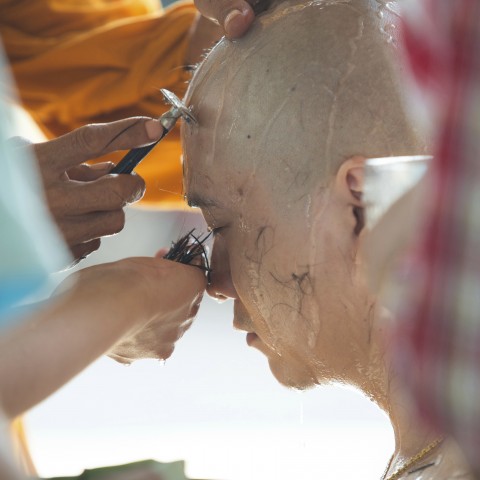




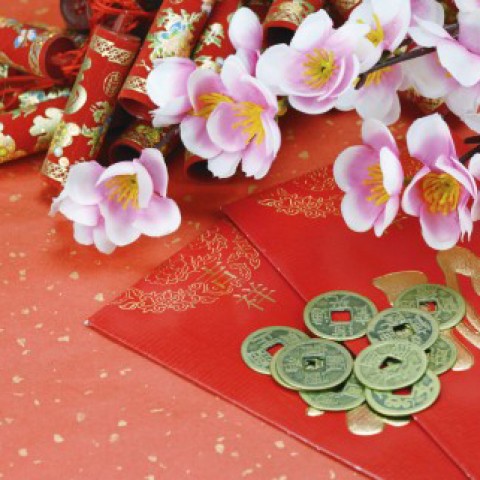
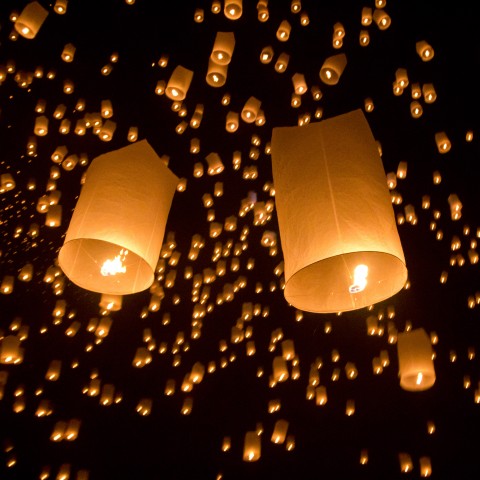



![How to ไหว้ [wâi]](https://wordlist.languagepod101.com/wordlist/media/25584&v=medium.jpg)

